The following is a historical compilation of posts from the ‘From the Minister’ category. The most recent is on the Home page.
Staying connected with Jesus
:max_bytes(150000):strip_icc():format(webp)/france-grapes-ready-for-harvest-545857681-57b053b53df78cd39ccfc740.jpg)
Grapes are a wonderfully versatile fruit. While being delicious eaten fresh, they form excellent dried fruit (think raisins, sultanas) and their juice forms the basis of many fine table and fortified wines. Grapevines are quite tough and will grow in a variety of climates from cool to warm and in different types of soils. It’s no surprise, then, that grapevines are planted widely across the world.
In the Hebrew Bible the vine is often used as a symbol for Israel (e.g. in Psalm 80). The prophets use the image to illustrate the faithlessness of Israel, showing how God took a vine from Egypt, planted and tended it, and came looking for good grapes yet found either no fruit or wild grapes. As a result, Israel will face God’s judgment.
In John’s Gospel, Jesus calls himself the true vine (John 15:1) who produces the sort of fruit that God seeks. His followers are the branches of the vine. So long as they remain connected to Jesus, the source of their life, they will be fruitful. But if they lose touch with Jesus and his ways, they will become worthless branches only useful for firewood.
While we may become anxious about how fruitful our lives are and how well we are holding onto Jesus, the comforting truth is that Jesus is holding strongly onto us at the same time. The fruit we produce – love, kindness, joy, generosity and so forth – develops as we trust in Jesus and in the presence of God’s Spirit at work in our lives. Grapes tend to come in bunches, so our fruit is more easily seen and appreciated as we work together. What sorts of delicious and satisfying fruit are you and your community producing?
Posted: Friday, April 26, 2024 by Peter Mallen Tags: John 15:1-8Easter surprise
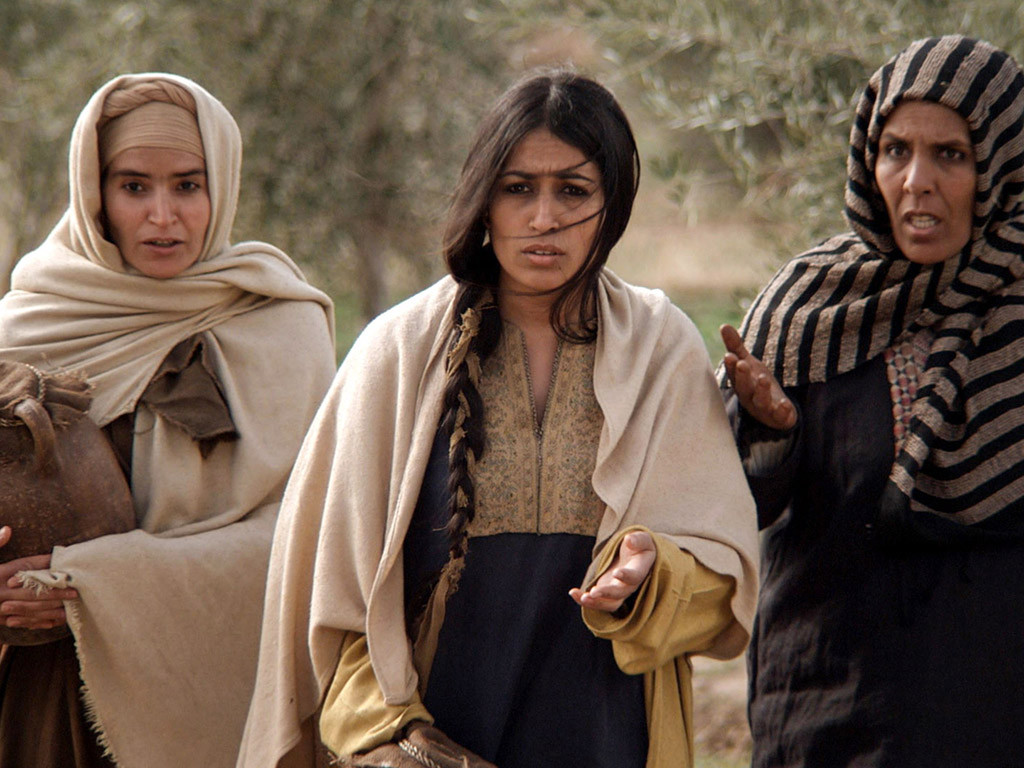
For many people, the defining part of Easter revolves around chocolate, whether in the form of hollow Easter eggs, filled Easter eggs, a chocolate bunny or a chocolate bilby. This year I even saw a giant chocolate platypus. No doubt Easter egg hunts with young children can be lots of fun. But it’s typical of our culture that the commercial side of Easter wins out so much over the Christian celebration of the resurrection of Jesus.
As an aside, decorating and eating (chicken) eggs has a long history in the Orthodox tradition and throughout Eastern Europe, with some legends ascribing the practice to Mary Magdalene. The egg is of course a symbol of new life. In 18th century Germany, liquid chocolate was placed into an eggshell to make the first solid chocolate egg. In the 19th century in England, chocolate makers Fry & Sons and soon after Cadbury made the first hollow chocolate eggs, with the empty hollow of the egg representing the empty tomb of Jesus.
The joyous Easter festivals and traditions that we enjoy are a far cry from the original Easter story as told in Mark’s Gospel. Mark tells how the women, who had witnessed the death and burial of Jesus, returned to the stone tomb early in the morning of the third day to anoint Jesus’ body with spices. This was part of Jewish burial custom, but there was no time to do this special task on the Friday when Jesus died.
Surprise awaits them. The large stone rolled across the entrance to the tomb had been rolled back and there was no body inside the tomb. Instead they meet a young man dressed in white (an angel?) who tells them that Jesus has risen and will meet them in Galilee just as he promised. They are to go and tell the other disciples the news. Mark writes that the women were astonished and bewildered and flee from the tomb in terror.
Our familiarity with the story often robs it of its unexpected surprise and shock. So I wonder what surprises you about the Easter story and how you might recapture some of its strangeness and yet also its deep felt joy that slowly emerges as the disciples encounter the risen Jesus for themselves.
Posted: Saturday, March 30, 2024 by Peter Mallen Tags:Thinking about the cross

It’s Easter time again. For many Australians that means it’s the opportunity to go away camping or to paint the house or enjoy an extra long weekend. While most people no doubt enjoy these extra days off, I wonder if they stop to think why they are declared as public holidays.
When British colonists arrived in Australia in the late 18th century, they brought their Christian faith and traditions with them. Over time, Christianity became the predominant religion in the colonies, and Christian holidays like Good Friday were established. It was and remains a solemn day marked by church services, the reading of the Passion narrative from the Bible and sometimes by processions. Many Christians participate in Good Friday services to reflect on the significance of Christ's death on the cross.
One common interpretation of the cross is that Jesus had to die to take away our sins and to save us from the wrath of God. This type of theology is taken primarily from the writings of the apostle Paul. Yet when we turn to the Gospel accounts, the four books attributed to Matthew, Mark, Luke and John that describe the life and death of Jesus, we find few mentions of Jesus needing to die to take away sin. Indeed, during his ministry Jesus often forgives people and invites them to start living in a new way. This forgiveness is not tied to the cross in any way but rather emphasises the compassion and love of Jesus who speaks and acts on behalf of God.
So when we think about the cross, perhaps we would do better to reflect on the love of God and the compassion of Jesus. The well-known verse from John’s Gospel provides an alternative way of thinking – that God so loved the world that he gave his only Son – Jesus – so that everyone who trusts in him may not die but rather have eternal life. The cross is crucial for our understanding of the depth and breadth of God’s love. It stands at the centre of our faith. It shows that love, suffering and forgiveness are all part of following in the footsteps of Jesus.
May God bless you with fresh understanding as you contemplate the cross on Good Friday.
Posted: Thursday, March 28, 2024 by Peter Mallen Tags: John 3:16, Mark 15Welcome to the Messiah
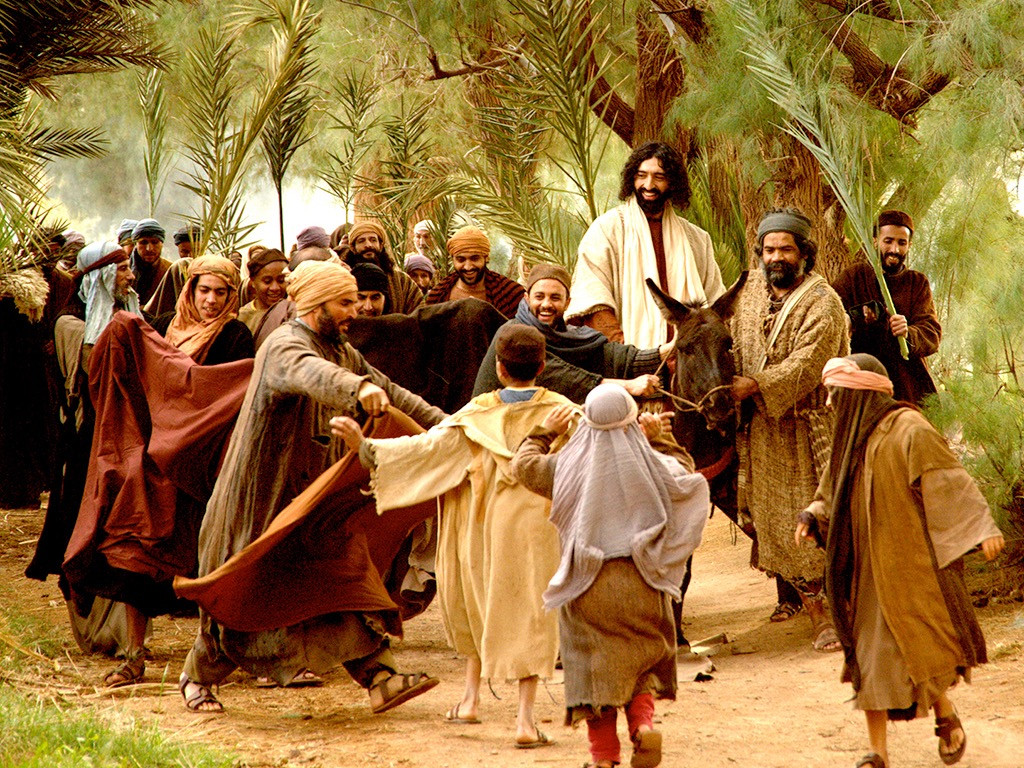
On first blush, this week’s Palm Sunday story is quite simple. Jesus and his ever growing band of disciples have been journeying from Galilee and have now reached Jerusalem in time for the Passover festival. Jesus procures a donkey and rides this into the city while his followers wave branches and shout enthusiastically ‘Hosanna! Blessed is the one who comes in the name of the Lord!’
On deeper reflection, it’s also an odd story. Jesus walks everywhere. It’s basically how people got around. Yet on this occasion he is at pains to ride an animal, and a donkey at that. Procurement of the donkey takes up more than half the episode, so was presumably unexpected and memorable. First time rider riding an animal that’s never been ridden before. What could possibly go wrong?!
It seems that it’s all quite deliberate. Jesus could have entered the city inconspicuously among the Passover crowds. This may have been the prudent and safe course of action. But Jesus seems intent on making a statement. That statement appears to be political, namely that he is coming as king, humble and riding on a donkey according to the prophecy of Zechariah 9:9. The crowd’s response is from Psalm 118, a song of people welcoming a victorious king into the city with shouts of Hosanna and blessing.
So Jesus chooses to enter the city provocatively as a king, as the long awaited and hoped for Messiah. Up until this point in Mark’s gospel, Jesus has been very careful to keep his identity under wraps, which is commonly referred to as the ‘messianic secret’ in Mark’s Gospel. But now he comes openly as the Messiah. Why the change in approach? Why stir up the crowd’s imagination when it’s clear that he is not the type of Messiah they were hoping for? But perhaps that’s the point. Jesus is in fact the Messiah and the events of the next week will show the type of Messiah that he is.
Posted: Friday, March 22, 2024 by Peter Mallen Tags: Mark 11:1-11The hour has come

Most of our lives are regulated by clock time – minutes, hours, days and years. In Greek this is called chronos time from which we derive the English word chronometer or watch. Whether it’s our daily routine or gathering for a meeting or attending an event, our lives usually follow chronos time.
But there is another sort of time. It’s when a mother knows that it’s time for her baby to be born. Or when it’s time to move out of your long term family home. Or when it’s time to retire from a much loved activity or responsibility. These are examples of kairos time in Greek, which might be translated as the right time, or the favourable time or the God given time.
In this week’s Gospel reading from John, Jesus declares that the hour has come for him to be glorified. God’s kairos moment has arrived when he will be lifted up from the earth – on a cross. For John, this is not a moment of shame or chance, but rather part of God’s plan for Jesus. It is the moment when he will draw all people to himself, the moment when he will be glorified and exalted, and bring his mission to fulfilment. In John’s gospel, Jesus faces this kairos moment with calm acceptance.
I wonder if you are facing any kairos moments in your life? Are there decisions or actions needed that will transform or turn your life in a new direction? As we face such moments, may we have wise people around us and know God’s peace in our hearts that however difficult the decision, the time is right and God will be with us.
Posted: Friday, March 15, 2024 by Peter Mallen Tags: John 12:20-33Come into the light
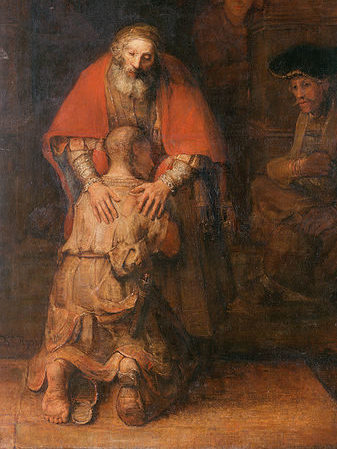
I wonder what your night vision is like. As I get older I find that it’s getting harder to navigate at night in my sport of orienteering. It’s always been challenging to run at night while following a map and trying not trip over unseen objects in the darkness. But I’m finding it harder, especially on moonless nights when kerbs and imperfections in the footpath are hard to see.
The Gospel writer John likes using the metaphors of light and darkness. Jesus is the light that is shining in the darkness and the darkness did not overcome this light (John 1:5). Yet as we travel through the season of Lent, we are reminded that there were plenty of obstacles to trip Jesus up from temptation to do things his own way to the misguided expectations of others, from those plotting evil against him to his growing popularity.
In this week’s passage from John, Jesus speaks about how he must be lifted up (on the cross) to bring life to people. Out of great love for the world, God sent Jesus for this very purpose. But not everyone wants to come into the light because it will reveal their evil actions and evil intent. They are afraid of the light revealing who they really are. So while Jesus brings God’s light and God’s life, many choose to remain in darkness.
I wonder if part of us is also afraid of coming into the light. Perhaps it’s why we find repentance and confession difficult. We convince ourselves that we are doing okay and that admitting our weaknesses and failures (our sin) before God will make us feel guilty or ashamed. Perhaps then we have misunderstood God’s love. God wants to bring us to healing and wholeness and to help us live fully in the light. God is ready to embrace us like the father figure in the parable of the prodigal son. It takes courage to step into the light and admit our need. But it’s also the way to find life, true and abundant life. What are we waiting for?
Posted: Friday, March 8, 2024 by Peter Mallen Tags: John 3:14-21Jesus gets mad
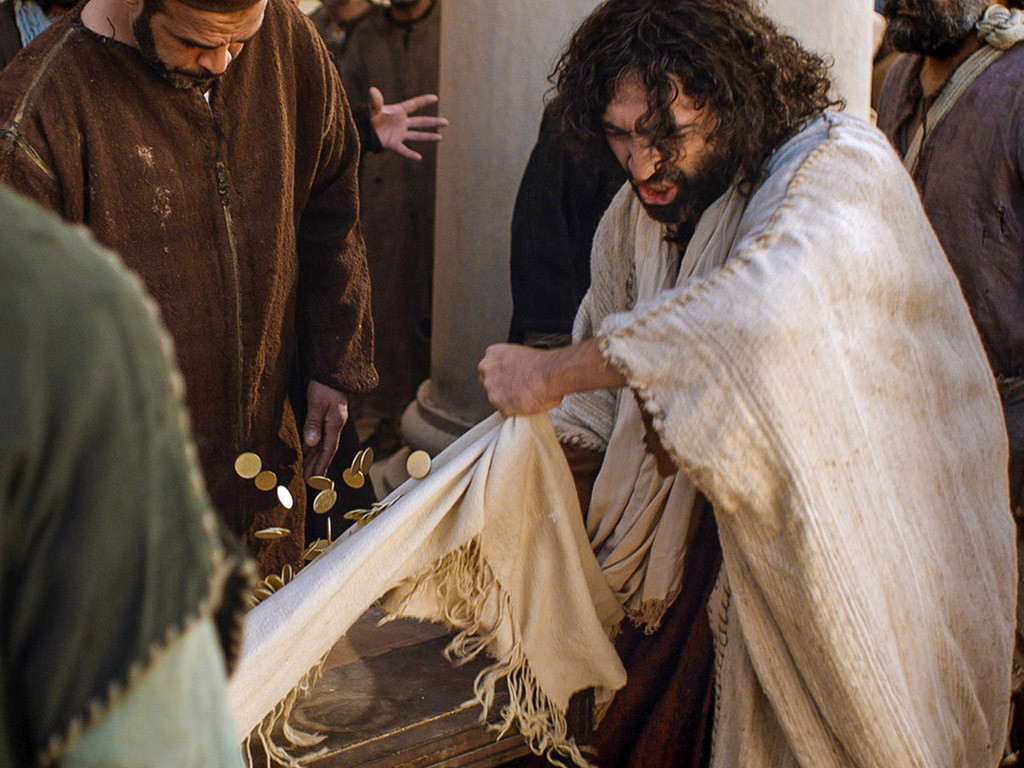
What gets your goat? What makes you angry? Perhaps it happens when one of your electronic devices refuses to co-operate and do what you want. Perhaps it’s when you hear politicians argue with each other rather than address the needs of ordinary people. Or perhaps it’s when the world watches on with apathy as countries are torn apart by war.
Usually Jesus is pretty controlled and cool. Yes he gets frustrated with the disciples who are sometimes slow to catch on, with the religious authorities who put protocol and procedures above people and their needs, and with the crowds who seek signs rather than being prepared to commit to following his ways. But one day when visiting the temple in Jerusalem, Jesus really lost his cool. The temple was the focal point of Jewish worship. It was the place people travelled to in order to pray and to meet with God. What got Jesus mad was seeing how commerce had entered and taken hold within the temple itself – with money changers and stalls selling animals.
Greed and commerce and quite possibly injustice were intruding on the worship of God. And so Jesus confronted the money changers and drove out the animal sellers. But the priests who were in charge of the temple were not impressed. Some of the Gospel writers suggest this action by Jesus was the straw that broke the proverbial camel’s back. After this incident, they actively look for ways to kill Jesus.
Jesus was clearly passionate about worship. Nothing was to distract or prevent people seeking to approach God to worship – whether commerce, religious rules or sickness. And so here in the temple, Jesus took a stand. What he did was controversial and personally costly. I wonder if we ever ‘lose it’ for Jesus? What aspects or expressions of our faith are we so passionate about that we will take a strong stand and be willing to bear the consequences? How can we help each other to have both wisdom and courage to confront greed and injustice?
Posted: Saturday, March 2, 2024 by Peter Mallen Tags: John 2:13-22Oxymoron: Jesus the suffering Messiah

An oxymoron consists of two contradictory words placed together to create a new and sometimes profound expression. Examples include deafening silence, open secret, virtual reality, seriously funny. You get the idea.
In this week’s passage from the Gospel of Mark, Jesus wants to know who the crowds think that he is. The quick poll of the disciples suggests that most people think Jesus is some sort of prophet, based on his teaching and healing ministry. Jesus then asks the question of the disciples who have spent much more time observing Jesus both in public and in private spaces. Peter, the spokesman for the disciples, suggests that Jesus is the Messiah (or Christos in Greek, both of which are shorthand for King).
Now the title Messiah carried certain expectations, which pointed to a super version of King David of old. Different Jewish groups had slightly different expectations, but generally the Messiah was hoped to be a victorious, military leader who would crush Israel’s enemies and also sort out the Temple in Jerusalem and usher in a period of lasting peace and justice. Jesus turns these expectations on their head, predicting instead that he will be rejected, will suffer and will die before mysteriously rising again. A suffering Messiah? That’s an oxymoron for Peter who rebukes Jesus for even having such thoughts.
While we have had nearly 2000 years to get our heads around the concept of a suffering Messiah, it was a big leap for the first followers of Jesus. What was also problematic was Jesus’ assertion that his followers must be prepared to walk a similar path of suffering. It’s equally problematic for us. We are quite happy to follow in the footsteps of a compassionate and loving Messiah, but a suffering Messiah who calls us to take up our cross and follow, that’s rather more extreme. What might it look like for your community?
Posted: Friday, February 23, 2024 by Peter Mallen Tags: Mark 8:27-38Jesus tested
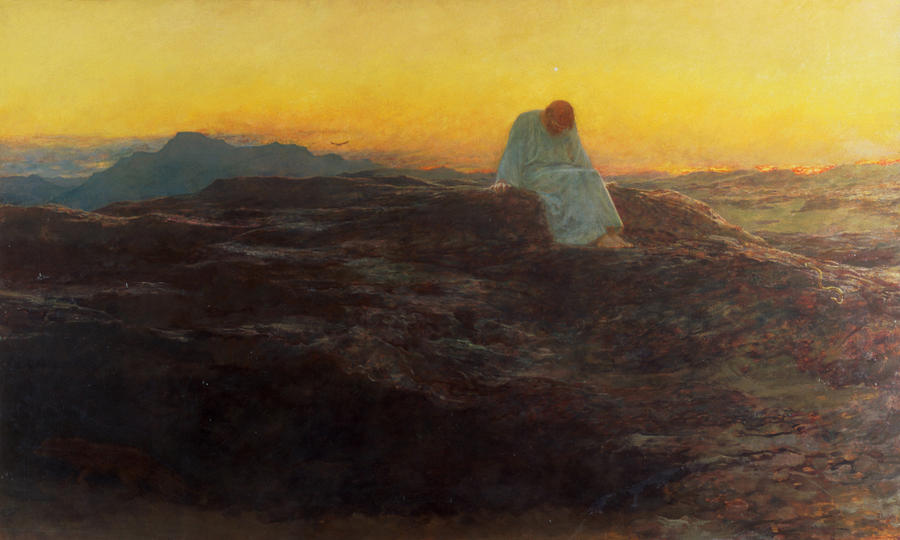
In The Lord of the Rings story, the one ring of power is clearly evil. In the first movie, there are several scenes where various characters are tested to see their response to taking the ring of power for themselves. Gandalf the wizard, Aragorn the long lost king and Galadriel the elf queen all ‘pass’ the test by refusing to take the ring. But Boromir the warrior from Gondor fails the test as he tries to seize the ring by force, with severe consequences.
In this first week of Lent, the gospel reading is always the testing or temptation of Jesus in the wilderness. He is being tested in a positive way by God’s Spirit to see if he will remain true to God’s ways. At the same time he is being tempted in a negative sense by Satan to choose a different and easier path. The key word can be translated as either test or tempt.
The tests or temptations that we face may not carry the same weight or consequences, but are just as real. Every day we are bombarded with advertising messages both blatant and subtle to buy this product or take up that limited offer. These tests ask us a subtle question over and over again, namely where do you get your worth and value from? Buying our product or service is your route to happiness and fulfilment! God’s promise that we are valued and loved for our own sake is often drowned out. We fall into the trap of building the kingdom of self rather than building the kingdom of God.
This issue is serious, though, which is why Jesus included the line in his model prayer ‘Do not lead us into temptation’ (traditional form of the prayer) or ‘Save us from the time of trial’ (modern form). It’s a prayer asking God to give us the strength and wisdom to resist the tests and temptations that come our way every day. Will we choose to follow God’s ways of loving others and seeking justice and mercy or will we follow the world’s ways of looking out for ourselves first and foremost?
Jesus transformed

This is Mount Tabor, the traditional setting for this week’s Gospel reading about Jesus being transformed. The story is quite unusual as Jesus’ appearance is suddenly changed and he appears to talk with Jewish heroes Elijah and Moses. The story is full of symbolism and echoes that evokes other significant encounters on mountain tops – experienced by people such as Moses and Elijah. God’s imminent presence in the story is signified by the cloud that covers the mountain, a voice that speaks from the cloud and the dazzling appearance of Jesus.
Three of the disciples – Peter, James and John – have front row seats to the unusual drama. They are blown away by what they see, hear and feel. They are astonished, confused and very frightened all at the same time. Yet it’s clear that the amazing sound and light show is primarily for their benefit. They hear that Jesus is God’s beloved Son and that they must listen to him.
So as we approach the season of Lent, what might we learn from this evocative story? Perhaps we need reminding that there is rather more to Jesus than we often imagine, that Jesus has connections with the spiritual realm and with God that are mostly hidden from our normal senses. And perhaps we might learn that our perceptions and thoughts about Jesus need to be transformed just as much as Jesus was transformed. Perhaps when Jesus says hard things like take up your cross and follow me (which comes in the immediately prior passage and which we return to in the second week of Lent) we need to listen and ponder afresh what it means to follow Jesus.
Posted: Friday, February 9, 2024 by Peter Mallen Tags: Mark 9:2-9Jesus the popular healer

Health matters are often in the news, whether it’s the latest push to get a Covid booster shot or statistics about bulk-billing rates or the threat of mosquito borne diseases after a wet and humid summer. Health issues also affect our friends and family, especially as we get older. For instance, there is rarely a week that goes by where my mother, who is now in her 90s, doesn’t have one or two medical appointments with frequent trips to the chemist. (A related question is whether modern medicine helps us to live better and more fulfilled lives or just longer lives?).
Health matters were also important during the time of Jesus. There were no GP clinics or hospitals or chemists dispensing drugs of course. But there were recognised places where one might go to seek healing and more than a few charlatans or magicians who claimed the ability to heal (usually for payment). Given this backdrop, it’s interesting that well over half the miracle stories recorded in the Gospel accounts are about healing, including in this week’s Gospel reading from Mark. They are usually reported in a simple matter-of-fact way with few details provided, yet their frequency in the Gospels suggest that Jesus was known to be a healer, that this greatly enhanced his popularity and that his direct hand-on approach was viewed as somewhat unique.
We may have all sorts of questions that arise in relation to such healing stories (e.g. Did Jesus really heal such large numbers of people? How? Was this ability unique to Jesus or is it available today?). The Gospel accounts don’t answer these questions directly, but rather are written to suggest that these instances of healing demonstrated Jesus’ authority over sickness, showed Jesus’ compassion for people and stirred up controversy, especially when healings took place on the Sabbath day.
With our modern health system, we may be tempted to gloss over the significance of Jesus’ healing ministry, but its prominence points us towards the character of God present in and through Jesus – compassion, care, and desire for wholeness and restoration. May these same characteristics shine through our service and witness in the community.
Posted: Friday, February 2, 2024 by Peter Mallen Tags: Mark 1:29-39Celebrating Australia Day

Headlines in the media this week have featured a range of perspectives on modern Australia. A typically summer headline is that Queensland is bracing for the arrival and impact of tropical cyclone Kirrily. Meanwhile the main political headlines have been about changes to Stage 3 tax cuts and whether a fairer distribution is more to be welcomed than a broken election promise. And in sport there have been headlines about Australian cricketers daring to have a view on 26th January as the most appropriate day to celebrate Australia Day. Which begs the question as to whether and why this date should mark our national day when it has long been observed as a day of mourning for Indigenous people rather than a day to celebrate.
So what are we really celebrating on this day? A common suggestion is that we are simply relishing the opportunity for a long weekend at the end of the summer holidays before the year proper starts. A more reflective response might be that we are celebrating that Australia is a modern, multicultural, prosperous and peaceful nation where we welcome everyone – whether immigrants or refugees – from all around the world. This suggestion is partly true and partly myth, as our treatment of Indigenous people and asylum seekers has often been shameful and cruel. Another suggestion, often overlooked in the debate about the date, is that we are celebrating being home to the oldest living cultures on the planet in our Indigenous peoples and there is much to be learned from their resilience, wisdom and connection with country.
But even as we pause to celebrate Australia Day, we are reminded that Australia is in the main a highly secular country and the influence and presence of Christian faith is steadily declining. Our challenge as followers of Jesus is not so much to focus on how we might survive or find new relevance in modern Australia, but to remain faithful to Jesus’ call to love God and love our neighbour (Mark 12:28-34). As we do this we will contribute to and build a more just and compassionate nation whose place in the world is worth celebrating.
Posted: Friday, January 26, 2024 by Peter Mallen Tags: Mark 12:28-34Hanging onto hope in times of disappointment and setback

For those who seek and advocate for justice and peace, the last year has been quite challenging. We have seen the war of attrition in Ukraine grind on. We have seen atrocities committed by both sides in the Israel-Gaza war. We have seen the climate emergency worsen while delegates at the latest COP meeting fail to agree any meaningful measures to reduce fossil fuel emissions. And back home in Australia, the referendum to give Indigenous people a Voice to our Federal Parliament was soundly defeated.
Justice often seems to be in retreat and destruction and violence seem to be everywhere. These are not new observations unfortunately. This was the exact same complaint that the prophet Habakkuk wrote about, questioning why God allowed such injustice to prevail. Or perhaps it is like Paul describes in Romans that the whole of creation is groaning, waiting to be released.
How are we to continue seeking justice without giving up or falling into depression?
We need to remind ourselves that when all seems like doom and gloom, God calls us to hang onto hope, even when we can’t see it distinctly. It was this imaginative sort of hope that Isaiah gave to the exiles in Babylon that God had not forgotten them. It was this same hope that helped Mary envision a world turned upside down. It was this hope that was given startling new form in the resurrection of Jesus when all hope seemed to have died.
And we are called to pray. This can be hard when we see no change or things getting worse. But when we don’t know how or what to pray, Paul reminds us that God’s Spirit intercedes for us with groans too deep for words. So we pray for God to act.
We also pray that God would give us the courage and perseverance to continue the struggle for justice, just as God inspired people like William Wilberforce and Martin Luther King Jr to keep going in the face of seemingly intransigent opposition, for God’s justice will eventually prevail.
Posted: Friday, January 19, 2024 by Peter Mallen Tags: Habakkuk 1:1-4, Romans 8:19-27Had any epiphanies lately?

An epiphany is a sudden revelation or thought. There may well have been a gradual build-up beforehand, but suddenly you have a ‘Eureka!’ moment when a new thought becomes suddenly clear to you. It may be about your job, or about a problem that’s been baffling you or perhaps about your sexual orientation or gender identity.
Having had this epiphany, you now need to decide what you will do about it and who you will tell. There may be a significant cost in doing this and you may be misunderstood or rejected. But you may also be pleasantly surprised, find support from unexpected sources and have a deep sense of peace about taking a new direction in life.
In the church, Epiphany is both an event and a season in the calendar. As an event it refers to the wise men from the East (Magi) visiting Jesus and offering him exotic gifts. Their epiphany was linking a new sign in the sky (a comet?) with the birth of a new king, who turns out to be Jesus. It is also a revelation that foreigners should recognise and seek to worship a Jewish boy born to be king.
As a season in the church calendar, Epiphany follows the season of Christmas and is the period where Jesus appears to the world as both the Son of God (revealed at his baptism) and the hoped for Messiah (King) of Israel, as revealed at the start of John’s Gospel. How Jesus himself recognised and responded to these epiphanies is never really shared in the Scriptures, but we might imagine that they caused a range of emotions. These revelations also led many to misunderstand or reject Jesus.
So I wonder whether you’ve had any epiphanies lately, whether about your personal life or who this person Jesus may be as we’ve travelled through the Christmas season and beyond. What will you do differently now as a result? Who will you tell?
Posted: Friday, January 12, 2024 by Peter Mallen Tags: John 1:35-51, Matt 2:1-12Epiphany at Croydon Uniting Church, January 2024.

Our banners and decorations at Croydon Uniting have recently been updated to reflect the start of Epiphany in the church calendar.
This week we warmly welcome back our Minister of the Word, Rev Dr Peter Mallen after his long service leave, and look forward to him leading our congregation again. On Sunday 14th Jan, Peter will lead the service from Croydon North Uniting (Zoomed to Croydon Uniting). On Sunday 21st Jan, Peter will lead the service at Croydon Uniting.
All are welcome to join us at 10 am on Sundays for our worship services, followed by morning tea with our friendly congregation.
Join us for Worship at Croydon Uniting Church, 10 am Sundays.
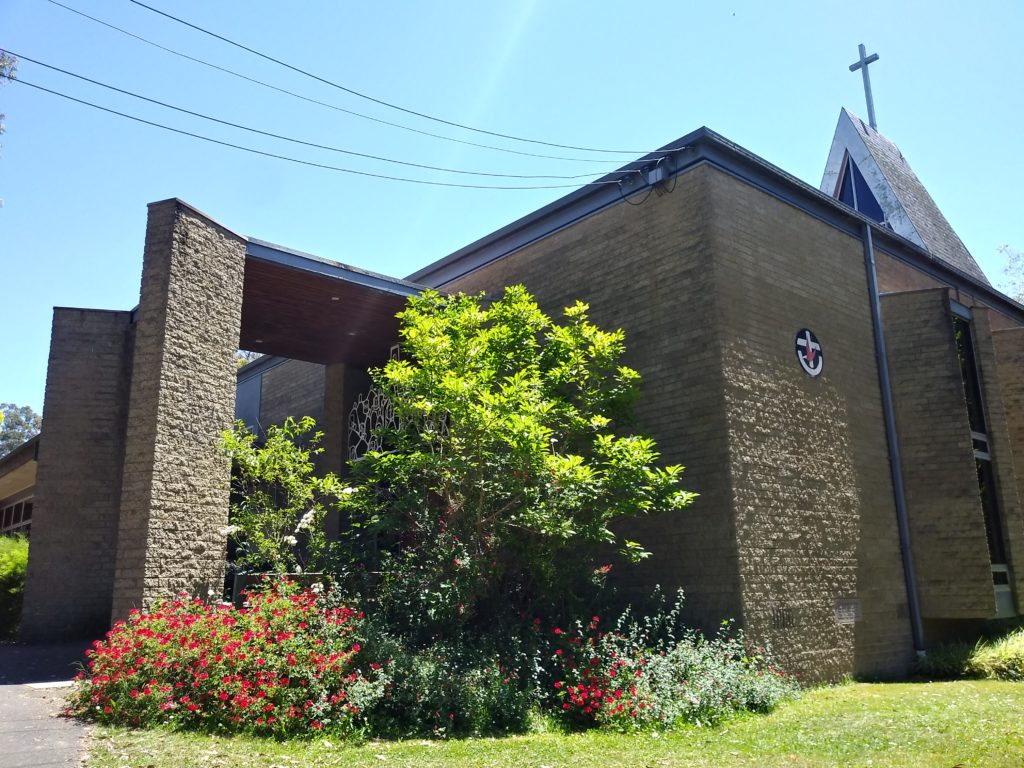
Celebrate Christmas at Croydon Uniting Church

How to live a full and peaceful life

There is a lot happening in the world at the moment that can make us worried and anxious, whether here in Australia or overseas or in our local neighbourhood. You only have to tune in to the news to know that our world is in great need of peace, compassion and justice.
In the final chapter of his letter to the church in Philippi, Paul offers several pieces of wise advice on how to deal with our anxieties and worries. The remedy according to Paul has several strands that when woven together will keep us strong, both mentally and spiritually. While we tend to read this advice in an individual way, it is actually addressed to the whole community as steps they can take together.
The first strand is to stand firm in the face of difficulties and challenges, relying on the faithfulness of God who will bring to completion the good work that God’s Spirit is already doing in our midst. The next strand is to be united, to share the same mindset of Christ and the same hope, focusing on what we share in common rather than on what divides us. Then we are called to rejoice, to lift our praise to God that will help shift our attention from things we cannot control to the one who gives us strength and endurance. The final strand is to name our concerns before God in prayer, remembering to be thankful for the many blessings we have.
These suggestions are not like a magic wand that will automatically fix all our problems and difficulties. Rather they will give us a renewed and godly perspective that will give us peace in our hearts and our minds, peace that comes from God. Then we will be strengthened in whatever circumstances we face, not relying on our own strength, but rather relying on the strength that comes from Christ and from God’s Spirit.
Posted: Friday, October 20, 2023 by Peter Mallen Tags: Philippians 4:1-13Priorities

We all have priorities in life, whether we fully recognise them or not. We may have a priority in keeping fit, for instance. Whether this is really true will be shown by how many hours in the week we spend on activities to keep us fit. Or we may have a priority to reduce our carbon footprint on the earth. Again, whether this is really a priority will be shown by what we are prepared to give up to make this happen (e.g. stop eating red meat, no more plane flights, steadily reducing and replacing our use of fossil fuels like petrol and gas).
Doing an audit of how we spend our time and how we spend our money will reveal our true priorities … and we may be surprised or disappointed with the results. Scrolling through social media or watching Netflix might actually turn out to be our priorities.
Whether you love or struggle with the writings of the apostle Paul, his letters give insight into his priorities, none more so than in chapter 3 of his letter to the church in Philippi. Raised as a faithful and zealous Pharisee, Paul’s priorities focused on keeping of the Jewish Law. But after encountering the risen Christ, Paul’s priorities changed completely. The things he valued previously he now regards as worthless – garbage – compared with the greatness of knowing Jesus.
Paul is very clear that he will put aside those parts of his life that don’t contribute to this goal of knowing Jesus Christ. Instead he will focus all his energies and abilities on furthering his relationship with Jesus and helping others also come to know Jesus. He compares himself to a runner in a race who has their eyes focused on what lies ahead.
Perhaps you find Paul’s priorities and passions rather intense and even intimidating. Perhaps Paul didn’t have a regular job to take up his time or a family to look after. But perhaps Paul grasped – or had been grasped by – a person so attractive that this reset his priorities. What would it take for us to be grasped in a similar way? And how would this change our priorities?
Posted: Friday, October 13, 2023 by Peter Mallen Tags: Philippians 3:4b-16God’s promise to do a new thing

Just this week there is a major meeting of the UN to discuss progress in limiting carbon emissions and also to update progress on the Sustainable Development Goals (SDGs). There is not much good news to report. Cuts to global emissions are happening too slowly to limit warming to the 1.5 degC target of the 2015 Paris Agreement. Already in July and August of this year this threshold was crossed, with 2023 destined to be the hottest year in recorded history. Fossil fuel usage needs to be phased out urgently but is beholden to powerful market forces.
How are we doing as a global community in providing justice to the poorest as set out in the 2015 SDGs? Again, not well. Of the 170 targets grouped under 17 key areas (e.g. poverty, hunger, access to education, affordable clean energy), only 15% are on track to be met by 2030. Partly this shortfall is caused by the Covid pandemic and more recently the ongoing war in Ukraine. Both of these crises indicate, however, that the wealthy nations of the world can work together and can find the money to fund major challenges if these pose a threat to their own people or way of life. Sadly, the needs of the poorest people don’t generate the same urgency or generosity of response.
The reading in Isaiah 43 was written at a similarly bleak time in history for the people of Israel. They were living in exile in Babylon with no real hope of any change to their situation. Wealthy and powerful nations were firmly in charge and had no mind to help the poor Israelites. Into this gloom the prophet speaks a word of hope, that God is not oblivious to their suffering and will soon do something new and unexpected. God will open a new path for the people to return home to Jerusalem and will make rivers flow in the desert.
Such a bold and subversive pronouncement is part of what OT scholar Walter Brueggemann calls the prophetic imagination – looking at the world in a new way with current constraints removed. How our world needs a similarly bold imagination! There are selfish vested interests, of course, that want the status quo maintained – so that they can continue to hold onto their power and wealth. But the way of God offers a surprising challenge to the status quo. New ways of thinking and new priorities are possible if people have the courage and will to make it happen.
Posted: Friday, September 22, 2023 by Peter Mallen Tags: Isaiah 43:16-21God’s river of life

Rivers and creeks are a vital part of the landscape, bringing a source of fresh water to places downstream. They provide an environment for fish, reptiles, insects and plants to thrive and provide water for animals, birds and people to drink. They can also be places of great beauty and peace.
In the book of Ezekiel, the prophet has a vision of a river that starts under the altar of the Temple and flows east out of Jerusalem and down towards the Dead Sea. This river brings life wherever it flows, even to the Dead Sea. It swarms with fish and its banks are lined with fruit trees whose fruit is for eating and whose leaves are for healing. This river is closely associated with the presence of God, which brings life to both humans and the natural world.
When we think of the rivers and creeks near to where we live, I wonder if we pause to see the many forms of life they bring to the environment. And I wonder about God’s river, flowing where it will in the world, bringing life and healing in a different way.
Posted: Friday, September 15, 2023 by Peter Mallen Tags: Ezekiel 47:1-12A vision of peace

As we look at the world in 2023, we may find it hard to see signs of peace, that state of harmony and wholeness where people and the rest of creation are in right relationship with each other. Devastating wars continue in Ukraine and Sudan and Myanmar and in other places that we don’t hear about. Our climate is getting hotter all the time, with July being the hottest month since records began. We’ve seen intense wildfires in Europe and North America. Closer to home, many Australians are struggling to pay their mortgage or rent as well as feed their families, causing stress and anxiety. Peace seems far away.
Yet Psalm 85 assures us that despite our current problems, God is still faithful and trustworthy and will bring peace to the earth. How this will happen we are not told – just that God’s character of loving kindness, faithfulness and righteousness will result in peace. The psalm is a prayer of trust in God to act in line with God’s character. It’s similar to the line in the Lord’s Prayer that goes ‘May your will be done on earth as in heaven’. God’s will is to bring peace and righteousness. But for this vision of peace to become a reality, we need to do more than simply trust in God’s goodness and love. We need to walk in God’s ways of faithfulness and righteousness, which includes seeking justice for the poor and actively caring for the environment. As we do this more and more we may be surprised to find ourselves overtaken by peace.
Posted: Friday, September 8, 2023 by Peter Mallen Tags: Psalm 85A call to justice

It’s springtime in Australia and time to celebrate the Season of creation in the church!
The symbol or logo for this year’s celebration is a river flanked by two mountains with a bird flying overhead. The bird represents a dove of peace I presume, but the rest of the image tells a powerful if unintended story. It may of course simply be two images of a river, one reflecting the scene in the midday sun (the blue side) and the other reflecting the scene at sunset (the orange side).
But given the state of the planet this year, with 2023 so far being the hottest year ever on record, it’s hard not to see the right hand side as the world burning and being coloured by bushfire smoke giving that familiar orange haze. Indeed there have been horrendous wildfires this year in Canada, Europe and in Hawaii of all places. Meanwhile fossil fuel companies continue to make record profits.
In the book of Amos, the prophet rails against the wealthy trampling the heads of the poor into the dust. Amos warns them that God despises their empty worship when they fail to live justly and share the resources of the land equitably. A similar pattern of greed and corruption is easy to see in our world with the poor suffering the worst effects of climate change while rich Western companies and governments rake in huge profits and taxes from fossil fuel production, leaving the world to burn.
The rising cost of living is hurting many people in our society, but is crippling the poor in places from Africa to Asia to the Pacific. We need to change our ways and let justice and peace flow.
Posted: Saturday, September 2, 2023 by Peter Mallen Tags: Amos 5:21-24Strength in vulnerability

For the past three weeks we have been exploring some of the mental health challenges that many of us and our loved ones face. We noted, for instance, that mental illness can affect anyone of any age. It is not a sign of failure or being a lesser person, nor is it a punishment from God.
Fortunately, there are a range of mental health professionals who can help and a variety of medications that can help alleviate the symptoms, although these often cause unwelcome side-effects.
But what of our spiritual tradition? Is there any wisdom or insight that might add to these other helps? We have drawn on several passages from Paul’s second letter to the Corinthians. In this letter, Paul describes his many physical and mental challenges, including his daily anxiety for all the churches he has founded (2 Cor 11:28). He embraces weakness and afflictions for these allow the grace and strength of God to be more clearly seen in his life (2 Cor 12:9). He further suggests that it is these very frailties and vulnerabilities – the cracks in our lives – that allow the treasure of the gospel message to shine through (2 Cor 4:7).
There are many activities and approaches that can help us maintain our mental well-being. These include time spent in nature, listening to music, having a pet and joining in community. In their different ways, each of these activities points us back to the unconditional yet mysterious love of God and the call of God to love ourselves and to love our neighbour. Many mental health challenges cannot be ‘cured’ but the love and support of a godly community can life make life more bearable.
Posted: Friday, July 14, 2023 by Peter Mallen Tags: 2 Corinthians 11:28, 2 Corinthians 12:9, 2 Corinthians 4:7For our Elders
:format():fill())
The first week in July has been celebrated as NAIDOC week since 1975. NAIDOC stands for National Aborigines and Islanders Day Observance Committee and has its roots in the 1938 call for Indigenous people to gather for a day of mourning (while the rest of Australia celebrated 150 years of European settlement). In recent decades, the focus in NAIDOC week has changed from mourning to recognition and celebration of Indigenous culture and achievements.
The theme for NAIDOC week this year is ‘For our Elders’. It’s interesting to reflect on the standing of Elders within the Indigenous community. Both men and women Elders are seen as leaders of their communities, as trailblazers in the fight for justice, as custodians of the stories and songlines, as teachers of culture and tradition. Elders are highly honoured and respected.
When non-Indigenous people offer an Acknowledgment of Country at the start of an event or worship service, this usually includes paying respect to Indigenous Elders – past, present and emerging. In this way, non-Indigenous people are following the example of Indigenous people in honouring their Elders (at least in words).
Yet when it comes to our own elders, non-Indigenous people are often less respectful, seeing their elders as mostly irrelevant to wider society and not as holders of wisdom (with some exceptions of course). I wonder why this is. Perhaps older people are seen as less productive – yet their days are often filled with volunteering, which is essential in the running of our society. Perhaps older people are seen as out of the loop when it comes to technology – yet the most influential Twitter user (until being banned from the platform) was former US President Donald Trump.
Indigenous culture has something important to teach us here. Our elders learned much wisdom during their lifetimes and learned valuable lessons that they can pass on to us – if only we take time to sit and listen and give them the respect they deserve.
Posted: Saturday, July 8, 2023 by Peter Mallen Tags: Proverbs 23:22God calls unlikely people
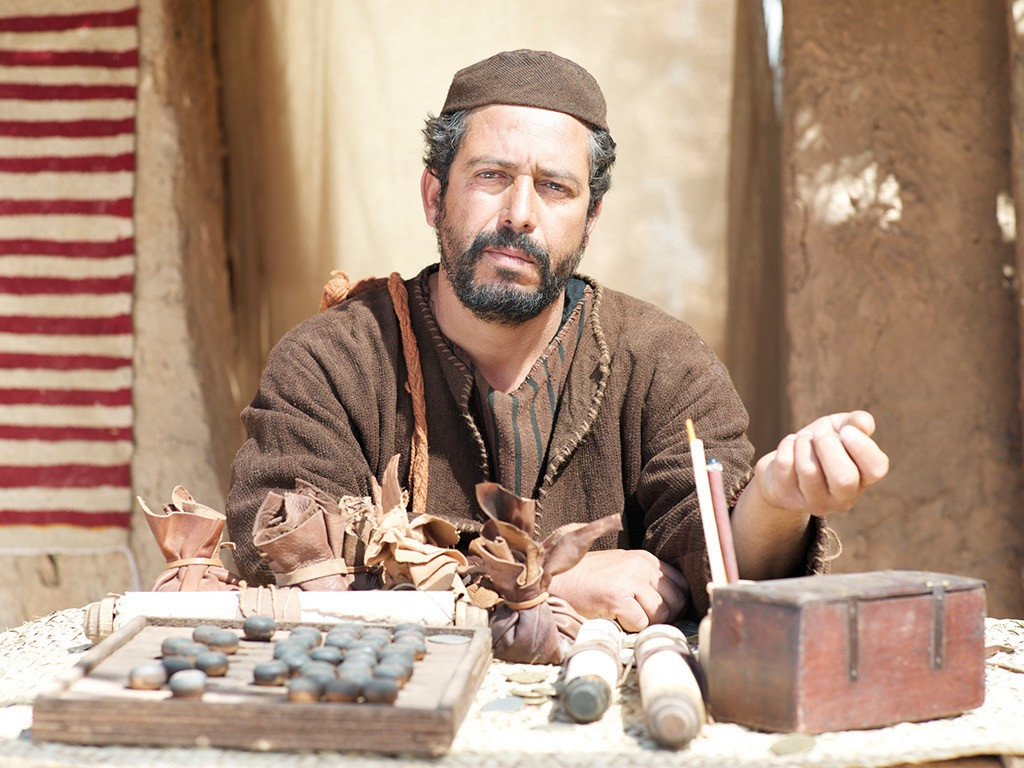
This week we hear about the time when Jesus called the tax collector, Matthew, the ascribed author of the Gospel that bears his name, to follow him. This call is described only very briefly. Jesus sees Matthew sitting at his tax collection booth, calls him to follow and Matthew gets up and follows. All I can say is that Jesus must have been very persuasive or Matthew was getting bored with collecting taxes on behalf of the Romans.
Before heading off on the road with Jesus and the other disciples, Matthew hosts a big dinner party for his fellow tax collectors at which Jesus is present. Some Pharisees, the constant critics of Jesus, observe this and question why Jesus, supposedly a person who speaks for God, would pollute himself by joining such a group of ‘sinners’ (today we might call them a bunch of corrupt fat cats).
Jesus’ response is instructive. People who are well don’t need a doctor. It’s the sick who need a doctor. The implication is that law-abiding decent folk like the Pharisees don’t need someone to come and show them how to live. But folk like Matthew and his friends have become greedy and corrupt and have lost sight of God’s ways. It’s these sorts of people that Jesus is attracted to.
If we had been in Jesus’ shoes, perhaps we would have chosen more promising and talented people to make up our travelling community. But Jesus chose unlikely and ordinary people – simple fishermen, a tax collector like Matthew, anti-government zealots – as well as a few strong women. He saw potential and hidden talents in them. For their part, it took a mix of curiosity, courage and trust to set out with Jesus. And although they were ordinary people, God did extraordinary things through them.
I wonder what extraordinary things God can do through you?
Posted: Friday, June 9, 2023 by Peter Mallen Tags: Matthew 9:9-13Reconciliation – a long slow walk

27 May – 3 June is National Reconciliation Week in Australia. This is a week that calls for all Australians to learn about shared histories, cultures and achievements, and to explore how we can all contribute to achieving reconciliation in Australia.
The significance of the first date is that 27 May marks the anniversary of the 1967 referendum when indigenous Australians were first officially counted as citizens of this country. 3 June marks the anniversary of the High Court Mabo decision that ruled that indigenous people had indeed lived and productively used the land (well) before the European colonisers came, thus overturning the fallacy of this country being terra nullius (empty land).
The theme for National Reconciliation Week this year is Be a Voice for Generations. This has an obvious link to the referendum later this year to include a permanent indigenous Voice to Parliament in the Australian Constitution. If passed, this Voice will have an effect for generations to come. It is also a call to use our voices to have conversations about the referendum and its implications for reconciliation – whether to take a step forward together or reject the proposal and create further division.
In the closing words of the Uluru statement from the Heart that was the impetus for the Voice to Parliament … “In 1967 we were counted, in 2017 we seek to be heard. We leave base camp and start our trek across this vast country. We invite you to walk with us in a movement of the Australian people for a better future.”
This is a gracious invitation to continue the long journey of reconciliation. Are you ready and willing to take this step? If not, what is really holding you back?
Posted: Friday, June 2, 2023 by Peter Mallen Tags: 2 Cor 5:17-20, Ephesians 2:11-18The Spirit at Pentecost – bringing peace or disturbing the peace?

The Christian festival of Pentecost is one of the three great festivals celebrated by the church each year, alongside Christmas and Easter. It tells the story of God’s Spirit being poured out on Jesus’ followers and how this experience and its aftermath was decisive in forming the new movement that we know today as the church.
God’s Spirit is imagined in different ways in the Bible. In the first reference – in the opening verses of the very first book of Genesis – the Spirit is the wind or breath of God moving over the waters. If we fast forward to the start of Jesus’ ministry, the Spirit descends on Jesus at his baptism in the form of a dove. In the Gospel of John, Jesus speaks of the coming Spirit as the Advocate or Helper, the presence of God drawing alongside God’s people to bring comfort. At Pentecost, the outpouring of God’s Spirit is marked by wind and fire and the immediate response of God’s people to praise God in various languages.
So it is hard to tie down the Spirit to a single image or role, which is not really very surprising, as the Spirit is the essence and presence of God alive and at work in the world, even before creation.
An interesting question to consider is whether the Spirit’s role is more to provide peace and comfort (as suggested in the Gospel of John) or whether to disturb the peace (as suggested in the story of Pentecost). Most of us would probably prefer the option of bringing peace, yet often in the Bible the Spirit seems to do the opposite, stirring up people to speak or act for God.
May God’s Spirit move among us afresh today, bringing peace where there is conflict and suffering but also disturbing the peace where we have grown too comfortable with the status quo. Come, Holy Spirit, to bring life and hope!
Posted: Saturday, May 27, 2023 by Peter Mallen Tags: Acts 2:1-47Jesus and prayer

Prayer is often seen as a key part of our walk of faith. At its simplest, prayer is talking with and listening to God. Yet for many Christians, prayer remains a source of guilt and anxiety. We feel that we should pray more, or pray better, or pray more effectively. Some people view prayer as largely a waste of time that serves no practical purpose in the world. Despite these doubts, prayer remains a core element of Christian practice the world over and a source of blessing and encouragement.
Jesus completes his farewell teaching to the disciples by praying what is often called the High Priestly Prayer. In this prayer he prays for himself in the light of his impending death on the cross, for the disciples and for the later church (those who will come to believe based on the witness of the disciples). The prayer includes many of the key themes of John’s Gospel – glory, eternal life, faith, truth, Jesus’ origins and relationship with God. It also looks ahead to the time of the church as Jesus prays that his followers would be protected from evil, would be united in heart and purpose and would know the love and joy that comes from God as they witness to Jesus.
As humans, our life depends on breathing. We breathe in and we breathe out from the moment we are born until our dying breath. If our actions of compassion and service and witness in the world are how we breathe out spiritually, then prayer and worship are key parts of how we breathe in spiritually. It is through prayer that we are refreshed, encouraged, unburdened and remain connected with God.
There is no one right way to pray, or place to pray, or time to pray. Try to find a way, a time and a place that works for you and don’t be afraid to change it around occasionally. Listen out for God’s whisper in your heart that you are indeed a precious child of God and deeply loved by God. As you listen and talk, prepare to be surprised where prayer may take you.
Posted: Friday, May 19, 2023 by Peter Mallen Tags: John 17:1-24We remember mothers and their love

This Sunday is celebrated as Mother’s Day in Australia. It provides an opportunity for children to make their mother breakfast-in-bed, to give a bunch of flowers and a ready excuse for a family get together. There is of course also the commercial pressure to buy Mum this or that gift that she may or may not really want.
The odd thing about Mother’s Day is that we set aside just a single day to pause and remember all the amazing things that mothers do each and every day of the year … nurturing, caring, catering, managing, encouraging, helping, sharing common sense. And that’s not to mention that each of us only came to be born into this world through the painful labour of childbirth endured by our mothers.
It’s interesting that when Jesus is wanting to share the news about how his impending death will affect the disciples, he uses the illustration of childbirth. They will feel great pain – just as a mother feels great pain during labour. But just as the pain turns to joy for a mother when her child is born, so the disciples’ pain will turn to joy when they see Jesus alive again after the resurrection.
These pangs of childbirth are what it will take to bring Jesus’ vision for new life fully into being … a vision where every person is welcomed with respect and dignity, where loving and serving one another irrespective of our status or gender or background are the norm, where suspicion and animosity are replaced by kindness and acceptance. Wouldn’t it be great if this vision was lived out not just on a day like Mother’s Day but every day.
Posted: Friday, May 12, 2023 by Peter Mallen Tags: John 16:16-22Staying connected with Jesus

In our digital age, connections are all important, whether it’s the level of bars on our phone reception or the performance of our nbn connection. Problems arise when the connection is weak or broken. Just this week I was trying to set my Mum up with a new bank account and was trying to fill in all the details required at a computer at the bank. Despite trying several times, the internet connection kept dropping out so that I had to go back to the start of the form each time. We then tried a different computer with a better connection and it all worked okay.
Chapter 15 in John is all about connections, especially our connection with Jesus and through Jesus to God. John uses the metaphor of a grapevine, with Jesus claiming himself to be the vine, God as the gardener and followers of Jesus as the branches. The purpose of a grapevine is to grow and produce grapes of course with all these elements staying connected and working together. In a spiritual sense, we must stay connected with Jesus if we are to produce fruit in our lives.
How does this happen? Jesus teaches that his words and his ways must remain in us, especially the command to love one another. We are called to follow the example Jesus set of washing his disciples’ feet at the Last Supper and later his willingness to lay down his life on the cross for the sake of his friends.
This is hard teaching that may make us anxious about how we will in fact remain connected with Jesus through all the ups and downs and trials of life. The good news is that Jesus is wanting to hold on to us, through the gift of God’s Spirit, just as much as we want to hold onto Jesus. So we do not have to strive or be anxious, but rather live into the relationship that Jesus makes possible.
Posted: Saturday, May 6, 2023 by Peter Mallen Tags: John 15:1-27Life after Jesus

We sometimes think that living as a Christian in a secular culture like Australia is quite difficult. The church has been pushed to the margins of our society, has a shrinking and often older cohort of members and is regarded with suspicion or hostility by many people due to past failures (e.g. abuse of children that was then covered up). All of this is true, yet it doesn’t paint the whole picture. Compared to other parts of the world, we live in a relatively tolerant culture that doesn’t actively persecute Christians nor stop us gathering for worship.
Most students of history would suggest that the emerging Christian church had a much tougher position than ourselves, awkwardly caught between a hostile Jewish community and a polytheistic pagan culture. They were also a relatively tiny group and now without their charismatic leader. If they were to survive and indeed to thrive, they would need a clear understanding of their mission and approach. The long teaching section in John’s Gospel in chapters 14-17 offers guidance for the time after Jesus.
Two early themes that stand out from these chapters are the call to continue Jesus’ ministry and the promise of God’s Spirit to help and guide them. These provided clarity of purpose and hope in the present and for the future. Whenever we become despondent about our future or weighed down by our secular culture, we would do well to reflect on the call to us to continue the ministry of Jesus and the promise of God’s Spirit to be with us and to encourage us.
Posted: Tuesday, May 2, 2023 by Peter Mallen Tags: John 14:1-27Starting over

The final chapter in John’s Gospel feels quite ordinary compared to its grand opening chapter that spoke of the Word of God becoming flesh and dwelling among us bringing light and life. In the final chapter we have a story about fishing and sharing a BBQ on the beach and a conversation between Jesus and Peter. It’s rather laid back and relaxed, though not for Peter.
The presence of Jesus sitting by a fire surely brings back for Peter bitter memories of the last time he sat round a fire and denied even knowing Jesus three times over. Peter is probably feeling embarrassed, ashamed and so disappointed in himself. Rather than rebuke him for his failures, Jesus asks Peter three times if he loves him, to which Peter replies you know that I love you. Jesus then commissions Peter to carry on the mission of the Good Shepherd by feeding the flock, namely the emerging church community.
Failure and disappointment are met with grace, forgiveness and healing. Jesus gently restores Peter and helps him to start over. I wonder if there are relationships in your life or in your community that need a similar word of grace to help them start over.
Posted: Friday, April 21, 2023 by Peter Mallen Tags: John 21:1-25A new day dawning – light overcomes the darkness

The Easter story begins in darkness in John’s Gospel as Mary Magdalene goes to the tomb. We’re not told why she is there, but can guess it was to be alone to grieve. A number of surprises await her. The first is that the large stone used to seal up such a tomb had been removed, suggesting foul play of some sort. Mary goes and alerts the male disciples who also come to the tomb to investigate. The body of Jesus is missing.
Mary returns to the tomb, drawn to it like a moth to the light. The new day is dawning and light is steadily replacing the darkness. Mary sees someone that she assumes to be the gardener and asks him if he has taken the body away. Then just a single word – Mary! – is enough to waken her from her grief. She knows that voice – it is the voice of Jesus speaking to her.
She is given a task and a message – go and tell the other disciples that Jesus is indeed alive again and is returning to God, to his Father and their Father. Mary has the privilege of being the first witness of the risen Jesus, playing a key part of the Easter story in each of the four Gospel accounts.
Mary’s role seems so appropriate in this new chapter of the story as it moves from darkness to light, from death to life and from despair to hope. The new movement that will soon enough turn the whole world upside down – inspired by the life, message, death and resurrection of Jesus – will break down barriers between men and women, between Jews and pagans and between slaves and free. All people are acceptable and all are equal before God. And Mary is the first witness of this new day.
Posted: Saturday, April 8, 2023 by Peter Mallen Tags: John 20:1-18The cross of Jesus – shame or glory?

For Jesus, his ministry was always likely to end up this way. He angered and divided some people just as much as he amazed and thrilled others. He was seen as a threat to the status quo by those in power, and people who hold power often respond with violence and retaliation when they feel threatened. And so the temple authorities, the Pharisees and the Romans formed an unlikely alliance to arrest and silence the trouble-maker from Galilee.
From one perspective, the death of Jesus is a story of rejection and betrayal, of human brutality and shame as he dies an agonising death on a cross. From John’s perspective, however, being lifted up on the cross is the moment when Jesus is glorified and draws all people to himself. It is the means by which God’s love and glory are fully revealed to the world and also how God’s life is made available to all.
So how do you see the Good Friday story? Is it a story about the darkness and evil that dwells in the human heart? Or is it a story about the light and love and life that God wants to bring into the world? Or is it a strange combination of both these stories?
Posted: Thursday, April 6, 2023 by Peter Mallen Tags: John 12:20-36The beginning of the end for Jesus

I wonder if you have had the privilege of sitting with a dying person or sharing time with family members immediately following the death of a loved one. Usually few words are spoken, but it is often a special and even sacred moment. Death has a way of stripping away our masks and trivial concerns. A precious person’s life journey has ended, and those remaining must begin a new chapter without the ongoing presence of the one who’s died.
When Jesus’ friend, Lazarus, died, Jesus wasn’t there. So his missed out on the rawness of the death and the grief that followed. But when Jesus does turn up, recriminations flow freely from Martha and Mary, the sisters of Lazarus. If you had been here, our brother would not have died … Moved with compassion, Jesus visits the tomb where the body has been laid, prays and then calls to Lazarus to come out. Lazarus emerges, alive again!
Based on this incident, Jesus claims to be the resurrection and the life, the one who promises to give life to us even though we die. It is also the seventh and final ‘sign’ in John’s Gospel that points to Jesus as the one who has come to bring life – eternal life – to the world. This sign stirs the imagination of the people and also hardens the opposition against Jesus. It is the event that precipitates the beginning of the end for Jesus as we move rapidly towards the events of Easter.
This story adds to the mystery surrounding death. Will we live again, even though we die? What will that new life look like? And do we need to fear death? May God give us hope and wisdom as we ponder these questions.
Posted: Friday, March 24, 2023 by Peter Mallen Tags: John 11:1-53Jesus the good shepherd

I’m not sure how much you know about sheep and shepherds. If you’re like me, I suspect the answer is not too much. We may think of sheep as cute and cuddly, which is true if we think of newborn lambs. A fully grown sheep, however, weighs in at some 100 kg and is a strong and sometimes stubborn animal. Shepherds leading small flocks of 50 to 80 sheep are a Middle Eastern tradition whereas in Australia flocks tend to be much larger and are rounded up with sheep dogs or quad bikes.
So how do we relate to Jesus calling himself the good shepherd in John chapter 10, with ourselves as the sheep?
Sheep have certain needs – for grass and water – that a shepherd takes care of. So if Jesus is the good shepherd, he provides for our basic needs. This is similar to the line in the Lord’s Prayer asking God to give us our daily bread.
Sheep are vulnerable to certain marauding predators like wolves or foxes. In the Middle East, the shepherd keeps them safe by building a sheepfold (enclosure) and by sleeping across the entrance. As the good shepherd, Jesus promises to stay close to us and never abandon us.
In Jesus’ thinking, the sheep are so valuable that as the good shepherd he is prepared to lay down his life for the sake of the sheep. This points ahead to the cross where Jesus’ death will – in a paradoxical way – bring life to those who trust in him.
Posted: Saturday, March 18, 2023 by Peter Mallen Tags: John 10:1-42Insight and blindness

The natural world is beautiful. So are many of the people who inhabit our world – their love and creativity and care for others is often amazing.
We soak in the beauty of the world through our senses, especially through our sight. Unfortunately, our physical sight can be impacted by various conditions and also by the ageing process. One of the most common – and curable – of these conditions is cataracts that slowly but surely dim our sight. In affluent countries like Australia we can undergo simple surgery to remove cataracts and have our sight restored.
But there are other forms of blindness that are not so easily cured. There is a saying that there are none so blind as those who will not see. This condition is called prejudice and most of us suffer from it in one form or another. We learn it from our parents or peer group.
In this week’s Scripture reading from John 9 we see a very old prejudice at work. Jesus sees a blind man and his disciples want to know whose sin caused him to be blind, his own or his parents. This prejudice of equating suffering with sin features in several religions and cultures – whether seen as karma or an understanding of God where bad deeds are punished.
Jesus will not buy in to the prejudice and instead heals the man, on the Sabbath day. What ensues is fairly predictable as both Jesus and the man are harangued for breaking the ‘no work on the Sabbath’ laws. While the blind man slowly grows in faith and insight regarding Jesus, his opponents reveal more and more of their prejudice and blindness regarding Jesus.
It’s easy for us to criticise Jesus’ opponents for their prejudice. But if we’re honest with ourselves, we too carry prejudices. It might be our attitude towards indigenous people, or asylum seekers, or gay people, or the unemployed or those who don’t take climate change seriously. Jesus calls himself the light of the world and, if we are willing, will open our eyes so that we can see things from God’s perspective. To benefit from the insight Jesus offers, however, we first have to be willing to admit that we have a problem.
Posted: Thursday, March 9, 2023 by Peter Mallen Tags: John 9:1-41Jesus in dispute

I’m not sure what your image of Jesus is – whether you see him as a gentle and compassionate healer or as a spiritual person who is often at prayer, whether you see him as meek and mild or as a firebrand preacher. He was all of these things and more.
In this week’s readings from John’s Gospel we are presented with an image of Jesus that we may find less appealing. He is in dispute with a group of Pharisees and the chief priests about many things – including his origins, the source of his authority to teach and who is acting and speaking more faithfully.
The way that John presents it, such disputes were a regular feature of Jesus’ ministry and occurred in open public spaces rather than behind closed doors. And Jesus more than held his own in the passionate and often vitriolic exchanges. Note that various Jewish writings from this era show that similar heated exchanges were indeed the norm.
What sets Jesus’ remarks apart from those of his opponents, however, is his insistence that he has come to bring life and light to people, and to satisfy their inner thirst for relationship with God. This provides a useful criterion to judge our words and actions against. Do they bring life? Do they enlighten people and point then towards God? Do they reveal God’s character of love and grace?
Posted: Friday, March 3, 2023 by Peter Mallen Tags: John 7:1-8:59Daily bread

Each culture in the world has its staple food. For Pacific islanders it might be taro. For many Asians it’s rice, while for many Africans it’s maize or corn porridge. For those in the Middle East and through much of Europe the staple food is some form of bread, usually made from wheat.
So when Jesus is faced with a hungry crowd of people, the food on hand is five small loaves of bread and two salted fish. He gives thanks to God for the food, and then distributes it to the crowd. Everyone has enough to eat and there are basketfuls of left-overs. One lesson that we might take from this incident is that hungry people need practical help – they need food to eat. We might also learn to trust in what we have available and that God is able to provide what we need in abundance.
Next day the people come back for more free food, but Jesus engages them in a rather different way. He offers the people bread from heaven, the bread of life that God gives. If people eat this sort of bread they will never be hungry again. This bread is Jesus himself, which leads on to an interesting conversation about how they might ‘eat’ Jesus. We may well hear overtones or echoes of Communion in Jesus’ words. The people are both intrigued and repulsed.
The gist of what Jesus is saying is that if we want true and satisfying life, we need to take Jesus’ words deep inside ourselves and trust that God will nourish our soul or spirit with them. We might do this through some sort of contemplative prayer or meditation on Scripture, both good daily disciplines of faith.
There is a well-known line in the Lord’s Prayer that goes ‘Give us today our daily bread’. I wonder if this refers to God providing what we need to sustain us each day (food, drink, shelter, purpose) or whether it refers to the bread of life that Jesus talked about (a daily connection with God through prayer and Scripture). Perhaps Jesus had in mind both types of ‘bread’ – as both are important.
Jesus on trial

Crime shows and whodunit mysteries are among the most popular shows on TV. I’m not sure why. Perhaps we like the challenge of trying to piece together the clues and solve the mystery. Perhaps we are curious about how evil people think and how they hatch their plots. Perhaps we like the thrill of the chase and feeling afraid – but all observed from a safe distance.
Crime and subsequent court cases happen all the time in real life. These are often petty crimes but occasionally a high profile case stirs the public imagination, such as the recent Brittany Higgins rape trial or the impending case of a man accused of killing two campers in the Victorian Alps. In a court of law, witnesses are called to give evidence, the truth of statements made is weighed and the judge or jury must decide a verdict.
We may be surprised to find several public ‘trials’ of Jesus In the Gospel of John, starting with the one in chapter 5. Jesus’ crime is healing someone on the Sabbath day, a day designated to be free of work, including healing it seems. When confronted with his crime, Jesus defends himself by saying that he is just doing what he sees the Father (i.e. God) doing. This statement is interpreted by his opponents as a second crime, claiming equal authority with God. Jesus then calls on various witnesses – John the Baptist, the powerful signs he is performing (like the healing) and Scripture – to support his own claims.
Where is truth to be found? What verdict will we – the jury – come to in this case? Why does any of this matter two thousand years after the events in question? It matters if we want to get to the truth of who Jesus is and by implication, who God is. We each have to come to our own conclusion.
Posted: Saturday, February 18, 2023 by Peter Mallen Tags: John 5:1-47A chance encounter with Jesus

It’s fascinating that the woman with the most number of speaking lines in the whole of the New Testament is an unnamed Samaritan woman whom Jesus meets one day at a well. She is far removed from Jesus in terms of gender, ethnicity, religion and sexual background … and yet the two strike up a deep and meaningful conversation following a chance encounter.
Unlike other biblical encounters at a well that lead to marriage (think of Rebekah, Jacob, Moses), this conversation steers towards discussing water and thirst, most appropriate for the context. Jesus is physically thirsty and asks the woman for a drink of water. The woman, it turns out, is spiritually thirsty and engages with Jesus concerning how to quench her thirst, about worship and who the Messiah might be.
The hook is when Jesus talks about the gift of living water that he can provide. Intrigued, the woman wants to know where to get this living water that will fully satisfy her thirst. Jesus doesn’t say much more here but in later chapters will speak about the food that leads to eternal life (chapter 6) and the living water (chapter 7) that likewise leads to eternal life.
Where do we turn to satisfy our spiritual hunger and thirst? Where is our ‘well’ where we find sustenance and refreshment for our spiritual journey? What practices do we follow each day? May we be as open as the woman in this story to seek and to receive all that Jesus has to offer us.
Posted: Friday, February 10, 2023 by Peter Mallen Tags: John 4:5-42Jesus and his puzzling answers

There seems little doubt from the stories we have of Jesus that his presence aroused curiosity, amazement and hostility, probably in equal measure. He became known as a healer and prophetic teacher but also became a controversial figure due to the company he kept. You see, Jesus seemed to be as comfortable mixing with suspicious tax collectors and prostitutes as he was hobnobbing with the upper classes of his society.
Early on in John’s Gospel an influential member of Jewish ruling council, Nicodemus, comes to Jesus at night in order to try and understand him better. He seems curious. He is polite rather than confrontational. But he is also puzzled by Jesus’ remarks that a person must be born from above if they are to see where God is at work in the world. Nicodemus hears that one must be born ‘again’ (the preposition in Greek can mean either ‘from above’ or ‘again’) and interprets this literally (how can anyone re-enter their mother’s womb and be born again, clearly a ridiculous proposition).
But Jesus is meaning something more subtle and spiritual … a person needs to be transformed by God’s presence in their life to open their eyes to God’s ways and this is like a new or second birth. Nicodemus doesn’t seem able to grasp the concept and leaves somewhat confused. He maintains his curiosity in Jesus, however, and appears twice more later in the story, including at the cross.
I am encouraged by two aspects of the story. First, it’s quite okay to have questions and doubts about our faith and about the person and message of Jesus. We may not always get a straight-forward answer to our questions, but it seems that Jesus is prepared to engage with anyone, right where they are at. Second, Jesus said some really puzzling things that don’t always make much sense to us. But the implicit invitation made to Nicodemus – and ourselves – is to keep grappling with what Jesus said and eventually we may gain greater insight and understanding … which may lead to further questions … and that’s okay too.
Posted: Saturday, February 4, 2023 by Peter Mallen Tags: John 3:1-10Jesus at a wedding

Weddings are intended to be a happy social occasion where two people pledge their love for each other, with family and friends present to both witness the vows made and to bless the couple. What follows is usually some sort of party with music and dancing, sometimes tasty food and often too much alcohol. Weddings have been celebrated in this fashion for thousands of years.
Then someone thought it would make a fun reality TV show to bring couples together to be married – who’ve never seen each other before and who don’t come from a culture of arranged marriages – and do all this in front of TV cameras and a national TV audience. And so we get the horror show Married at First Sight – what could possibly go wrong?!
As in this TV show, weddings don’t always go to plan. When Jesus and his friends attend a wedding in Cana, the host runs out of wine. We think that’s no big deal, but in a culture where wedding celebrations might last a week it was a serious faux pas and could damage the social standing of the family. No problem thinks Mary, the mother of Jesus – just ask my son to fix things and do what he says. And so we have the story of Jesus turning water into wine.
At one level it’s a simple story of Jesus showing kindness and compassion and meeting people where they’re at. According to the Gospel writer John, however, there’s more going on here. He calls it a sign – that points to Jesus’ connection with God and a demonstration of God’s power and authority working through Jesus. The provision of wine is associated in Jewish thought with blessing and is a symbol of the life to come (see Isaiah 25:6-8 and also the wedding imagery in the book of Revelation). So for those with eyes to see, Jesus’ actions point to something deeper – the inbreaking of God’s life into the here and now.
May our eyes be open this week to where we see God at work in our lives.
Posted: Friday, January 27, 2023 by Peter Mallen Tags: John 2:1-11Learning to listen

This Sunday is celebrated as Aboriginal Sunday in our Uniting Church. It falls each year on the Sunday before 26th January, the date in our calendars marked ‘Australia Day’. For aboriginal people, however, it is known as Invasion Day or Survival Day and is a day of grief and mourning for what has been lost – people, land, culture, language, respect.
This year there is an extra dimension to this day since later in the year all Australians will be invited to participate in a referendum to change our nation’s Constitution to include an enshrined indigenous voice to Parliament. This is the first of three measures outlined and sought in the Uluru Statement from the Heart, representing the voice and wishes of indigenous people across the country.
Psalm 19 begins by suggesting that creation speaks of God’s glory and God’s handiwork. This message is proclaimed night and day in every part of the earth, yet is spoken without words or speech. This unspoken voice of God inspires wonder and awe in some people and is ignored by others who don’t hear and don’t pay attention.
So it is with the Uluru Statement from the Heart. It is the heartfelt cry of indigenous people wanting to be heard. Some Australians are listening and are inspired by this voice from the heart of our country. But other Australians are either not listening or are actively opposed to giving indigenous people a voice. The attitudes of this second group illustrate why such a voice is needed. Ever since that fateful day on 26th January 1788, colonisers, settlers, immigrants and all other Second peoples have tended to ignore or silence the voice of indigenous people.
This year we have a chance to right this wrong and give indigenous people their rightful voice.
Posted: Thursday, January 19, 2023 by Peter Mallen Tags: Psalm 19:1-4What are we really celebrating at Christmas?

Christmas is a wonderful time of year when we gather with friends to sing carols about the birth of Jesus and often indulge in too much food and drink. We get to enjoy our version of Christmas because we are relatively wealthy and live in a country that is peaceful most of the time.
Unfortunately for many millions of people, our sort of Christmas celebration is a fantasy … whether for those struggling through a cold winter in Ukraine without electricity or water, or hungry and famished in East Africa or asylum seekers still living in limbo in Australia and wondering if and when they might be deported or offered a visa.
The Christmas stories that we are given in three of the four Gospels are far more gritty and challenging than we usually imagine. The best known in Luke’s Gospel suggests that Jesus was born on the road to an unwed mother far from home and in the shadow of the oppressive threat of the Roman army. There was no roast dinner or a warm bed to snuggle into.
Matthew illustrates a different danger, this time from King Herod and his violent soldiers on the warpath to remove any perceived threat to Herod’s hold on power. Joseph and Mary and Jesus had to be ready to flee at short notice. Then there is John’s expansive view of events from a heavenly perspective where the Word of God risks taking on human flesh in Jesus and faces rejection from most people, which was also the lived reality for John’s community.
So there is a real cost that underlies the Christmas story – hardship, threat and persecution. The good news is that God considered these challenges worth taking the risk for. And so Jesus was born into a divided and dangerous world, born to an obscure rural couple and whose birth was celebrated only by those at the fringes of society, the shepherds.
Yet these stories also point to God being content to bring hope and favour in the most unpromising situations and to work through unlikely people. The warning to the comfortable and rich like us in these stories is that it is easy for us to miss or reject what God may be doing in our midst. May the Spirit open our eyes to see what is really worth celebrating at Christmas and what the cost might be if we are to fully embrace the story of the one born at Bethlehem.
Posted: Friday, December 23, 2022 by Peter Mallen Tags: John 1:1-18, Luke 2:1-20, Matthew 1:18-2:23What love looks like

Love takes many forms. It might be the love of a parent for a child, or the love shared between lifelong friends or it might be love of music or nature. In English, these various forms of love are all described by the single word ‘love’. Unfortunately in our culture – and especially in movies – love is often confused with lust and sex. Perhaps that’s because it’s easier to capture this sort of love on film or in the words of a song. Such erotic love is certainly one type of love, but not the only or most important form of love.
In the New Testament the most commonly used word for love is agape, which is a good translation of the Hebrew hesed, or loving kindness. This type of love is part of God’s character and seen in how God cares for and interacts with humans and the world. Agape love is not selfish but rather cares for the other. It is faithful, committed and prepared to be sacrificial for the sake of another. Such love is described in the famous passage in 1 Corinthians 13 and seen in Christ’s giving up of his life on the cross.
In the Advent story this week from Matthew’s Gospel, love is seen in the attitudes and actions of Joseph towards Mary. When Joseph finds out that Mary, his fiancée, is pregnant but not through his actions, Joseph seeks a practical solution – a quiet divorce – that will hopefully protect Mary from shame or stoning. Later, when Joseph finds out in a dream that Mary is pregnant through God’s Holy Spirit, he decides to go through with the marriage and to adopt the child as his own. This is agape love in action. It may be costly for Joseph but he wants the best outcome for Mary and the child and for himself.
There is a carol entitled Love came down at Christmas. May it point us to the love of God revealed in the birth, life, ministry and death of Jesus, and may we be inspired by Jesus’ example to love others we meet and interact with this week.
Surprised by joy

In our culture, many people seek happiness. Advertisers con us into believing that the secret to happiness is to buy this product or holiday at that destination. Then our life will be happy, our family members will all get on marvellously with each other and life will be full of laughter. We know that advertising works, so many people buy into this shallow understanding of happiness.
The reality, though, learned through experience, is that true and lasting happiness can’t be bought so easily. Even if we do buy the advertised product, our family members won’t necessarily get on and there will still be stresses and anxieties aplenty, especially at this time of year. Happiness is fickle. It depends on how we are feeling on any day, how well we slept last night, what particular circumstances we are facing today and even our brain chemistry.
But joy is different to happiness. Joy is an emotion that comes from a different place to happiness. We can feel joy even if our circumstances are bleak. It’s an emotion that says we’re in the right place and doing the right thing. It often comes from God’s Spirit, which was the case for Mary, the mother of Jesus. Outwardly, her circumstances are not good … she is expecting a child but her husband-to-be, Joseph, is not the father. This will most likely cause her to become a social outcast and the subject of gossip.
Yet God’s promises to her about who this child will become and how God will transform the world through him fill her heart with joy as she sings the song we know as the Magnificat. God is acting to bring change and life and hope and Mary has a significant part to play. So she is filled with joy and sings her subversive song.
May we too find ourselves surprised by joy at what God is doing in our lives and in the world.
Praying for peace

One of the Advent candles that we light each year represents peace, usually lit on the second Sunday of Advent. The radical vision outlined in Isaiah chapter 2 looks forward to a day when people and nations will learn God’s way of peace and will take their weapons of war (swords and spears) and make them into implements for farming (ploughs and pruning shears). All people are encouraged to walk in the light of God’s ways. During Advent, we are also reminded that Jesus came as the Prince of Peace (one of the titles used to describe the Messiah in Isaiah 9:6) and that at his birth, the angels announced glory to God in heaven and peace on earth among those whom God favours (Luke 2:14).
But when we look at the world at the end of 2022, there are many places and many situations that lack peace. One of the most disturbing of these situations is the ongoing war in Ukraine that has displaced millions of people, killed thousands and made life miserable and dangerous for many. Yet equally disturbing is the famine in east Africa where millions of people face starvation and extreme hunger as winter rains fail again, made worse by the effects of climate change.
Closer to home, we are shocked by the latest Closing the Gap reports that highlight the desperation experience by many indigenous communities as children are (still!) being removed from families in large numbers and young people are locked up in prison. The hope of having an indigenous voice to Parliament enshrined in the Constitution is also under attack as a major political party (the Nationals) this week decided to oppose the proposed referendum.
In these and other situations it’s hard to see how peace can come, who will make it happen and how it can be sustained. It has always been thus through human history. Yet Advent also teaches us that nothing is impossible with God. Our role is to bring peace wherever we can but also to keep praying for peace and seeking God’s mercy and grace.
Posted: Friday, December 2, 2022 by Peter Mallen Tags: Isaiah 2:1-5The season of Advent – a season of hope

The world often seems somewhat bleak and dismal, especially this year with grey skies and floods, a cruel and destructive war in Ukraine, lingering covid in the community and the cost of living going up and up. But I’m reminded of the Monty Python song that includes the line … if life seems jolly rotten, there’s something you’ve forgotten and that’s the time to laugh and dance and sing.
Advent is the time of year leading up to Christmas where we are invited to pause and listen again to the promises of God to bring light in the midst of darkness, to bring hope and joy and love and peace. It’s much easier of course to focus on the issues and problems that are right in front of us, but Advent encourages to lift up our gaze and to hear afresh the plans that God has for the world.
For the Jewish people, always living under the threat of more powerful neighbours (a bit like Ukraine), it was fairly natural to look back to the golden age of their history under King David. He was the one who defeated all their neighbours, who established Jerusalem as his capital and who united all the tribes. So when things looked bleak, Israel hoped for God to raise up another King David, another Anointed One (literally another Messiah). This hope took several forms. Sometimes, as in the Isaiah 11 reading, the messianic figure is warlike and will strike his enemies with the rod of his mouth. In other readings, as in the one from Micah, the Messiah is a gentler figure who will shepherd the people and bring peace.
When we look at the world, what do we hope for? We might, for instance, hope for peace and equality and justice. But how will these outcomes come about? Which leader or leaders will bring them to reality? The message of Advent is that God has already shown us the way through the life and teaching and death of the one born as a vulnerable baby in Bethlehem.
Posted: Friday, November 25, 2022 by Peter Mallen Tags: Isaiah 11:1-5, Micah 5:2-5Frontier Services – comfort and generosity
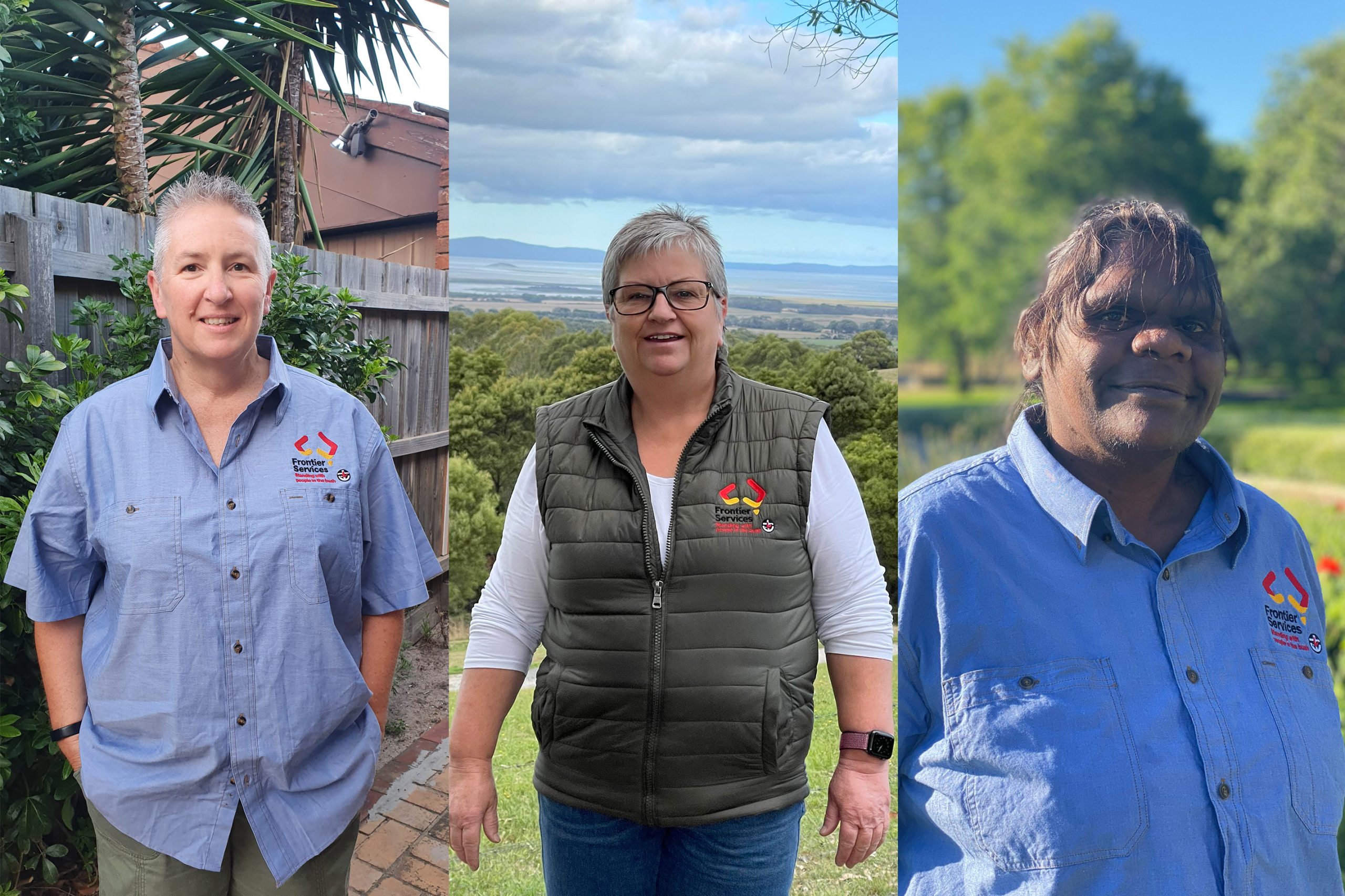
The ministry of Frontier Services goes back to the vision of Rev John Flynn to create a ‘mantle of safety’ for those living in the bush. The work of Flynn is remembered on our Australian $20 note. 110 years on, bush chaplains and Outback Links volunteers are continuing to help and support people living in rural and remote parts of Australia. As the image shows, things have changed from the early days of Flynn. Women bush chaplains as well as husband and wife teams are now a part of the mix, which was once predominantly male. Frontier Services reach now includes indigenous and mining communities as well as isolated farms and stations.
Life in the bush has always been challenging. The last few years have been particularly so with droughts, mice plagues, covid and this year devastating floods through much of eastern Australia. This requires physical, emotional and spiritual resilience to cope. As the reading from Isaiah suggests, God wants to bring comfort to people and make a way through the wilderness. Usually this comfort and compassion comes through human agents, such as the chaplains and volunteers of Frontier Services.
But to bring this comfort to those in the bush needs resources – not just people but also vehicles and fuel. So Frontier Services relies on the generosity of people living in the relative comfort of the city to support those doing it tough in the bush. In the reading from 2 Corinthians, Paul describes such generosity as a grace, a gift of God’s Spirit.
That is why the folk of Croydon and Croydon North congregations are holding a Great Outback BBQ this Sunday to raise some of the resources needed by Frontier Services. So please join us at 11.30 am for the BBQ or jump on line to make a donation towards the inspiring ministry of Frontier Services.
Posted: Friday, November 18, 2022 by Peter Mallen Tags: 2 Cor 8: 9:6-8, 2 Cor 8:1-7, Isaiah 40:1-8Would you like the good news or the bad news?

When there is a mixture of news to be shared, we’re sometimes asked whether we want the good news or the bad news. In our culture, the bad news is easy to find. Just turn on the nightly television news, open a newspaper, log in to Facebook or go to whatever source you normally get your news from. You’ll quickly find plenty of bad news – from wars and disasters to political scandals and scuttlebutt, from looming health crises to the climate emergency.
Good news is a little harder to find, but it’s there if we have eyes to see it and ears to listen. There is much love and joy and care in the world – within families, between friends, in the local neighbourhood. Natural disasters like the recent floods often bring out the best in people – helping out their neighbours in need. It’s also good to remember that the sun will come up tomorrow morning however dismal things may seem right now.
This week we are offered two visions of the world from the ancient past – one from the prophet Isaiah and one from Jesus in the Gospel of Luke. Both are relevant and both are formative for Christian faith. But they are nearly opposites of each other so we have to work hard to hold them together in tension.
First, the bad news from Jesus … the world is in a mess. There are and always will be wars and conflicts between nations, famines, natural disasters and plagues (e.g. covid). Followers of Jesus can expect, at times, to be persecuted and hated, imprisoned and even killed for their faith in Jesus. These things are all to be expected. What are we to do? Stand firm, trust that Jesus will be with us and not be afraid.
By contrast, the good news from Isaiah is that God has a better plan for the world – to recreate earth the way God intends. There will be peace and prosperity for everyone as well as between nations, people will be rewarded for their hard work and enjoy the fruit of their labours, people will grow old with dignity. There will be joy and delight in living. This is a vision of the kingdom of God that Jesus came to inaugurate. We see glimpses of it here and there – which gives us hope and encourages us to continue to work for good in the world.
Both of these visions are true. Each of them says something important. Which one do you most need to hear today?
Posted: Friday, November 11, 2022 by Peter Mallen Tags: Isaiah 65:17-25, Luke 21:5-19Who needs to change?

Whether we like to admit it or not, most of us find change quite difficult, especially as we get older. We feel comfortable in what is familiar and form lifetime habits and ways of thinking. This thinking includes our views of other people. This week’s Gospel story about a tax collector named Zacchaeus, however, shows that change is possible.
The usual interpretation of the story is that Zac is a despised individual who has grown very wealthy at the expense of the poor. The crowds label him a ‘sinner’ and grumble when Jesus goes to share a meal with him. The good news is that Zac has a change of heart after meeting Jesus and commits himself to give away half his money to the poor in the future. A lost person has been found and their life transformed by an encounter with Jesus. Zac changes for the better.
There is an alternative reading of the story, however, that turns on a point of grammar. The verbs that describe Zac giving money to the poor and repaying anyone he has defrauded are both present tense, which suggests actions and attitudes that Zac is already doing. So who needs to change? In this reading of the story, it is Zac’s neighbours who need to change their thinking towards him. Rather than seeing Zac as a despicable tax collector working for the Romans, Jesus encourages them to see Zac as he really is – a son of Abraham who is acceptable to God.
I wonder what prejudices we hold of certain types of people that might need to change – whether towards indigenous people, the LGBTQI community, other drivers on the road or even towards other Christians. The story of Zacchaeus shows us that we all have prejudices and blind spots but that we can change our thinking and our attitudes towards people.
Posted: Friday, October 28, 2022 by Peter Mallen Tags: Luke 19:1-10What we (really) think about ourselves and others

One characteristic of we humans is that we have lots of feelings – about ourselves and about other people. Some of us are more in touch with these feelings than others, and some of us are better – or worse – at expressing these feelings in appropriate ways.
Ways to explore these feelings might include sharing your thoughts with a trusted friend (or counsellor), writing them down in a journal or talking to God about them in prayer. This last option may seem odd, but God is both a very good and patient listener and a person who can point us towards a better understanding of ourselves and others.
In this week’s Gospel reading, two quite different people share their personal thoughts with God through prayer. The first person, a Pharisee, would have been considered a respectable and upright citizen who took their religious faith quite seriously. Their prayer is rather self-focused – reminding God of their virtuous habits and comparing themselves – favourably – to other more dubious people like tax collectors and robbers. In this prayer, the Pharisee appears to do most of the talking – a bit like us often when we pray. As in the image, this person also puts themselves above other people.
The second person is one of the afore-mentioned tax collectors, who were despised by most people as traitors to Israel (since they collected taxes on behalf of the occupying Romans) and as greedy bastards (as they tended to overcharge people and pocket the difference). This person’s prayer is short and simple – they recognise how their life falls short of God’s ways – a harsh but probably true assessment of their practices – and they seek God’s mercy. The sting in the tail of this parable is that it is the second person, the tax collector, who goes home in right relationship with God, rather than the Pharisee. The moral of the story is that God wants us to come to a realistic and honest perspective of ourselves first and foremost and to be humble enough to seek God’s forgiveness. Only then can we hope to come to a realistic view of another person that avoids stereotypes and arrogance. Too often we are quick to judge another without knowing their full story
Posted: Friday, October 21, 2022 by Peter Mallen Tags: Luke 18:9-14Responses to creation

We all have varying responses to the creation that is around us every day. Some of these responses include wonder, awe, respect, thankfulness, guilt, anxiety, fear and anger. Sometimes we move between these various responses depending on what we have seen, experienced or been subject to. While each of these is a valid human response towards creation, the Scriptures suggest that three responses are most appropriate.
The first and most common response in the Scriptures is wonder and awe towards creation that is seen as vast, untameable and yet intricate and inter-connected. The witness of creation is to point us towards its Creator, God. This first response may well lead us to thankfulness and even worship.
Another response in the Scriptures is that of repentance. Quite often creation is described as suffering or broken or groaning, which is actually a reflection of human rebellion and sin against God. The spiritual and the physical are mysteriously linked together.
A third response that flows on from repentance (= changing one’s mind) is to change one’s actions and return to following God’s ways of justice and peace and care for all of creation, which is the vocation of humanity according to Genesis 2:15. As we do this, healing and joy and freedom come to creation.
As you contemplate your own response to creation, which of these three are you most drawn to and why?
Posted: Saturday, September 24, 2022 by Peter Mallen Tags: Genesis 2:15The voice of indigenous wisdom
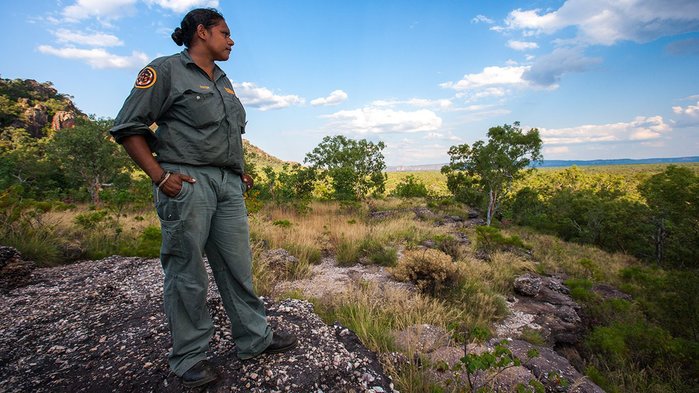
There is certainly a wow factor to creation … whether watching the colours of sunrise or sunset, or the power of the ocean waves, or the delicate plants that survive in the most challenging conditions or weird looking insects. There is so much beauty and diversity – and strangeness – in creation that all of us from time to time wonder what lies behind it all.
The Hebrew answer is that the Creator God is responsible for all that we see in creation. This belief was so foundational that the opening chapters of the opening book of the Bible are given to stories about the origins of the world and of humanity’s place in the world. The best known of these stories comes in Genesis chapter 1 which starts with the words ‘In the beginning God created the heavens and the earth’. Written as a poem or song, the chapter outlines six ‘days’ of creation, culminating with the creation of humanity. At the end of the series, God declares all of creation to be very good.
We have often been taught to read this Genesis account with humans – made in the image of God – standing at the pinnacle of creation and given the vocation of ruling over it. Creation is thus seen as under human control and ready to be exploited for our purposes – whether for farming or mining or building cities. Creation is our servant.
Indigenous people – and ecologists – have a vastly different understanding. They see creation as inter-dependent with each element depending on all the other elements. From one perspective, humanity is the most dependent species of all – we cannot survive apart from the rest of creation. So indigenous wisdom – built up over centuries and millennia – is that we must care for creation just as creation cares for us. Part of this wisdom is knowing about which animals or plants can be taken at which time and in which place and in which way – so that the overall balance and fruitfulness of creation is sustained. There is so much that we can learn from this indigenous wisdom, one of the voices of creation that is often ignored.
Posted: Friday, September 16, 2022 by Peter Mallen Tags: Genesis 1:1-31Creation speaks

We often marvel at the beauty and order of creation. God declares it to be ‘very good’ as the creation hymn in Genesis chapter 1 expresses it. Although it does not speak in the words of human language, creation nevertheless ‘speaks’ to us all the time. As Psalm 19 puts it, creation is speaking every day and its voice goes out through the whole earth, its words to the end of the world.
Although we may struggle to discern it sometimes, Scripture suggests that there is a connection between the physical and spiritual realms. So in Psalm 19, for instance, creation tells of the glory of God and the commandments of God are righteous and bring life. There is a balance and connection between the two realms.
Hence when the nation of Israel faces God’s judgment for neglecting God’s ways, the land of Israel mourns and becomes empty and formless (Jeremiah 4:23-28). It is as though creation is unravelling and reverting to chaos just as the nation is collapsing and being sent into exile. Conversely, when Israel is forgiven and urged to return to the land, creation rejoices and blossoms, and water flows in the desert (Isaiah 35:1-2). So the health and mood of creation seems to mirror what is happening spiritually within Israel.
If creation continues to speak to us today and if there is a connection between the physical and the spiritual, what is the voice of creation saying? The burning forests, melting glaciers and polluted rivers seem to suggest that humanity’s greed and selfishness is making the planet sick. But if we will repent of our evil ways and look after the poor and care for the earth wisely – rather than seek profit and ever growing consumption – then perhaps creation can again thrive and give glory to God – as intended.
Posted: Friday, September 9, 2022 by Peter Mallen Tags: Psalm 19Season of creation

Spring has arrived – and with it the sense that nature is waking up from its winter slumber … wattles and blossoms are in bloom, bees are buzzing, birds are mating and some trees have starting sprouting fresh new leaves. It’s also the time to celebrate the Season of Creation (SOC), which runs through the whole of September each year.
The symbol for SOC this year is the burning bush, which is taken from the story in Exodus 3 where Moses is intrigued by the sight of a bush that is in flame but not burning up. As he approaches for a closer look, God speaks from the heart of the bush and asks Moses to remove his sandals because he is standing on holy ground.
The burning bush as used in this symbol is engulfing the world in flame. It speaks of creation as under stress due to climate change, leading to higher temperatures and more wild weather events. These include fires in western Europe and western America along with new records for temperature in the UK (above 40 deg C) and devastating floods in Pakistan where a third of the country in under water. Nature and ecosystems are suffering.
The theme of SOC this year is listening to the voice of creation, which includes listening to the voices of those who speak on behalf of creation – scientists, ecologists, indigenous peoples, subsistence farmers and fishermen. And of course we can also go to the source and listen to sounds and voices of nature itself by spending some time along a creek or parkland – quietly listening to the various bird calls, frogs and insects.
What message are these voices telling us? Perhaps they are saying that it’s time to take off the sandals of our unsustainable lifestyles that are slowly killing the planet and reconnect with the holy ground of God’s earth.
Posted: Friday, September 2, 2022 by Peter Mallen Tags: Exodus 3:1-6Practising hospitality

Offering hospitality is part of being human – it happens across all cultures and all religions. We are social creatures by nature. It’s one reason why the covid lockdowns were so difficult for so many people – we were cut off from gathering and meeting with family, friends and work colleagues – and despite the technical marvel of programs like Zoom, it just doesn’t provide the same experience as being in the same physical space with others.
Middle Eastern culture places a particularly high importance on hospitality, which is one reason why Jesus seems to spend so much time sharing meals with others. He was even maligned as being a glutton and a drunkard (Luke 7:34). As followers of Jesus, Christians are called to practise hospitality, for who knows – we may be entertaining angels unawares, as Abraham did (see Genesis 18). But Jesus suggests a few tweaks on normal social etiquette – such as inviting the poor, lame and crippled and not just your friends and family – and not expecting an invitation in return.
As a country we have much to learn about hospitality. Our treatment of refugees and asylum seekers over the last 20 years, for instance, is nothing short of shameful. Yet even when we locked up these people as prisoners for years, despite the fact that they have committed no crime, their desire to offer hospitality to visitors was amazing. They offered the one thing possible – making us endless cups of green tea in the visitor’s centre.
The great blessing - as well as the great danger – of offering hospitality is the possibility that we will be changed, that our understanding of life will be broadened, that our compassion and empathy for others will be deepened as we listen to the stories of our guests. May we learn afresh the joys of offering hospitality, despite the ongoing need to be careful to do so in a covid safe way.
Posted: Saturday, August 27, 2022 by Peter Mallen Tags: Hebrews 13: 1-8, Luke 14:7-14Journeys of faith

Every one of us is on a journey called life. It had a beginning point, has many twists and turns along the way and will one day reach an end. Older people in particular, may be well aware that their journey of life is drawing to a close and may look back over their life with a mix of gratitude, fulfilment and regret.
Our journey of faith also traces out a path, although we may not be conscious of when it really started – whether in the womb (as suggested by Psalm 139), or gradually as we discovered more about the world or at a definite point in time. Along the way our journey of faith may involve cul-de-sacs, brick walls, exhilarating mountain top experiences, routine and habit. Hopefully for all of us there is a growing edge to our faith, whatever stage of life we are up to.
In this week’s challenging reading from Hebrews two journeys of faith are contrasted. The first is the journey of the Israelites from slavery in Egypt to Mt Sinai where Moses receives the Ten Commandments and many other laws. The description of the scene at Mt Sinai is intended to convey awe and wonder – as Yahweh descends on the mountain in storm and fire. The earth shakes and the people are terrified. It’s as if the writer is telling later generations how awesome and powerful the presence of God is and therefore how they must obey God’s every command as though their very life depends on it.
This journey of faith is contrasted with a Christian’s journey of faith that will culminate in God’s glorious presence in heaven, surrounded by angels and all the saints who have gone before. Amidst all the struggles and challenges of life on earth, only two things are truly dependable and solid, namely God and the kingdom Jesus is building. So the message in this case seems to be to endure whatever hardships life may throw at you because your journey will end in the glorious presence of God.
Two journeys of faith towards two apparently quite different destinations. Yet the journey is towards the same God in each case. So it is with each of us. Our journey of faith is unique to us yet it has a common end point – the presence of God. So the author seems to be saying that however difficult or routine or amazing our journey of faith is – and it may be all this and more over our lifetime – keep your eyes fixed on the final destination of the journey and the hope of enduring life in God’s presence.
Posted: Friday, August 19, 2022 by Peter Mallen Tags: Hebrews 12: 18-29Faithfulness and focus

Faith is a many splendoured experience that comes in various forms. Sometimes faith is knowing something deep inside that you just know to be true. Sometimes faith is more like a hunch or an intuition. Sometimes faith is borne from past experience, such as knowing that the light will come on if I turn the switch. Sometimes (often in fact) faith is a form of trust, such as following a course of medication or having a vaccine because we trust the medical science.
Spiritual faith is trusting in the goodness and loving kindness of God even when our situation or circumstances may suggest that we are all alone in the world, forgotten by God. In the ‘Hall of faith’ chapter in Hebrews 11, there is a list of famous people of faith from the Scriptures placed alongside another list of unnamed people of faith who suffer misery and persecution. All are commended for their faith, which suggests that having faith is no guarantee that life will be easy and, conversely, that suffering is not caused by a lack of faith.
The passage then encourages us to persevere in our own ‘race’ of faith in the light of this multitude of both ‘successful’ and ‘suffering’ forms of faith. In this race we are encouraged to persevere through the hard times that will inevitably come our way at some stage or other, focusing especially on the example of Jesus who is the beginning and end of our life of faith, the pioneer and perfecter of our faith (Heb 12:2). As we know, Jesus endured great shame and agony on the cross, but then experienced joy. We can expect to experience similar challenges – and joys – as we follow in the footsteps of Jesus, who is the source and inspiration of our faith.
Posted: Friday, August 12, 2022 by Peter Mallen Tags: Hebrews 11: 29-12:2Living with faith

When I was a young adult I admired people of faith. I wondered how they could be so certain about the big questions of life when to me everything seemed quite uncertain. I think I made the common mistake of contrasting faith with doubt, assuming that a person with faith must have no doubts.
These days I would call myself a person of faith – but that doesn’t mean that I have everything figured out. Rather, it seems to me that faith is having the courage to trust what you can’t fully grasp, despite the uncertainty, as suggested by the above quote from Brene Brown. The book of Hebrews states it this way: faith is confidence in what we hope for and assurance about what we do not see (Heb 11:1).
So when I look at the world I see plenty of reasons for doom and gloom and many situations that seem impossible to resolve, such as the ongoing war in Ukraine or the climate emergency that we seem no closer to solving. But faith is trusting in God and God’s promises in spite of the difficulties and struggles that surround us every day. It is having the courage to trust that following the way of Jesus will make a positive contribution to the world and the people around us.
Posted: Friday, August 5, 2022 by Peter Mallen Tags: Hebrews 11: 8-16, Hebrews 11:1-3Learning to pray

Prayer is a deeply spiritual practice that crosses many religions. People pray for all sorts of reasons – for protection and security from evil, for the healing of a loved one, for rain or for it to stop raining, to connect with one’s god. Even non-religious people pray in times of extreme anguish. People like the slave trader John Newton, who – afraid that he was about to drown during a fierce Atlantic storm – cried out to God to save him – promising to turn his whole life around. Newton survived the storm, gave up slave trading and became a Minister and hymn writer, whose best known hymn is the classic Amazing grace.
In this week’s gospel reading from Luke, the disciples observe Jesus at prayer and ask him to teach them how to pray. As faithful Jews they would have prayed at least three times every day, so the request is more about how to pray like Jesus. The prayer Jesus teaches them – known to us as the Lord’s Prayer – is short and memorable, less than 60 words, which one can recite from memory in under a minute.
Why then do we so often find prayer difficult? Perhaps it’s because we have a transactional view of God – that if we do this (e.g. pray) then God will do that (e.g. grant our requests). This seems to miss the point of prayer which is about building relationship and trust. We don’t pray to try and twist God’s arm to give us what we want, but rather so that we will be changed through the practice of prayer and will come to understand more of God’s character and God’s perspective on the world. We also tend to fill our prayer times with our words and find it much harder to be still and to listen to what God may be saying to us.
A disciple is a learner – and when it comes to prayer we are all learners. There is no one right way to pray or right place to pray – just read through the book of Psalms, which is the Bible’s prayer book. If you struggle with prayer this is a good place to start. If we listen to Jesus we will learn that prayer can be very simple, but whose daily practice helps connect us with God.
Posted: Friday, July 22, 2022 by Peter Mallen Tags: Luke 11:1-13Getting the balance right

We often hear these days about the need for people to get their work/life balance right. This dilemma has been highlighted by the trend of working from home that was encouraged during covid lockdowns. The home became the place of paid work as well as the place of learning for many students. The home is of course also the place one lives one’s personal life. So where does work (or study) begin and end and how does this impact the rest of life?
A similar issue lies behind this week’s Gospel reading about two sisters, Martha and Mary. It appears that Martha is in charge of running the house and expects her sister Mary to help out as required when Jesus and his band of travelling disciples arrive for a meal. Providing hospitality to guests was both an honour and an expectation in Eastern culture. And the role of women was to organize the hospitality. This was considered to be women’s rightful ‘work’.
The problem is that Mary decides that she will sit and listen to Jesus’ teaching – alongside the other male disciples – while Martha prepares the meal. Martha is unimpressed and interrupts Jesus to demand that he persuade Mary to get back into the kitchen to help out. Instead, Jesus commends Mary and suggests that she has chosen what is the ‘better part’.
What’s at stake is more than a feminist rebellion against imposed gender roles. The situation asks us to consider how to balance the demands of discipleship (learning to follow Jesus) with other demands in life (e.g. work, home schooling, running a house). Jesus often invites people to follow his example which cultivates the inner life of relating to God (e.g. through prayer, worship, stillness) but is also fully involved in life in the world (e.g. work, community building, helping others). The challenge – as with the question of contemporary work/life balance – is how to balance these distinct yet overlapping spheres of our lives.
NAIDOC invitation
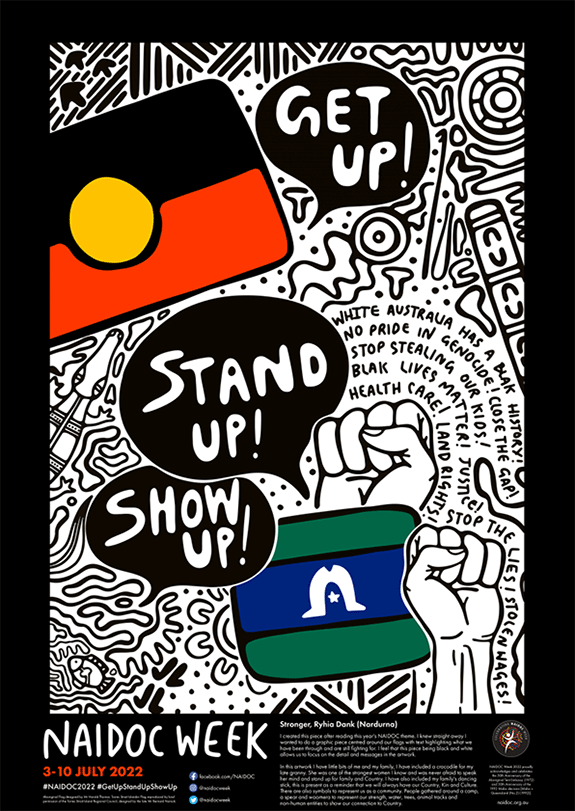
This week is NAIDOC Week that provides us all with the opportunity to remember and celebrate the culture, history and many achievements of indigenous people in this country now called Australia. The week-long celebration grew from the Aboriginal Sunday promoted by William Cooper back in 1938 to mark the Sunday before Australia Day each year as a day of mourning for indigenous people. Under the promotion of the National Aborigines and Islander Day Observance Committee, NAIDOC has been extended from a day to a whole week and has moved from January to July.
The theme this year is Get up! Stand up! Show up! It’s a reminder of how indigenous people have indeed got up, stood up and shown up in defence of their lands and culture against the invading colonisers and in the long fight for recognition, rights and treaty that continues today.
It’s also an invitation for the Second Peoples of this country to get up, stand up and show up as allies and advocates for the First Peoples. This is more than offering an acknowledgement of country at the start of a meeting or event. It’s an attitude and aspiration of being willing to do more in this space and to walk with the First Peoples in their struggle for justice.
The OT prophet Amos rails against the complacency of the people of his day towards injustice and urges them to instead make justice roll down like a river and righteousness like a never failing stream (Amos 5:24). In our day, justice for indigenous people includes closing the gap on so many basic issues such as housing, health and rates of imprisonment. It also means having the courage and active will to implement the Uluru Statement from the heart to give indigenous people a voice to Parliament, to establish a makarrata truth-telling commission and to work towards a treaty.
While these are grand visions on a national scale, we can also work at a local level. The Assembly of the Uniting Church encourages each local congregation to reach out and connect with their local indigenous mob … not to solve problems but to develop a relationship. And then to listen, to listen deeply and then listen some more to the stories and history and lived experience of our local indigenous brothers and sisters.
Do good to all
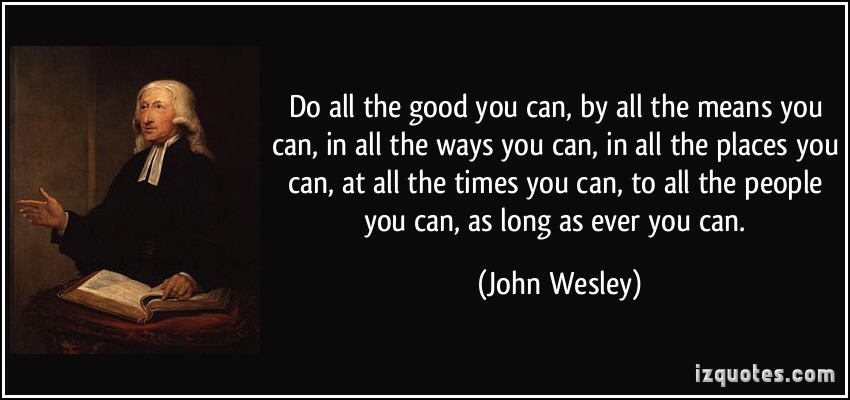
The data from the latest 2021 Australian Census published this week shows a continuing decline in the number of people who identify as Christian and a corresponding increase in the number who identify as no religion. In some ways this simply continues the trend that began in the 1970s and is therefore hardly surprising. On the other hand, the data suggests that people who may identify themselves as ‘spiritual’ do not want to become involved with institutional Christianity.
Why is this? It may be due to past appalling conduct perpetrated by the church (e.g. child sexual abuse) but may also reflect the declining levels of trust in all institutions by younger generations, whether the church, the scouting movement, community groups such as Rotary or various levels of government. It may also be due to a perception that Christian beliefs are illogical and irrelevant to contemporary life.
But perhaps we shouldn’t be too perturbed by the Census data. Back in the day when the New Testament was written, the Christian proportion of the population was quite small and was competing against many other faiths and belief systems. When we read the writings of people like the apostle Paul he was certainly keen to get the church’s theology right, but he was also passionate about the followers of Jesus living in such a way that their faith practices were noticed and made a difference to the people around them.
So in this week’s reading from Galatians 6 for instance, Paul implores the people of God to do good to all and to never tire of doing good. Paul hoped that the consistent loving actions of Christians would establish their reputation as good citizens who helped the most needy in society and who looked after their own with compassion. John Wesley expressed this same idea in the memorable way as above. May we indeed do all the good we can … to all the people we can … for as long as ever we can.
Posted: Thursday, June 30, 2022 by Peter Mallen Tags: Galatians 6:1-10Called to freedom

Freedom is a gift and a right that we don’t often think about in this country Australia. We are used to doing what we want, when we want and with whom we want. But those of us who live in Melbourne have had a taste of what life is like when certain freedoms are removed. During covid lockdowns in the last two years we were not allowed to gather together, not allowed to travel and not allowed to leave our homes at all except for a very limited number of reasons. When the restrictions were eased, we delighted at once again being able to meet with other people and being allowed to participate in communal activities.
Paul places freedom at the heart of the gospel, along with grace and faith. In his letter to the Galatian churches, this freedom is focused on being liberated from the Jewish Law with its many restrictions and regulations. We can enjoy right relationship with God based purely on our faith in Jesus Christ and what he has done for us.
Because of this insistence that we don’t need to follow the detailed demands of Jewish Law, Paul is seen as a bit of a trouble-maker and rebel … like Jesus before him! But Paul turns this on its head by suggesting that we are to use our freedom to love and serve others, effectively becoming a slave … the very opposite of a free person.
So while freedom is a fundamental right, it’s possible to abuse our freedom for selfish or indulgent ends. Instead, sometimes we have to curtail our freedom to best serve others. This was seen during the covid lockdowns when the vast majority of Melburnians complied with the restrictions and curtailed their freedom for the sake of loving and serving others by keeping them safe. Sadly this attitude has largely disappeared and selfish indulgence is back in charge.
May God give us wisdom to discern how to use and enjoy our freedom – in ways that serve the interests of others.
Posted: Friday, June 24, 2022 by Peter Mallen Tags: Galatians 5Remembering refugees

This family of Nades, Priya, Kopika and Tharnicaa Murugappan are well known to mainstream Australia as the ‘Biloela family’. They have captured our minds and our hearts ever since they were cruelly snatched away from their Queensland home by Australia Border Force and placed in immigration detention some four years ago. Their crime? For the parents to come to Australia by boat seeking asylum and, having settled into life in a small rural town, to be a day or two late in re-applying for a bridging visa.
The Federal Coalition government clearly wanted to make an example of this high profile family by deporting them to Sri Lanka and when this was foiled by the courts, to re-open the Christmas Island detention centre (at great cost to the taxpayers of Australia) just so it could house this one family. Adequate medical care was then denied to the youngest child who became seriously sick and had to be emergency airlifted to Perth Childrens Hospital. The family were then released into community detention until their ongoing court case could be resolved but barred from leaving Perth.
A change in government on 21 May saw a dramatic shift in the family’s fortunes. The new Labor government allowed them to return to Biloela last weekend and is making noises that they will be allowed to stay permanently. Their story is one of resilience and hope and the power of friendship and care provided by a dedicated group of women who advocated for the family’s return to Biloela. It is also a story of deliberate and calculated cruelty and lack of compassion by an Australian government more intent on the political benefit of ‘stopping the boats’ rather than providing any welcome or hospitality to refugees.
Refugee Week that runs 19-25 June gives us an opportunity to reflect on the turning point we may have reached in Australia’s asylum seeker policies. The Labor government has said that it will continue the policy of boat turnbacks when safe to do so and offshore processing (on Nauru) for any arrivals by boat, making their policy just as harsh as the previous government. But the treatment offered to the Nadesalingam family from Biloela offers a glimmer of hope that the large contingent of asylum seekers still living in limbo in Australia or stuck in detention will at least receive recognition and be treated as real people with stories to tell (often painful or traumatic) and hopes for their future.
May we remember Jesus’ call to treat others as we would have them treat us (Matt 7:12) and also that Mary, Joseph and baby Jesus were themselves refugees who relied on receiving hospitality in Egypt (Matt 2:13-15).
Posted: Saturday, June 18, 2022 by Peter Mallen Tags: Matthew 2:13-15, Matthew 7:12Paul’s story, our story and God’s story

Humans are born storytellers, whether it be stories shared with family members or friends, or whether it’s meeting with guests who come to our food bank or to Tuesday lunch or to our playgroups. Telling stories is part our human DNA and each person has a story to tell if we take the time to listen. Some of these stories involve hardship and resilience, some speak of care and compassion and some are the stuff of laughter and legend, especially in families.
The apostle Paul also has an interesting story to tell. While we may usually think of Paul in terms of dense theological arguments about Christ (e.g. Romans) or sorting our church problems (e.g. Corinthians), his life story is quite fascinating. He was brought up as a strict Pharisee, the sort of person who often opposed Jesus, and later he tried to actively suppress the church. After a memorable but mysterious encounter with the spirit of the risen Jesus, Paul’s life is completely transformed and he becomes an outspoken and passionate witness for Christ. But not immediately. After the encounter with Jesus it is nearly another 20 years before he begins his ministry. Perhaps it took him that long to reconcile his faith in Jesus with his earlier faith as a Pharisee.
As Christians, what gives our stories meaning and what gave Paul’s story meaning is how they interact with God’s bigger story that goes all the way back to creation. This bigger story involves the people of Israel, the insights of the prophets and wisdom writers, the coming and ministry of Jesus, the giving of the gift of God’s Spirit and the ongoing life of the church and of the wider creation.
On this Trinity Sunday it’s helpful to reflect on how we are invited to share in God’s story and to participate in the life of God. We each grasp different aspects of God’s story – creation, justice, worship, love, compassion, grace, forgiveness, inclusion – which is why it’s important that we listen to each other’s stories as well as to the all-encompassing story of God.
Posted: Thursday, June 9, 2022 by Peter Mallen Tags: Galatians 1-2Surprising Spirit

Pentecost Sunday is one of the few days in the church year when we highlight the person and work of the Holy Spirit. So it seems a shame when we focus too much on some of the symbols associated with this day – wind and fire – both inanimate forces, which point to a powerful and perhaps threatening force at work (think storms and bushfires).
In the Acts 2 account that we usually read at Pentecost, the effect of the Spirit is certainly powerful, leading the disciples to praise God loudly and in multiple languages, which soon gathers a crowd of bewildered onlookers. The Spirit then emboldens Peter (and perhaps other disciples) to speak about Jesus and about the recent events of Easter. The Spirit challenges the hearers to respond and then gives vibrancy to the new community that forms. So the Spirit is indeed a powerful agent, pointing people towards God and towards Jesus and prompting life-giving responses.
This week we will instead be reading from the second Pentecost story that occurs in Acts 10, in which Peter is led through a series of Spirit initiated occurrences to speak to the household of a Roman soldier named Cornelius. The result is similar to the first Pentecost story with those present led to praise God and respond positively to the message about Jesus. The key difference is that this time around, those listening are Gentiles, non-Jewish people, Romans no less who were often despised by Jews.
This second Pentecost story illustrates that God’s Spirit often leads us to go beyond where we might feel comfortable, with surprising and life-changing results. It turns out that God accepts every person whose heart is open – everyone is acceptable to God, even those we might consider beyond the pale. So the person of the Spirit works powerfully and surprisingly. Where might the Spirit be leading each of us this Pentecost?
Posted: Friday, June 3, 2022 by Peter Mallen Tags: Acts 10, Acts 2Be brave. Make change.

The apostle Paul uses the imagery of reconciliation and peace between estranged parties as one of the ways of understanding the death of Jesus. He argues that humanity was estranged from God – and from one another – but now God has acted decisively through the death of Jesus to bring both reconciliation and peace. This has not happened through human initiative or power, but rather through the gracious actions of God.
The headline slogan ‘Be brave. Make change’ is not a plea to the new Labor government from the Greens or Teal independents, although it would be an appropriate message to send. Rather it is the chosen theme for this year’s National Reconciliation Week that starts on 27 May and runs through to 3 June. This annual event provides an opportunity to learn about the histories, cultures and achievements of indigenous people, and the chance to explore how each of us can contribute to achieving reconciliation in Australia.
When we think of the often fractured relationships between indigenous people (the First Peoples of the land we call Australia) and later colonisers/settlers/immigrants (the Second Peoples), it is clear we have a lot of ground to catch up if there is to be true reconciliation and peace. A good start would be to listen deeply to each other. Indigenous people yearn for their voice to be heard, as expressed in the 2017 Uluru statement from the heart.
They want a voice to Parliament enshrined in the Constitution, a Makarrata (truth-telling) Commission and a treaty. Each of these requests will be challenging to implement and potentially costly for Second Peoples, but with a change in government, now is the time to act – to be brave and to make change. May God give our political leaders both the wisdom and the will to act, and all Australians the compassion and courage to respond positively.
All in One SEO PackHelp
Posted: Saturday, May 28, 2022 by Peter Mallen Tags: 2 Corinthians 5:16-19, Ephesians 2:11-18Success and struggle go together

We all like winners, especially on the sporting field or in politics. We’re told that winners are grinners. We’re sometimes told that winning isn’t the main thing … it’s the only thing. But for every winner, there is nearly always a loser and often many, many losers.
So if we shift our thinking a little, what does success look like away from sport or politics? What does success in marriage look like, for instance? What would a successful outcome in Ukraine look like? What would a successful church look like?
One reading of the book of Acts is that the story is all about success. Large numbers of people come to trust in Jesus and new communities of faith spring up everywhere from Jerusalem to Rome. Women are involved in leadership as well as men. The Christian community models its life on the loving and inclusive ways of Jesus. Nothing, it seems, can hinder the spread of the word of God.
But there is another, darker side to the story. Mixed in with the success there is struggle and suffering. The apostles are harangued and imprisoned, Stephen is stoned to death, John’s brother James is executed by Herod and Paul stumbles from one struggle to the next, suffering floggings, imprisonments and nearly drowning. There are also struggles within the community as some groups get ignored and there are disagreements on how to handle difficult issues.
It seems as though success and struggle go hand in hand throughout the book of Acts, as they often do in our individual lives and in our community life. Depending on our personality we may view this tussle between success and struggle as the glass being half full or half empty. But when we face struggles in our walk of faith, it’s worth remembering that Jesus also faced many bitter struggles and warns his followers that they must take up their cross every day and follow in his footsteps.
We enjoy success … but struggle and suffering are part of our life too. Often the joys and successes we experience are all the sweeter if they have involved struggle. May God give us a right perspective that we might experience God’s presence and joy and peace in the midst of both our successes and our struggles.
Posted: Thursday, May 19, 2022 by Peter Mallen Tags: Acts 14-21God’s plan and our plans

People make plans all the time … whether it’s plans to go away on holidays (which for many of us have been on hold for the last two years), plans for how to celebrate an upcoming birthday or how we will spend Election day on 21 May, or plans for getting fit or losing weight. Such plans help add meaning to our life and give us a future to look forward to.
There’s a well-known verse in the book of Jeremiah that suggests that God has plans too, good plans … plans to prosper us, plans to give us hope and a future. This promise is spoken in the midst of a dismal medium-term outlook for Israel that includes loss of their land, loss of the temple and exile to Babylon. God seems to be saying that there is a bigger perspective here, if we have eyes to see it and trust to grasp it.
Jesus too had a plan for his followers that is summarised in Acts 1:8, namely that they would be his witnesses in Jerusalem, in Judea and Samaria and to the ends of the earth. In its historical context, this plan gives an outline of how the message of good news spread from its starting point in Jerusalem all the way to Rome, the centre of the then known world.
How might this plan apply to us today? It suggests that we begin where we are and live out our witness – through both our words and our actions – among our friends and our neighbours. As the opportunity arises, we can carry the message about God’s love and justice wherever we go. One benediction puts it this way … Go into the world in peace; carry God’s wisdom, speak forth God’s word and embody God’s love, wherever you are and whoever you meet.
Posted: Saturday, May 14, 2022 by Peter Mallen Tags: Acts 1:8Remembering Mother’s Day

This Sunday is that special day in the year when we get to say thankyou to our Mums and, depending on our family’s tradition, take Mum out to lunch, give her bunches of flowers or boxes of chocolates. This is all very nice and I’m sure most mothers appreciate the attention and love that’s given to them on this day. But of course being a mother is a 24/7, 365 days a year role that never really ends. One doesn’t ever ‘retire’ from being a mother and caring about one’s children.
While this is a happy day for many, it can also be a difficult day … whether grieving for one’s mother, dealing with a difficult relationship with one’s mother, lamenting that one couldn’t be a mother or struggling to make ends meet as a single parent. It also leaves out the many other significant women in our lives, whether they are aunties, sisters, wives, daughters, granddaughters or friends. These women are also worthy of our thanks.
While it is usually the men who feature in our Bible readings, this week’s description of the early Christian community in Acts 2 suggests that roles and responsibilities were evenly shared. The (male) apostles may have been the teachers, but it was almost certainly the women who provided the hospitality and the homes for people to meet in, as was the case during the ministry of Jesus. It takes the gifts of each person to build a community, so let us remember and be thankful for the wonderful gifts that so many women contribute.
Posted: Friday, May 6, 2022 by Peter Mallen Tags: Acts 2:42-47What happened after the first Easter?

The story of Easter normally finishes with Jesus – risen from the dead – appearing to his disciples and commissioning them to go out into the world and spread his message of good news. Of the four Gospel stories we have, three of them – Matthew, Mark and John – finish in this way. The fourth Gospel – Luke – continues the Jesus story for another thirty years, thus giving us a valuable insight into what happened after the first Easter.
What did the disciples do? Luke tells us that they waited in Jerusalem and gathered together in prayer in the days leading up the Pentecost, when God’s Spirit was poured out upon them. This gift of the Spirit seemed to give the disciples a new boldness and confidence and they started telling people about Jesus and even healing people in a way similar to Jesus. This got them into trouble with the authorities, just like Jesus. Eventually the disciples were scattered and wherever they went, they continued to share the story of Jesus. And small communities began, formed of followers of Jesus.
Christian communities today are the spiritual fruit of the efforts of these early followers of Jesus who shared their message through both their words and their actions. The challenge for us today is to continue the never complete mission of Jesus to bring good news to the world. Many of us are comfortable doing this through actions of love and compassion. But we need to also tell the story of Jesus – in words. May God’s Spirit give us the boldness and confidence to do so and also the wisdom to know the right words to speak at the right time.
Posted: Friday, April 29, 2022 by Peter Mallen Tags: Acts 1-4What to make of Easter

The story of Easter is brutal, confronting and enduringly evocative. Jesus, the one who was known as a compassionate healer and bold preacher, comes to Jerusalem at Passover time. After annoying the temple authorities he is arrested by the Jewish leaders, tried and then sentenced to death by the Romans. It all takes place very quickly and brutally and within a 24 hour period Jesus is dead and buried. Might and power have won over compassion and love. Hope has died.
His followers are in shock as to how this could have happened and are now afraid for their own safety. This should be the end of the story as the leader of the movement is eliminated. But then something unexpected and extraordinary happens. The tomb where Jesus’ body was laid is found to be empty and some of his followers see visions of angels saying Jesus is risen from the dead. Their grief turns to confusion and then to joy. Something changed them and energised them to take the message of Jesus out into the world. The most plausible explanation is that they encountered the risen Jesus.
When we look around at all the turmoil in the world, it’s obvious that might and power usually win (e.g. the Russian invasion of Ukraine). Compassion and love are for the so-called bleeding hearts of the political left who fail to see that strength and toughness are needed to overcome evil and injustice. And yet … and yet … the person of Jesus – his life, message, death and resurrection – has had a deeper and more lasting influence on humanity than any brutal despot or government. The story of Easter affirms that goodness is indeed greater than evil, that love is greater than hate and that life is greater than death (Desmond Tutu).
Posted: Thursday, April 14, 2022 by Peter Mallen Tags: Luke 24:1-49Welcome to Jerusalem

This Sunday is known as Palm Sunday and recalls Jesus’ entry into the city of Jerusalem. We are used to seeing signs when we enter a town or city. If they were a thing back in Jesus’ day (which they weren’t) such a sign might have read ‘Welcome to Jerusalem – capital city of Judaism’. For Luke, Jerusalem is a most significant place. It’s where the priest Zechariah had his vision in the temple, the place where Jesus was dedicated, the goal of Jesus’ long journey and of course the place of his passion, death, resurrection and ascension.
In Luke’s Gospel, Jesus set off for Jerusalem way back in chapter 9, so it’s taken a long time to reach the city. Luke has carefully built the tension in his narrative with regular reminders that Jesus is headed for Jerusalem and what will likely take place there. Now that he’s finally arrived, what sort of welcome will he receive?
His followers are excited, joyful and singing songs that speak of a righteous and victorious king entering the city in the name of God. They clearly regard Jesus as a king, the Messiah, based on his ministry and mighty deeds. They are looking forward to those in authority welcoming Jesus as the king who brings peace and hope and new life.
The Pharisees meanwhile, Jesus’ chief sparring partners through the whole story, try to dampen the buoyant mood and ask Jesus to tell his followers to be quiet. We’re also told that those responsible for the running of the temple, the heart of Jewish worship, are seeking to kill Jesus, especially after his action of disrupting the ‘business’ side of the temple’s operation.
All seems set for a high stakes showdown, where welcome will quickly turn to hostility and violence.
Posted: Saturday, April 9, 2022 by Peter Mallen Tags: Luke 19:28-48Living with clarity or confusion

This week the Federal Treasurer, Josh Frydenberg, handed down the Budget. Clearly it was prepared with the imminent election in mind, with cash handouts to many and a temporary reduction in the fuel excise which will make petrol and diesel purchases some 20 cents per litre cheaper for motorists.
What is rather more confusing (or perhaps it’s clear …?) is the vision for Australia’s medium term future as outlined in the Budget. It would suggest that we need to spend rather less on addressing climate change than previously and spend nothing more on aged care (despite obvious issues in staffing numbers and pay) yet we can afford to spend billions of dollars on seemingly unimportant infrastructure projects in marginal electorates.
This week’s Gospel story illustrates the gulf between Jesus’ vision and that of the disciples. While Jesus is quite clear and open about the reception he will likely receive in Jerusalem (mocking, insults, flogging, death), the disciples remain confused and lacking understanding (thinking that Jesus will receive a hero’s welcome from the authorities in Jerusalem). The story of the blind man Bartimaeus receiving his sight illustrates that he sees clearly who Jesus is and what his needs are, even while the disciples remain in a fog of confusion.
As we continue to walk with Jesus on the road that leads to the events of Easter, I wonder whether we are clear or confused regarding what we are called to do as followers of Jesus. Where are we seeking to follow Jesus even though the road seems hard, and where are we following our own agenda even though it may be well wide of Jesus’ call? Where do we see clearly and where do we remain blind?
Posted: Friday, April 1, 2022 by Peter Mallen Tags: Luke 18:31-43Towards the heart of the gospel
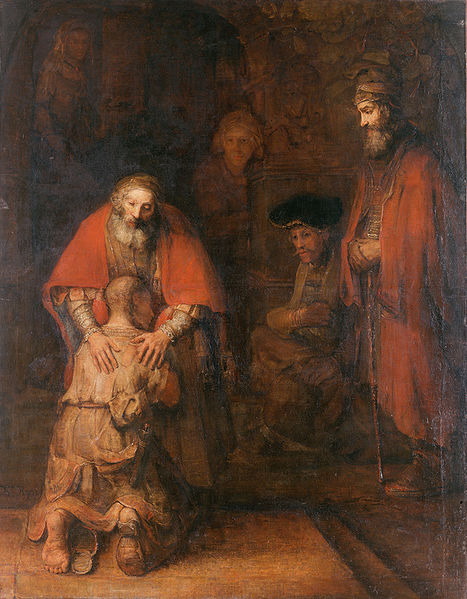
Most religions claim to offer a source of comfort and guidance. They provide a basis for moral beliefs and ethical behaviours, often provide a sense of community and a connection to tradition. Religions differ significantly, however, when it comes to questions of God, multiple gods or no god at all. The three monotheistic religions – Judaism, Christianity and Islam – all claim that there is one God who is the Creator and who has provided guidelines for how to live a just and holy life. When it comes to Christian faith, the teaching and person of Jesus Christ provide unique insights into the nature of God.
This week’s parable points us towards how we are to picture God. It’s the well-known parable of the Prodigal Son, in which a disrespectful younger son demands his share of the family inheritance and promptly spends all the money on wild living. When he is broke, hungry and without friends, he returns home, hoping to be taken on as a hired labourer. His father sees him returning from afar, rushes to welcome and embrace him and throws a big party to celebrate the son who was effectively dead now being alive again.
The second, older son hears the music from the party and becomes angry on learning that his father has thrown a party to mark the occasion of his younger brother’s return. This older son is presented as the dutiful, responsible one who always does the right thing, but who resents the father for not honouring him with a party for his many years of faithful service. The father invites the older son to join the celebration, but the parable is left open-ended as to what will happen next.
Jesus’ repeated message – that we know as the gospel – is that God is indeed like the father in the parable – gracious, compassionate, extravagant in love and patient with our shortcomings. We do not have to merit or earn our salvation from God, but rather can receive God’s blessing as a free gift. We call this free gift grace. This is the heart of the gospel message. The challenge for us as Christians is how prepared we are both to receive God’s grace into our own lives and to extend such grace to others.
Posted: Friday, March 25, 2022 by Peter Mallen Tags: Luke 15: 11-32, Luke 15:1-3Walking with courage

This iconic photo was taken during the Tiananmen Square student protest in Beijing in 1989. It shows an ordinary person standing in front of four tanks, which were among many tanks sent to the square to clear protestors. It captures the essence – and foolhardiness – of courage. The person apparently has no concern about their personal safety in the midst of a dangerous and tense situation. They may have been quite frightened but chose to act in this way regardless.
In this week’s Gospel reading, Jesus is journeying towards Jerusalem and is warned by some Pharisees that King Herod wants to kill him. Presumably Jesus took the warning seriously as Herod had already killed John the Baptist. Rather than being ruled by fear, however, Jesus calmly sends word back to Herod that he intends to carry on his journey and his ministry as before. He feels compelled to go to Jerusalem even though the city has a reputation for killing God’s prophets. Jesus acts with courage.
Note that courage is not the opposite of fear. Courage is acting or speaking despite one’s fear. Courage may well be what God calls us to embrace in a given situation, although sometimes caution and withdrawal from a potentially dangerous situation is the better course of action. Our natural inclination may well be to withdraw but some situations require us to act with courage (e.g. Ukrainian resistance to the Russian invasion, speaking to politicians in the lead-up to the election). We need God’s wisdom to know which way to act as well as God’s strength and boldness to act with courage.
Posted: Saturday, March 19, 2022 by Peter Mallen Tags: Luke 13:31-35Distractions – good excuses not to follow Jesus

I wonder what sorts of things are distractions for you? It could be Facebook, or talkback radio, or shopping. A distraction is neither good nor bad in itself. It is simply something – or a person or a situation – that prevents us from concentrating on something else. Often we enjoy such distractions since they may keep us from attending to more important but difficult issues. Other times distractions are just plain annoying – like a constantly dripping tap.
In this week’s reading from the Gospel, Jesus makes a deliberate choice to set off for Jerusalem despite knowing that rejection, suffering and probably death await him there. The text states that he set his face to go to Jerusalem (Luke 9:51). No distractions for Jesus. Just a narrow and single-minded focus on following the path that God seems to have laid before him.
Several would-be disciples encounter Jesus and offer various excuses as to why they can’t follow him right now. One must organise a funeral for their father, one needs to go and say goodbye to their family and one is apparently unsure about basic requirements such as where they will sleep each night if they follow this itinerant preacher. Each of these excuses seems entirely reasonable. Yet the clear implication is that they are distractions from following Jesus and embracing his mission of bringing God’s kingdom into reality.
This is hard teaching that we may try to ignore or wish had never been spoken. That’s because distractions – while neither good nor bad in themselves – take us way from other priorities. And as Jesus makes clear, those who wish to follow him must be prepared to walk the same path as he takes, which includes making God’s kingdom our number one priority. Lent is a good opportunity to review our priorities and how we are spending our time, and to check whether distractions are diverting us from following Jesus.
Posted: Thursday, March 10, 2022 by Peter Mallen Tags: Luke 9:51-62Temptation – to an easier path

This week is the first Sunday in the season of Lent, the 40 day period leading up to Easter. Why 40 days of Lent? This number is based on this week’s reading – the so-called temptation of Jesus – in which Jesus is in the wilderness for 40 days being tempted by the devil. It’s also why the traditional discipline for Lent is fasting (and prayer) as Jesus apparently fasted throughout the 40 days.
The temptations that Jesus faces all seem reasonable – feed yourself (and potentially others) to ease your hunger, rule over the nations of the world (responsibly and justly of course), and show others that God can indeed save by leaping off the temple. Jesus resists these temptations by choosing to follow God’s way instead – the way of deep trust in God, the way of service and the way of humility and suffering. These will be the hallmarks of Jesus’ ministry.
We face different temptations to Jesus but they are often equally subtle and enticing. At heart, most temptation is about making ourselves the centre of everything – satisfying our own desires and building our own little kingdom of self. If we follow the way and example of Jesus, we will resist such temptation by deliberately choosing to turn to God and following the ways of God’s kingdom instead.
May Lent be a rich season for you as you take time to reflect on your personal walk of faith.
Posted: Friday, March 4, 2022 by Peter Mallen Tags: Luke 4:1-13First impressions

First impressions matter … whether first impressions of a future partner, parents-in-law, a new grandchild, a potential employer or a new social group. We want people to like us and to listen to us but still want to be ourselves. We fear being seen as ignorant or pushy … but we also don’t want to just fade into the background. In the gospel story about Jesus, first impressions also matter.
Jesus has been baptised by John and has survived a grueling and testing time in the wilderness, but we’re not too sure what this highly anticipated person will say or do when he has the chance. In chapter 4 of his Gospel, Luke gives us a first impression of the public ministry and mission of Jesus as he returns to his home town of Nazareth and goes to the synagogue on the Sabbath.
One poet describes the scene like this …
Jesus, a hometown boy made good.
Isn't that Joseph's son?
His ministry begins, with prophetic words.
Who is that man?
The message haunts … a painful challenge.
Is that really Joseph's son?
Welcome wears thin.
He is dismissed, threatened with death.
Who is this man?
Indeed, who is this man Jesus?
Posted: Saturday, January 29, 2022 by Peter Mallen Tags: Luke 4:14-30Baptism and beginnings

These days, there are not nearly as many children in mainstream churches as there were during the 1950s, 1960s and 1970s. One of the consequences of this decline is that we witness far fewer baptisms. In some ways this is a blessing, for many parents only had their children ‘done’ because it was correct social etiquette to do so and not because of personal faith. In other ways, though, fewer baptisms means fewer opportunities to reflect on the meaning and significance of this important sacrament.
In each of the four Gospel accounts, the ministry of Jesus begins with his baptism by John. In each case we read that God’s Holy Spirit came upon Jesus at his baptism in the form of a dove. This experience changed Jesus and propelled him into his public ministry. It marked a significant turning point as Jesus moved from living in relative obscurity in Nazareth into the public spotlight. It was a turning point in his relationship with God and in the world.
At the very end of his ministry, after the resurrection, Jesus urged his followers to make disciples of all nations and to baptise them (Matt 28:19). The church’s practice of baptism stems from this command. As for Jesus, baptism marks a significant turning point for us, both in our relationship with God and in our ministry in the world. We may have known God from our birth, but in baptism we are named and claimed as God’s children. We are also given a distinct vocation, namely to be Christ’s visible presence in the world. These are great privileges that also come with responsibility.
As we reflect this week on the baptism of Jesus, may we reflect on our own journey of faith and marvel afresh at how God has called us and equipped us to be followers of the way of Jesus. May we remember our baptism and be thankful.
Posted: Thursday, January 13, 2022 by Peter Mallen Tags: Luke 3:15-22Matthew’s alternative Christmas story

January the sixth is celebrated as Epiphany, the time when Jesus was revealed to the wise men as the new king of Israel. This day marks the traditional 12th day of Christmas when nativity sets and decorations are packed away for another year. It also provides a good excuse for us to read Matthew’s alternative Christmas story.
In Matthew’s rather grittier version of the story there are no shepherds or sheep, no choirs of angels and no baby Jesus in the manger. Instead the heroes are the magi (wise men or astrologers) who have followed a mysterious star they have seen appear in the sky. Somehow – we’re never told how – they link this heavenly sign with the birth of a child born to be king of the Jews. They come bearing luxury gifts of gold, frankincense and myrrh and are overjoyed to meet Jesus, whom they bow down and worship. While this story has several legendary elements to it, it probably has a core of truth given later Christian denunciations of astrologers and magicians.
Rather than view the story as the reason why we give each other gifts at Christmas, it encourages us to reflect on what gifts we might offer to Jesus. It also encourages us to continually seek out Jesus, even though the road might be hard and long. Finally it encourages an attitude of joy and worship, as seen in the response of the magi to eventually meeting Jesus. In this most distracting new year period when our anxieties are running high about covid, let us take some time to seek out Jesus and to offer him the best gifts we have, including our worship.
Posted: Thursday, January 6, 2022 by Peter Mallen Tags: Matthew 2:1-12Who will this baby born at Christmas become?

After two disrupted and difficult years due to Covid, we stand on the cusp on a new year. Many of us are fervently hoping for a very different sort of year – a year filled with certainty and peace and even joy. The latter two of these hopes are often associated with Christmas and the coming of Jesus and it feels as though the world could certainly do with more peace and joy at the moment.
This week the Gospel of Luke moves on quickly from Christmas and the baby in the manger as Luke recounts the naming and presentation of Jesus in the Temple some eight days later. Everything is done according to Jewish custom including circumcision ( … I wonder if Jesus still didn’t cry?). There we hear from two elderly prophets, Simeon and Anna, who have been waiting patiently for the redemption of Israel.
Without any prompting, both Simeon and Anna identify Jesus as the Messiah or Christ, the one who will bring salvation – the one who will bring peace, yes, but also change and uncertainty. According to Mary’s earlier song, the poor and hungry will be lifted up while the proud and powerful will be toppled from their thrones. This is seen through the lens of salvation – or healing – that this child will bring – resulting in glory for Israel and light to the nations, an early indication from Luke that this child will touch the whole world for good.
But Simeon also sounds a darker note that Jesus will bring division and disruption within Israel, again an early sign from Luke that this child will be rejected by many. He will bring pain and heartache – including to his mother Mary – as well as salvation. So for those of us wanting greater certainty and joy in our lives, be warned that following Jesus has never been the pathway to a certain or easy life. Yes, God will bring light and peace and joy through Jesus – but will also shine light into the dark and divided places in our world – including the political sphere – that may well bring discomfort and change with its corresponding level of stress. We can’t have one without the other. If we want to be true to Jesus, we will need to be willing to embrace both the light and the darker aspects he brings.
Posted: Friday, December 31, 2021 by Peter Mallen Tags: Luke 2:21-40Christmas – God’s extraordinary adventure

When we think of the classical Christmas story, we tend to think of Luke’s account with Mary, Joseph, baby Jesus in the manger, shepherds and animals. Apart from a few angels it’s a fairly rustic scene. In my imagination it’s also fairly smelly and messy, the scene of a typical human birth. Nothing very special to see here in fact. And perhaps that’s the point. The birth of Jesus was just like that of so many other babies.
But the angels add a different element, announcing that this is no ordinary baby – although born in very ordinary circumstances – who is described as a Saviour, as Messiah (or King in English) and as Lord (the most common title for God in the Hebrew Scriptures). Another angel, Gabriel, had earlier informed Mary that her baby would be called Son of God, would rule on King David’s throne and be given the name Jesus (meaning God saves). So we have a very human birth of one who has a very high calling as a future king and ruler of God’s people.
John’s account of the origins of Jesus pushes hard in another direction. This child is none other than the Word of God, the form of God that spoke creation into existence in the opening chapter of Genesis. As the Word of God, this child brings God’s life and light into the world. And in John’s mind, the child is this Word of God taking on human flesh and dwelling amongst us – God laying aside all of God’s glory and power and being born as a human baby.
And so we have the mystery of the incarnation – Jesus born as a fully human and vulnerable baby (as in Luke’s account) – and yet no less than God taking on human form and living amongst us (as in John’s account). In this birth and in this life, then, God is embarking on an extraordinary and deeply risky adventure. Who will listen to the message that Jesus brings? Who will dare to follow where he leads? And just what is the relationship between God and Jesus? These are the questions that those who knew Jesus in real life ask of us. Who is this Jesus for us?
Posted: Friday, December 24, 2021 by Peter Mallen Tags: John 1:1-14, Luke 2:1-20An upside down adventure

Many Protestant Christians have a rather ambivalent view of Mary. Yes she is the mother of Jesus and features prominently in the Christmas story, but she then rapidly disappears from our view, only to reappear at the foot of the cross (in John’s Gospel at least). But Protestants are wary of the high view of Mary in the Catholic Church and her exalted role in redemption and prayer. Because of this ambivalence, and the influence of Christian art that usually depicts Mary as meek and demure with her eyes cast downwards, we lose sight of Mary’s contribution to our faith.
Mary’s song in Luke 1:46-55 that we know as the Magnificat is actually quite subversive and radical. Mary considers herself blessed and favoured by God, who has done great things for her. God’s choosing of Mary to be the mother of Jesus is indeed an honour, but it comes at considerable personal cost to her reputation and later life. The stigma surrounding the origins of Jesus will never leave her and she will most likely live much of her life on the margins of polite society. So a rather upside down blessing.
The balance of the song is equally subversive as Mary sings of the proud, powerful and rich being brought low while the poor and hungry are lifted up. In many ways this is a foretaste of the message and ministry of Jesus who comes to bring good news to the poor through word and action. Mary’s prophetic words are filled with faith, courage and vision and set out the first declaration of God’s upside down kingdom adventure in Luke’s Gospel. So yes, Mary fulfils an important role in being the mother – and educator – of Jesus but is also an inspiring example of an early female disciple who has an important voice for us to hear.
Posted: Thursday, December 16, 2021 by Peter Mallen Tags: Luke 1:39-55An adventure centuries in the making

At Christmas time there often seems to be an emphasis that everything has to be new – new gifts and new toys for the children or grandchildren, new table settings, new clothes. It’s all an advertiser’s dream as people flock to our shopping centres to buy ‘stuff’ for Christmas. No wonder that many retailers make more profit in the three weeks before Christmas than for the rest of the year combined. Of course we also retain older traditions – perhaps cooking a favourite recipe handed down over a couple of generations, watching Carols by Candlelight, decorating a tree with our treasured ornaments. So Christmas is a mix of old and new.
The Christmas story itself as we read in Luke’s Gospel is now considered old, but at the time God was doing a new thing among the people. The birth of John (later called the Baptist) was part of this new adventure. When Zechariah rejoices at the birth of his son, John, his words look both backwards and forwards. They recall God’s promises of old – promises made to Abraham to bless his descendants – and promises fulfilled at the Exodus as God acts with might to save the people from their enemies. Zechariah’s words also look forward to the ministry of John who will encourage people to repent and turn back to God afresh.
As we prepare to celebrate Christmas once again, I wonder where your attention is drawn. Do you look back with amazement at God’s plans and promises that came to pass in that first Christmas with the births of John and then Jesus and all that flowed from them? Or do you rejoice in what God is doing in our midst today, or look forwards with anticipation to where God’s Spirit is leading us in the future? Wherever your gaze is drawn, may you reflect with joy at how God is weaving your story into God’s bigger story.
Posted: Friday, December 10, 2021 by Peter Mallen Tags: Luke 1:57-80An adventure beyond the ordinary

This week, as we move a step closer towards Christmas, we hear the story of Mary receiving some most unexpected news. She is to have a son who will be named Jesus, who will rule on the throne of David and be called the Son of the Most High God. Mary asks how this will be since she isn’t even married. The somewhat mysterious response is that the power of God’s Spirit will come upon her.
We are probably too familiar with this story that we miss how scandalous it is at so many levels. Mary is young and as yet unmarried, so to become pregnant is a social scandal that will lead to innuendo, disgrace and possibly worse. What will she say to her parents and to her fiancé Joseph? Mary is also a nobody in the wider scheme of things. She comes from an ordinary family and from a very ordinary small village. She has no status, no connections.
But therein lies the beauty and mystery of this story – that God chooses to work through ordinary people like Mary living ordinary lives. God may well have seen qualities in Mary to suit her for this rather extraordinary role – a deep faith perhaps, courage and a sense of calm. Perhaps God sees these or other qualities in our lives. The most important characteristic though is that Mary says ‘yes’ to God’s invitation. She doesn’t know where this will lead or about the joys and challenges and griefs it will bring her but she says yes anyway. May we be inspired by Mary’s adventure beyond the ordinary.
Posted: Friday, December 3, 2021 by Peter Mallen Tags: Luke 1:26-38An adventure beyond religion

Advent is here, which marks the beginning on a new year in the church Lectionary cycle as we move to the year of Luke. Although there is often good wisdom and discipline in following the Lectionary readings week by week, the selection of Advent readings has always left me a bit puzzled. Even more so in the year of Luke which has its own insightful portrayal of the origin story of Jesus as Luke intertwines the prediction, arrival and celebration of two special babies – John (later to be known as the Baptist) and Jesus (later to be given any number of names and titles).
The story begins with Zechariah, an elderly and faithful priest descended from the line of Aaron. Zechariah serves at the temple in Jerusalem, the heart of Jewish worship. Both he and his wife Elizabeth are described as righteous and blameless – people who are careful to follow the laws and guiding ways of the Jewish torah. But they are both old and in one significant way, their lives remain unfulfilled as they have no children.
But God has a plan to bless Zechariah, which is conveyed to him in an angelic message. Zechariah struggles to comprehend that his wife in her old age should now have a son. This child, to be named John, will also be a blessing to the wider nation of Israel as he will become a powerful prophet a little like Elijah. All this will take Zechariah, Elizabeth and John well beyond their comfort zone, well beyond the safe sanctuary of the temple and its organised religion. It will be an adventure – that will bring blessing and pain, joy and sorrow. As we emerge from two long years of Covid disruption, I wonder whether we are ready to embark on a fresh adventure with God?
Posted: Friday, November 26, 2021 by Peter Mallen Tags: Luke 1:5-25Living with integrity

Integrity and trust are essential for any relationship whether friendship, marriage or in public life. Both seem to be under a cloud at the moment among our political leaders, whether Prime Minister Scott Morrison or Premiers Daniel Andrews and Gladys Berejiklian. The word integrity comes from the Latin integer meaning whole or undivided. So in mathematics, an integer is a whole number without any fraction. If a person lives with integrity there is a wholeness – their words and actions match – they do what they say. We might call them authentic or honest. The Bible uses words like straight and upright to describe such people. I wonder if you know people who live like this? Or were influenced by people who lived like this?
In the story of Ruth, Boaz is a person of integrity. When challenged by Ruth to act as next-of-kin for herself and Naomi, Boaz promises that he will act to ‘redeem’ them and will do so that very day. He is as good as his word and gathers the necessary witnesses to fulfil his promise. He buys the land belonging to Elimelech, Naomi’s now dead husband, and takes responsibility of providing for Naomi and Ruth. Boaz also marries Ruth and they have a son Obed, who has a son Jesse, whose youngest son, David, later becomes the most famous king of Israel. Integrity leads to unexpected blessing.
In a culture where so much seems to depend on appearance and spin, the biblical emphasis on integrity is helpful reminder that a person’s character matters just as much if not more than their words or their social media presence. Sometimes we may make promises we later regret or that are costly to fulfil. A person of integrity will either make good on their promise, despite the cost, or will explain openly why they can no longer do so (e.g. how the circumstances have changed). If politicians would act in this way then perhaps they would regain the trust they have lost.
Posted: Friday, November 19, 2021 by Peter Mallen Tags:Living with courage and vulnerability

Living with vulnerability is a fact of life for many people in our world. This may be due to illness, disability, age or gender. It may be due to our social situation as a single parent, or a widow, or a refugee or an indigenous person. For people involved in creative pursuits, vulnerability comes with the territory. But for some people, especially males, vulnerability is often seen as weakness. Hence we may be reticent to share what we are really feeling. By following the cultural expectation that we need to appear strong and in control, we avoid making ourselves vulnerable and may as a result end up lonely and disconnected from others.
As widows, Ruth and Naomi are very vulnerable. They are limited in what work they can do and their hence finances are precarious. The Hebrew word for widow literally means one who is silenced or bound. So in many ways they are unseen and unheard. To survive in such a male dominated world they must be both shrewd and courageous. So in the middle chapters of the story we see Ruth doing what she can to scratch a living by gleaning (picking up grain that has been left behind or dropped by the harvesters). Later she and Naomi hatch a plan to persuade Boaz, a close male relative of Naomi, to act on their behalf. This plan is daring and requires great courage to pull off. You can read the details in Ruth chapter 3.
The thing about choosing to make ourselves vulnerable is that it always involves risk. We may be rejected or mocked. We may be misunderstood. We may be regarded as weak. We may suffer pain or violence. But the surprising part is that being vulnerable with each other is essential if we want real or deep connection with one another. It’s also the gateway to creativity and innovation, since any artistic or creative venture requires vulnerability. The question for us is whether we are prepared to take the risk of being vulnerable in order to build connections or to be creative.
Posted: Friday, November 12, 2021 by Peter Mallen Tags: Ruth 2:1-3:13Slowing down with Ruth

Often we get caught up in the headline news of the day, which can affect our whole outlook and mood. For months we’ve waited grimly for the daily announcement of Covid infection numbers or the roadmap out of lockdown. This week we may have tuned in the various messages coming from the world’s leaders and activists at the CoP26 climate conference in Glasgow that will affect the planet in important ways. But perhaps the biggest and brightest headline this week was the finding of missing 4 year old Cleo in Western Australia that brought a smile to many faces and hearts.
I’m sure that God is somehow involved in all these headline grabbing stories. But it’s important to remember that God is also involved in our ordinary everyday lives, if we have the eyes of faith to see it. Perhaps in the joy of children playing together, in the quiet catch-ups with friends or even in the routine of working in the garden or going for our daily stroll.
Amidst the headline grabbing OT books that speak of the exploits of towering figures like Moses, Samuel and David, there is the short story about Ruth and her mother-in-law Naomi. It’s unusual in the patriarchal biblical culture to have such a focus on the relationship between two women and their struggles and joys. But it’s refreshing that such a story was deemed important enough to include in our Bibles. It shows that God is concerned and involved with our everyday life and simple tasks like putting food on the table. God has no speaking lines in this story yet is present in nearly every scene. May this story encourage us to slow down and look out for where God is at work in our lives.
Posted: Friday, November 5, 2021 by Peter Mallen Tags: Ruth 1Giving thanks for those who have inspired and helped us

Isaac Newton, the famous mathematician and scientist, once wrote that ‘If I have seen further, it is by standing on the shoulders of giants’. It is customary on All Saints Day (1st November) for us to pause, acknowledge and give thanks for those who have walked before us and inspired us in the faith, whether these people are renowned church leaders or little known people who played an important part in our personal faith journey. They are the giants on whose shoulders we stand today.
As Melbourne emerges from our sixth and hopefully final Covid lockdown, it also seems appropriate to pause, acknowledge and give thanks for the thousands of people who have helped us through this pandemic, whether medical researchers, healthcare workers, teachers, delivery truck drivers, supermarket workers or cleaners. The pandemic has highlighted who really are ‘essential’ workers and how the burden of the pandemic has often fallen on their shoulders, often at significant personal cost.
The Bible readings set down for All Saints Day all highlight that new life often comes out of the worst of circumstances. Lazarus succumbed to an unnamed illness and died. Many people, including Jesus, are caught up in the circle of grief and loss. But then surprising and unexpected new life emerges as Jesus calls Lazarus back to life. We have been living through nearly two years of grief and loss caused by Covid. As we emerge from this experience, where have you found unexpected new life? For what are you especially thankful?
Posted: Friday, October 29, 2021 by Peter Mallen Tags: John 11:32-44Learning from Job

This year has sometimes felt as though we are living through a second pandemic. We thought at this time last year that we were nearly done with Covid, that summer and the arrival of vaccines in the new year would return everything to normal. Then along came Delta and we were thrust once more back into the anxiety and isolation of extended lockdowns that we are only just emerging from. The future still feels uncertain. This second year of the pandemic has been much harder to live through for many as the virus and the lockdowns have taken a significant toll on our physical, mental and spiritual health. Where has God been through this time of suffering and loss?
This question lies at the heart of the book of Job. Where is God in the midst of suffering? Although this book is often bleak, the last few chapters suggest that God is with us in our darkest despair and in our pain – even though, like Job, we may not always be aware of God’s presence. God does eventually break the silence and speak to Job, restores him to health and blesses him.
Our lives may not always come to such a happy ending as the book of Job, but along with Job we can be comforted when we recognise God’s power, justice and love at work in the world and in our lives. God never explains the cause of Job’s suffering, however, which remains a mystery. So too we may never know the cause of suffering in our lives but we can take solace from Job’s experience that God does hear our cries, does care and does want to have relationship with us.
Posted: Friday, October 22, 2021 by Peter Mallen Tags: Job 42:1-7, Job 42:10-17Sitting with Job
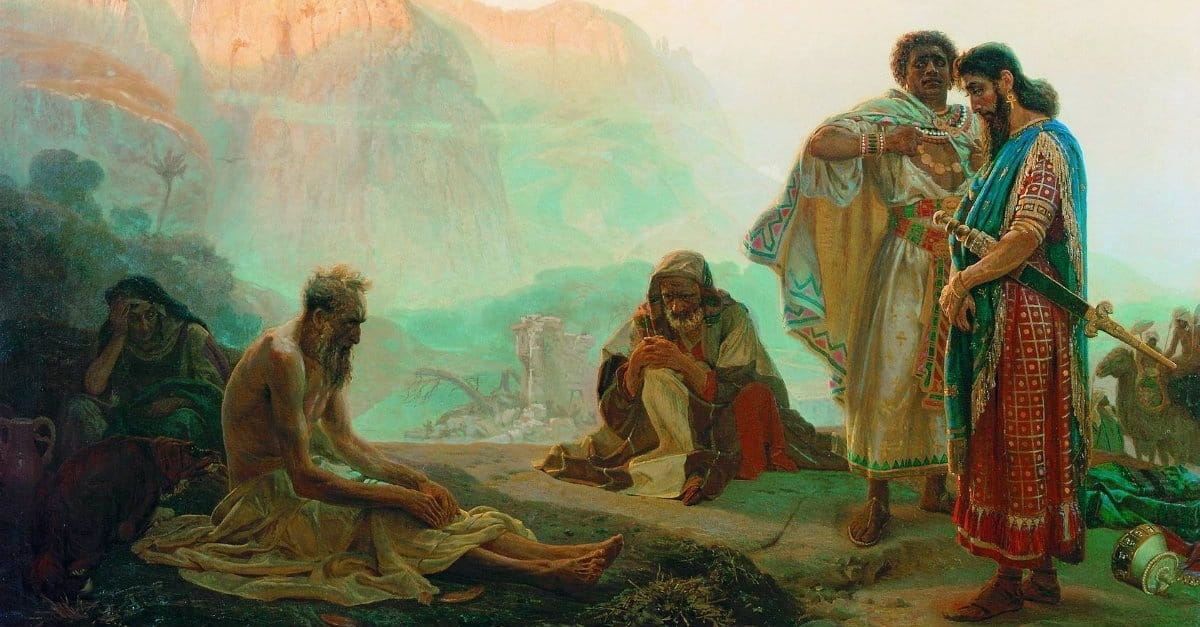
The book of Job is not an easy or feel-good read. The subject matter is fairly heavy – about loss, grieving, suffering and God’s justice. But it’s also about the value of community, about faith and about wisdom. It may actually be a good book for our current times as we struggle with some of these same issues in the midst of our extended and worsening Covid lockdown.
While me may at times ponder the themes of suffering and loss and the presence/absence of God in a general or abstract way, we experience suffering and loss in specific and personal ways – the loss of a loved one, the loss of a job or a dream, the mental suffering caused by lockdowns or the physical suffering caused by sickness. Each person’s experience of suffering is unique. Just as it is for Job.
As Job suffers loss after loss, he maintains his faith in God, who is seen to bring blessing but who may also allow trouble to afflict us. As Job struggles on with a painful disease, three friends come to see him. They too are affected and distressed by Job’s suffering and sit with him, silently, for several days. We might learn from this initial approach taken by the three friends that our presence at such a time is probably more important than any words we may speak. Our presence, our empathy and perhaps gentle touch are appropriate responses – rather than our judgments or solutions to the person’s problems. May we carry this wisdom with us when we encounter people who are suffering.
Posted: Friday, October 1, 2021 by Peter Mallen Tags: Job 1:1-2:13Acting wisely?

In a few weeks’ time, the nations of the world will gather in Glasgow in Scotland for the CoP26 UN sponsored climate change conference. (CoP is Conference of the Parties, when the 197 nations of the UN gather to discuss climate change. This year’s meeting is the 26th such meeting since 1995). This conference is considered the most significant since Paris in 2015 and will set the direction and framework for climate action for the next ten years or so. Climate scientists have indicated in the latest Intergovernmental Panel on Climate Change report that this period is crucial if we have any chance of limiting global warming to under 2OC.
Australia is considered a laggard on climate change, along with Saudi Arabia, Iran and Brazil. This is because we have no commitment to reach net zero carbon emissions by 2050 and steadfastly boast that we are doing our fair share by a 26-28% reduction in emissions by 2030 compared to 2005. Note that most of this reduction – if achieved – will come from changes in land clearing (i.e. cutting down less forest than planned). Our reduction in actual CO2 emissions is forecast to be less than 5% by 2030. By contrast, most other developed countries propose to reduce their actual carbon emissions by 40-70% by 2030.
Is this a wise course of action for Australia to take? We are already the driest continent on earth (other than Antarctica), already suffer from major bushfires and flood damage from cyclones, and already experience extended and crippling droughts – all of which are expected to worsen considerably as the global climate continues to warm. So we are committing ourselves – as well as the rest of the world – to a dangerously warm future. The excuses trotted out by our Federal government are that they will not commit Australia to an open-ended program that could cost billions and cost jobs in coal mining. A detailed roadmap is needed to allow for accurate forecasts of likely costs. Yet this same government has just signed us up to a completely open-ended program to build nuclear powered submarines with no costing (except that it will be well north of $100 billion) and no timeframe and only a vague promise on jobs.
The book of James contrasts two types of wisdom – earthly and godly. Earthly wisdom is characterised by selfish ambition, boasting and lies, while godly wisdom is characterised by gentleness, peace and mercy. Here peace refers to the Hebrew concept of shalom, where every person and every part of creation knows their place and enjoys the blessing of living a healthy and fruitful life. It seems that Australia is choosing the way of earthly wisdom – recklessly ignoring the warnings of climate scientists and foolishly locking in a destructive future for our planet. Pray for a late change of heart and the setting of a realistic but ambitious target to reduce our emissions.
Posted: Thursday, September 23, 2021 by Peter Mallen Tags: James 3:13-18Wisdom from planet earth

The Season of Creation focus this week is on ecology (oikologia, literally study of the house). As a scientific discipline, ecology explores the relationships and connections between living organisms – including humans – and their physical environment. Humanity of course has significantly altered the environment of many creatures through agriculture, forestry, commercial scale fishing and creeping urbanisation. Many species are under threat as their habitat shrinks or is destroyed. Other species are struggling to adapt to climate change (e.g. the coral reefs of the world as the ocean warms).
English poet and Dean of St Pauls cathedral, John Donne, famously wrote that ‘no man is an island, entire of itself’. He was speaking of the deep connections between all of humanity, so that the suffering or death of even a single person affects the whole. Likewise there are deep and sometimes mysterious connections and inter-dependence between all living creatures. As part of the created order, and especially given our call to care for creation, humanity is integrally connected with the health and well-being of all creation.
If we are to turn around the widespread threats facing the planet, we need wisdom as well as the will to act. The book of Proverbs suggests that God is ultimately the source of true wisdom, but there is much to be gained from close observation of how various creatures live and co-operate. There is also much wisdom to be gained from listening to indigenous people who have cared for creation for millennia. They would tell us to listen to creation itself and to respect our plant and animal neighbours with whom we share the earth. Covid has given us the time and space to slow down and explore the environment close to where we live. What are we seeing? What are we hearing? What wisdom are we discerning?
Posted: Friday, September 17, 2021 by Peter Mallen Tags: Proverbs 1:20-33, Proverbs 30:24-28What’s unusual about God’s ‘economy’?
The economy is what most politicians and business leaders seem to focus their attention on, even and especially during these Covid times. While daily press conferences may focus on case numbers and hospitalisation rates, the push to get people vaccinated and ‘the economy’ opened up again form the back story. It’s clear from the Prime Minister’s language that he wants the States to stop lockdowns as soon as possible … because he wants the economy to be buzzing along when he calls the Federal election early next year.
It may surprise you to know that the New Testament speaks several times about God’s economy (oikonomia) and about being good managers (oikonomos) or economists of God’s resources. These Greek terms refer to managing various aspects of a household, including its finances. But when these terms are linked to God’s provision and God’s values, it becomes clear that God’s economy operates quite differently to the commercial economy that we are used to.
God’s economy is built on grace and generosity, where all have enough and all are treated equally whether or not they ‘work’ equal hours (as in the parable of the vineyard workers). God’s economy encourages us to build up treasure in heaven – rather than in our bank accounts – by loving our neighbour. In this Season of Creation it is helpful to think about our neighbours broadly – and to include our plant neighbours, animal neighbours and bird neighbours (as indigenous Christian leaders encourage us to do). God’s economy is also heavily focused on the poor and encourages positive discrimination for the poor, confirming that the economy of God’s kingdom is remarkably counter cultural. There are not winners and losers in God’s economy, nor rich and poor, and caring for creation is not an afterthought. Instead, there is a just home for all of God’s creatures, both human and non-human.
Posted: Friday, September 10, 2021 by Peter Mallen Tags: James 2:1-8, Matt 6:19-21, Matt 6:25-33Welcome to the season of creation

This is the time of year when Christians are invited to celebrate the season of creation. It seems appropriate to be doing this at the start of spring when flowers are blooming and all of creation seems somehow more alive. For the Wurundjeri people of Melbourne this was season is called Poorneet, the tadpole season, the season of plentiful food from lilies, orchids and yam daisies.
It also seems appropriate to be remembering the groanings of creation in the lead-up to the COP26 climate conference in Glasgow which starts at the end of October. While much media attention remains focused on the Covid pandemic, the threat of climate change poses a larger threat to the whole of creation as habitats warm and become inhospitable to many species. While fossil fuel companies direct our attention to the small changes we can make to our own individual lives (which collectively are helpful), we will not reach sustainable levels of emissions without major changes at a government level.
The creation stories recorded in the book of Genesis set the scene for the unfolding story of God, creation and humanity. In these stories, humanity is given a vocation to care for and tend creation as God’s representative. If we take our cue from God’s gracious providence, as described in Psalm 104, the call is not to dominate over or to destroy creation but rather to care for it in such a way that each part of creation can thrive. There is much we can learn from our indigenous brothers and sisters in this respect. But we must also recognise that use of fossil fuels (e.g. coal, oil, gas) must drastically reduce – and soon – to give creation a fighting chance. As some of the posters at the School Strike for Climate rallies point out, there is no Planet B.
Posted: Thursday, September 2, 2021 by Peter Mallen Tags: Genesis 2:4-15, Psalm 104Australia’s hardening attitude towards refugees

This week we have seen Australia scrambling to evacuate our citizens from Kabul in Afghanistan along with interpreters and security staff who helped Australians during the last 20 years. It’s clearly been a difficult and dangerous task to undertake in the current circumstances but our government’s tardiness and flip-flops on visas haven’t helped. Our offer to take in 3,000 refugees from Afghanistan sounds reasonable at first blush, but not when compared to historical precedents.
After World War 2, Australia accepted some 100,000 refugees/migrants from Europe every year for 15 years. After the Vietnam War ended, we took 8,000 refugees per year for 10 or more years. We accepted 40,000 refugees from Kosovo and 12,000 from Syria. There is a trend here. Australia has steadily become less compassionate and less generous. Our language reflects our hardening actions. Asylum seekers are now ‘illegals’ and our Immigration Department has become Australian Border Force. We claim to be the land of the fair go but we have closed our hearts to the needs of the vulnerable seeking hope and a new life in our midst. I have witnessed first-hand the effects of our cruel policy of indefinite detention of asylum seekers. Yet Scripture is unambiguous. We are called to love the foreigner in our midst, because God’s people have known what it’s like to be foreigners and to be oppressed. Jesus calls us to feed the hungry and to welcome the stranger. Sadly, these Scriptures are ignored by our Christian Prime Minister who himself oversaw the ring of steel placed around Australia in 2014, supposedly to protect our borders (who remembers Operation Sovereign Borders?). Please pray that our political leaders would become more compassionate and that the Australians who vote for them might also be more empathetic and kind to the plight of refugees.
Posted: Friday, August 27, 2021 by Peter Mallen Tags: Deut 10:12-22, Matt 25:31-46Enduring the battle with evil

This last week has been pretty grim on the news front. The spread of Covid seems to be getting away from us in Australia, especially in NSW but also in Victoria and ACT. Lockdowns are being extended and made more restrictive. The collapse of the Afghan government and the mad scramble to evacuate people from that country are deeply troubling on many levels. Good news seems to be rather thin on the ground at the moment.
The closing remarks of Paul’s letter to the Ephesian church are a reminder that we live in an often dark world and we are engaged in a battle against evil whether we like it or not (which is not to say that Covid in itself is evil, although some of the actions of the Taliban in Afghanistan appear to be evil). Paul is not trying to alarm the church, but rather is being fairly practical. He writes that there are evil forces at work that will try to tempt, deceive or manipulate us in ways that will undermine or threaten our faith. So we must resist these forces and stand firm. This call is consistent with the line in the Lord’s Prayer ‘Save us from the time of trial and deliver us from evil’.
The way to stand firm is to arm ourselves – inwardly – with the character of God – with truth, righteousness, peace, faith and the hope of salvation. We’re also to immerse ourselves in God’s word – the Scriptures – and to pray as we are led by God’s Spirit. If we follow these suggestions it does not mean that evil will cease to buffet our lives … but we will have our focus where it needs to be – on God and what God is able to do in us and through us. Then we can be strong and able to withstand what comes in our direction.
Posted: Friday, August 20, 2021 by Peter Mallen Tags: Ephesians 6:10-24Living wisely
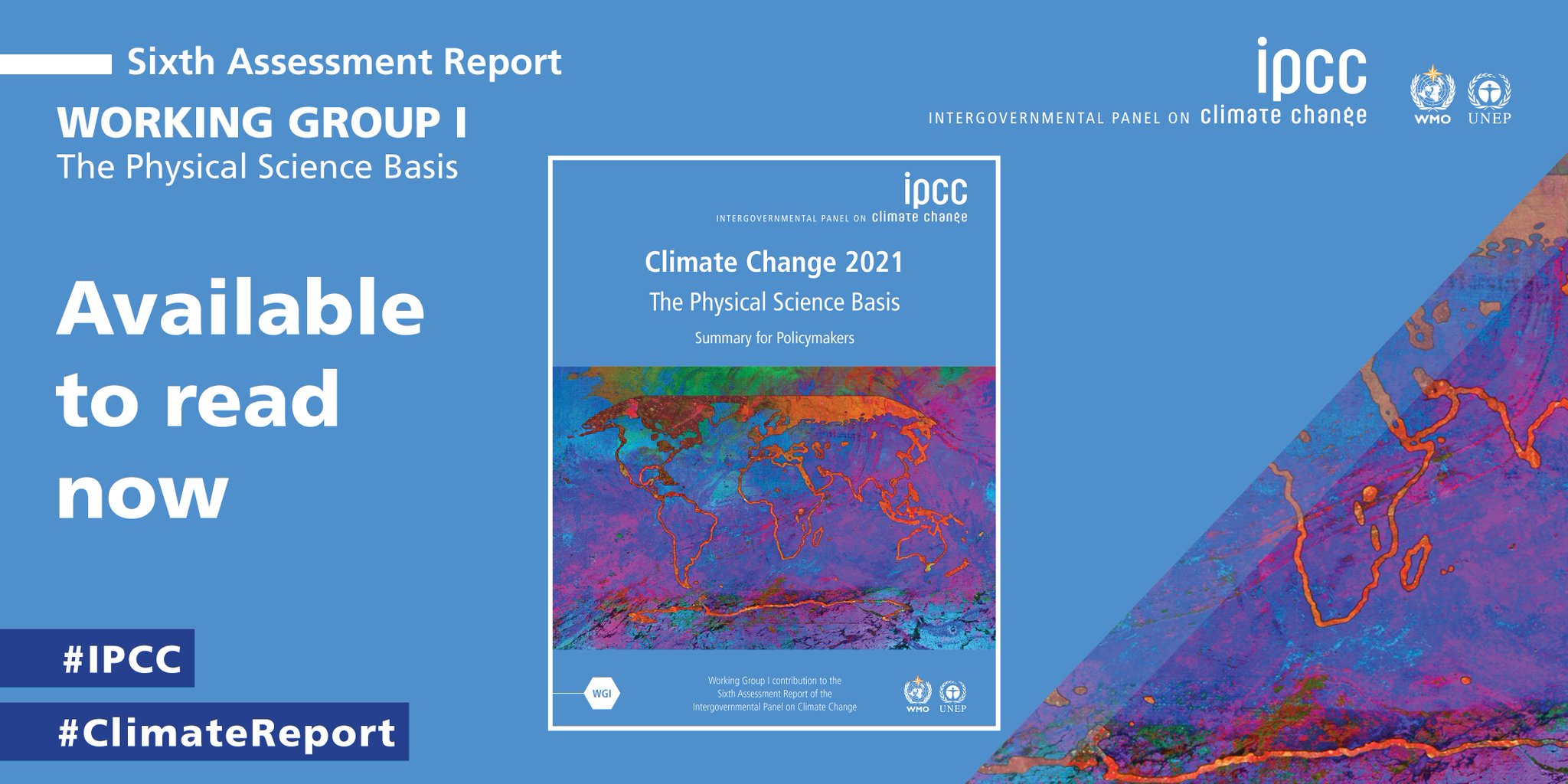
As we endure our sixth Covid lockdown in 18 months, many of us are feeling somewhat fatigued and frustrated. Why does it keep happening? When will life ever return to ‘normal’? In Paul’s letter to the Ephesians he calls on followers of Jesus to make the most of every opportunity and to live wisely. But what does this look like in practice?
We’ve had a couple of glaring examples this week of the opposite – how to live unwisely. The first came from Liberal MP George Christensen who gave an impassioned plea for Covid lockdowns and other health measures to be abandoned, labelling them as ‘madness’. While it’s true that lockdowns are costly and curtail our freedoms, the evidence from Australia and elsewhere in the world is that the alternative – just letting the virus rip – is far, far worse both in terms of lives lost and the economic impact. Luckily for our country, State Government leaders have wisely avoided the path suggested by Christensen.
The second example has been the Government’s quick response to the newly released IPCC (Intergovernmental Panel on Climate Change) report. This report paints a fairly gloomy outlook for the global climate with temperatures predicted to rise by at least 2 degC over pre-industrial temperatures, locking the world into more intense bushfire events, cyclones, flooding and the like. The time to act to prevent the worst effects is right now with reductions in carbon emissions of around 50% needed by 2030. Our government’s predictable response is to maintain its hope that future technology can solve the problem while refusing to do anything substantial to reduce emissions in the short or medium term. While governments have generally been praised for following the advice of scientists in how to handle the Covid pandemic, they casually ignore the advice of climate scientists. This seems a very unwise path to follow. How about Paul’s advice on how to live wisely? At first glance it seems simplistic and to those outside the church probably ridiculous. The advice – focus on worshipping God and living holy lives, whether in the church, in the home or in the workplace. Paul puts his finger on some important truths. If we want to live wisely we need to tune into God’s wisdom and God’s ways. These include putting people first, rather than profits, as Christensen would suggest. It also suggests that listening to scientists who have spent a lifetime observing the physical world – whether in the area of human health or the area of climate – would also be wise.
Posted: Thursday, August 12, 2021 by Peter Mallen Tags: Ephesians 5:15-6:9More lessons from the Olympic Games

The focus of the Olympic Games has shifted from the pool to athletics this week. There have also been finals in team sports and new events like BMX and skateboarding. There have been many highlights … medals for competitors as young as 13 (in the skateboarding) and as old as 62 (Andrew Hoy in equestrian) … Australian track athletes making it to their respective final … teams playing ever so well yet not quite winning.
One particular highlight came in the final of the men’s high jump competition where the two leading competitors, Mutaz Barshim from Qatar and Gianmarco Tamberi from Italy, both cleared 2.37 metres (or 7 ft 9 inches in imperial measurements). Both failed to clear the next height of 2.39 metres. They were offered a jump-off to determine the winner. Instead they asked if they could share the gold medal. Barshim said “I know for a fact that for the performance I did, I deserve that gold medal. He did the same thing, so I know he deserved that gold.” Tamberi said “Sharing this moment with a friend is even more beautiful ... It was just magical.” Two competitors, two friends, sharing the joy and sharing the spoils.
In Paul’s letter to the Ephesians, he encourages the community to speak the truth and to speak only words that are full of grace and useful for building up. The example of the two high jumpers and their words of grace for one another show how this can work in practice. Imagine how much more could be achieved in the political sphere if our politicians actually spoke the truth and stopped trying to score points off each other, and worked to build up rather than tear down. Paul’s advice is really so simple yet could make such a difference in our families, our churches and in the wider community.
Due to lockdown, worship this week will once again be on Zoom. Please contact the church office for the link.
Posted: Friday, August 6, 2021 by Peter Mallen Tags:Lessons from the Olympic Games

The Olympic Games have helped lift our spirits this week and provided a welcome distraction from the grim news elsewhere, especially the ongoing and worsening Covid situation in NSW. On one hand, it’s easy to be cynical about the parochial coverage of the Olympics and the emphasis on winning gold medals. On the other hand, I’ve noticed more attention on two other aspects this week.
First is the emphasis on teamwork, even for individual sports. All the athletes are part of a wider group of people helping prepare and sustain them. There are coaches, fitness trainers, physios, psychologists, teammates, family and friends all working behind the scenes. So while we focus our attention on the athlete in the spotlight, it’s actually much more about teamwork.
Second is a recognition about the importance of maturity. The mental side of sport has long been recognised, but we’ve seen athletes stay focused and calm in the heated moments, handle disappointment, setbacks and losing with grace, champions withdraw from their event due to mental stress, and others show great flexibility and adaptability. These are all signs of maturity for athletes who in the past have been raised with the motto that winning is everything.
The apostle Paul calls us to show similar attributes in our walk of faith. The goal, he writes, is for us to grow up and come to maturity, attaining to the full stature of Christ. But this goal is for the whole community to achieve, not for just a few individuals. So it involves teamwork and utilising every person’s gifts, working together for the common goal. Perhaps the athletes we see at the Olympics can inspire us to dream and achieve our goal.
Posted: Saturday, July 24, 2021 by Peter Mallen Tags: Ephesians 4:1-16Adopted into the family
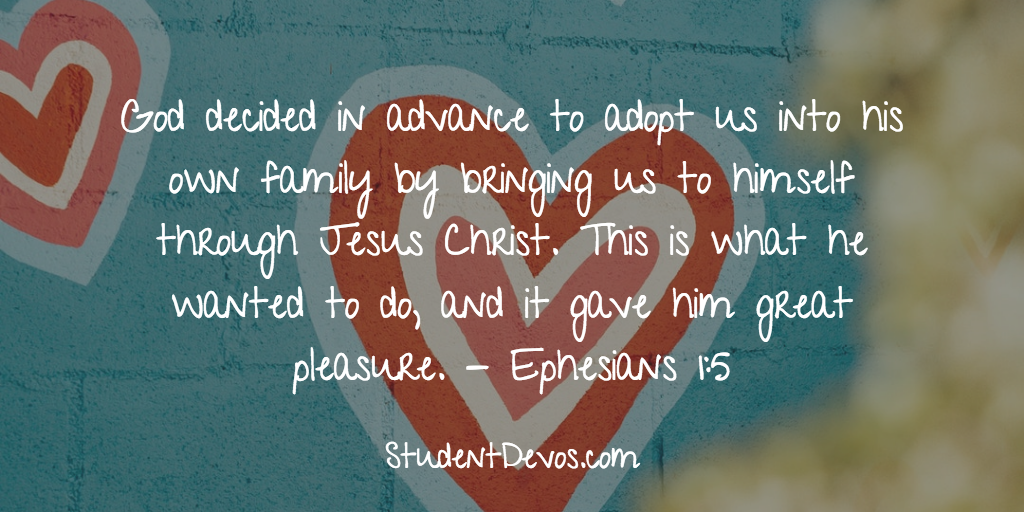
I wonder if there’s anyone in your family who was adopted? My grandmother Vera was adopted and her birth and early life were always a mystery, as records were not always kept or made available. Despite the uncertainty about her origins, Vera was always loved and was always part of the family.
In the letter to the Ephesians, Paul is writing to a community of Christians who are mostly Gentile, that is, non-Jews. He begins the letter with a grand prayer or poem that outlines the many blessings we have received from God through Jesus Christ. One of these blessings is to be adopted into God’s forever family and to be known as God’s children. For Paul, this is one of the great mysteries of the gospel message, that the privileges once bestowed on the Jewish people are now freely available to all. And one of the most significant of these privileges is to be considered God’s children. This honour is ours through grace, one of the key themes of this letter. We did not earn this privilege – rather it is a gift – along with forgiveness and acceptance. Grace is the unique aspect of Christian faith that no other religion offers. We don’t have to strive or become anxious about pleasing God – we are accepted as we are. But we are re-created in Christ to be people who want to follow God’s ways and embody God’s character of love and justice. We’re part of God’s family and so are called to reflect this in how we think about ourselves and in how we live.
Posted: Saturday, July 10, 2021 by Peter Mallen Tags: Ephesians 1:1-14, Ephesians 2:1-10The challenge of leading in the easy times
When it comes to leadership, is it more difficult to lead during times of crisis or when things are going well? Certainly the public scrutiny of leaders is high when times are tough … think of the focus on State and Federal government leaders during the Covid pandemic with their daily press conferences and rapidly changing health guidelines. Every comment and every decision is reported and analysed and awkward questions are asked. Tough decisions need to be made under real time pressure that won’t please lots of people.
Tough times don’t last forever, thankfully, and eventually easier times will return where there is less attention on leaders. These easier times allow focus on the important rather than the urgent, for leaders to be proactive rather than reactive. But I wonder if it’s actually harder to lead well when people aren’t watching so closely … since complacency can set in and decisions can be made by routine or habit.
King David was a strong and effective leader for tough times. He was a courageous and shrewd soldier. Yet his most glaring failures happened when he was taking some R&R time. While the army is off fighting Israel’s enemies, David is relaxing in Jerusalem. He spots a beautiful lady bathing and in quick succession, he desires her, enquires after her and brings her to the palace where he has sex with her. Was in consensual? We’re not told. More likely, it was a powerful and entitled man taking what he wanted. It gets worse. When the woman, Bathsheba, becomes pregnant, David conspires to have her husband killed in battle and he then takes Bathsheba as his wife.
So David dismally failed the challenge of leading in the easy times. He became distracted by seeking after selfish pleasure and lost his moral compass. His integrity failed when no one was watching. There is a lesson for all of us here. We all have weak spots where we can be tempted. It’s why there is a line in the Lord’s Prayer that says ‘save us from the time of trial and deliver us from evil’. May God give us strength to act righteously even when no one is looking – and grace when we do stumble and fall.
You can read this message here:
Leading in the easy and the tough times - 2021 July 4
Leaders and vision

One of the most challenging tasks of leaders is to articulate a vision for the future, communicate how we will get there and then to persuade people to follow. Our current crop of Federal Government leaders are fairly dismal at this task, whether providing a clear vision and goals for Covid vaccinations, or about tackling a longer term issue such as climate change. The latest mantra that Australia should reach zero carbon emissions as soon as possible and preferably by 2050 illustrates the point. It is not a vision that motivates anything, it has no plan for how to achieve the goal and it persuades no-one.
Compare this to King David and his vision to build up the city of Jerusalem including a temple, or house, for God. This was a fairly grand vision that sought to provide a central place for worship as well as uniting the tribes of Israel. (We’ll set aside David’s theology that believed God could be contained to a single place and a single building …). God in turn takes this vision and makes it grander still. God will instead build a house for David, an everlasting kingdom or dynasty to arise from his offspring. This vision sustained Israel for over 400 years until Jerusalem was destroyed by the Babylonians and the last king carted off into exile.
The vision lived on, however, for a new David, a Messiah, to raise up the tribes of Israel once more. Many people wondered if Jesus might be the hoped for Messiah. And Jesus did speak a lot about the kingdom, the kingdom of God, which was his central vision. This was not an earthly kingdom, however, with a king ruling on a throne in Jerusalem, but rather a kingdom that reigned in people’s hearts where they followed God’s ways of justice, compassion, forgiveness and mercy. This vision was simple and memorable and has inspired millions of Jesus’ followers down through the centuries.
Articulating a vision remains an important role for good leaders, but as Christians we already have a compelling and clear vision, given to us by Jesus, which is to build God’s kingdom through our witness, worship and service. It’s a vision that excites, motivates and guides what we do.
You can read more here:
Leading – mandate and vision - 2021 June 27
Leading when the going gets tough

I wonder if you’ve had to fight any giants recently? Or nearly drowned in a storm at sea? Probably not, yet these two well-known stories from Scripture – David and Goliath and Jesus calming a storm – have much they could teach us. In particular, as part of our series on leadership, these stories have some challenging insights.
Saul was king over Israel yet he – along with the rest of Israel’s army – is terrified by the physical size and presence of Goliath. He doesn’t know what to do. When David offers to fight Goliath, Saul cautions David but allows him to face Goliath anyway, alone. One might conclude that Saul demonstrates canny leadership, letting others fight his battles for him. Or one might conclude that Saul fails dismally in his role as leader and in his duty of care for David.
In the second story, the disciples are crossing Lake Galilee in a small boat at night along with Jesus. When a storm suddenly erupts they panic, and like Saul, do not know what to do. What is their leader, Jesus, doing meanwhile? He is fast asleep at the back of the boat. Is Jesus also being derelict in his leadership responsibilities? When the disciples wake Jesus, he takes charge of the situation, speaks to the waves and the wind, and everything becomes calm.
What might we learn about leadership from these two stories? Leaders will almost certainly face tough situations that they may well not know how to deal with. Both David and Jesus demonstrate an important lesson for Christian leaders. Rather than being paralysed by fear or relying on just our own resources, leaders seek out and trust in God’s provision and wisdom and then show courage by acting. When the going gets tough may we learn to do the same.
This message can be found here:
Leading when the going gets tough - 2021 June 20
How we choose leaders

It’s sometimes said that we get the government we deserve, meaning that if we elect a certain type of person then we shouldn’t be surprised when they act in certain predictable ways. Hence the actions of Donald Trump conform to the type of person that he is. Similarly with Scott Morrison given his background in marketing and spin, where appearance matters more than substance.
Both these leaders would claim to be Christian, which makes the actions of our Federal Government in dealing with a Tamil family from Biloela all the harder to fathom. Nades and Priya and their two girls Kopika and Tharunicaa were arrested in the middle of the night and placed in immigration detention in Melbourne over three years ago and were moved to Christmas Island detention nearly two years ago. What does the government’s treatment of the family over this period, including in the last several days, reveal about the heart of our Federal leaders?
As Samuel reflects on the challenges of choosing a new leader to be king over Israel, he notes that people tend to see only the outward attributes of a leader, whereas God looks at the heart – the place of both emotions and knowledge, wisdom and integrity in ancient thought. Samuel went against cultural practice in choosing David to be king, the youngest of eight brothers, confirming that God saw qualities in David beyond his youthful appearance and inexperience.
So how do we choose leaders? The image above suggests that we often have unspoken biases – regarding gender or age or outward abilities. We may not take the time in prayer to discern other attributes of a person, which may be even more important in the long run, such as the depth of their spirituality and inner life and wisdom to see things through God’s eyes. So perhaps we do get the leaders that we deserve if we don’t look beyond the surface to see what is in the heart of a person.
Posted: Thursday, June 10, 2021 by Peter Mallen Tags: 1 Samuel 16:1-13Why it’s hard to be a leader
Who would want to be a political leader at the moment? Whether it’s Deputy Premier James Merlino and Chief Health Officer Brett Sutton making decisions about Victoria’s fourth Covid lockdown, or Prime Minister Scott Morrison or Aged Care Minister Richard Colbeck trying to answer questions about the slow vaccine rollout in aged care settings. Leadership can be a hard and challenging role, especially when making decisions that will anger or upset people.

Being a leader has always been difficult. Just ask the prophet Samuel … or Moses before him. Samuel had the role of a Judge in Israel, settling disputes between people and acting as a messenger between God and the people. Towards the end of his life, the people rejected this model of leadership and demand that a king be appointed instead. It’s personal and it’s painful for Samuel. He knows how the thirst for power and greed can corrupt any leader and warns the people about the potential dangers a king will bring. But the people eventually get their way and Saul is chosen to be king.
A thousand years later, kingship is a failed institution in Israel, yet the people again long for a king, a Messiah to lead the people and throw off the oppressive yoke of the Romans. They wonder if Jesus just might be the hoped for Messiah, but he resists the temptation to go down that road. When two of his disciples jostle for positions of power under Jesus, he offers a startling critique of leadership by suggesting that those who want to lead must instead serve others.
It’s easy to criticise leaders. We think we could do a way better job. But could we? If we pause for a moment we may recognise that if we follow Jesus’ model for leadership, it will require us to let go of our own ambitions and desires and instead to serve the needs of others. This self-emptying and taking on the mantle of a servant is hard work, and our best efforts will still disappoint some people. So spare a thought for our leaders – whether in politics, or in the church or in the workplace – and remember that it’s a difficult role.
Posted: Friday, June 4, 2021 by Peter Mallen Tags: 1 Samuel 8:4-20, Mark 10:35-45The Holy Spirit – disturber of the peace

There is a scene very near the start of the first Lord of the Rings movie, The Fellowship of the Ring, when the hobbit Frodo Baggins meets up with Gandalf the wizard. According to Frodo, Gandalf has been officially labelled as a ‘disturber of the peace’. Based on the events of Pentecost and beyond, I wonder if this isn’t also a good description of the Holy Spirit.
When we think about God’s Spirit, we’re more likely to think in terms of the Spirit being our Comforter or Helper or the one who gives us peace. Those of us in the Uniting Church might also recall the Spirit coming upon Jesus at his baptism in the form of dove, a symbol that appears in the centre of the Uniting Church logo.
Yet even the dove symbol is also a red flame, reminding us of Pentecost where tongues of fire were seen to rest on each person as a sign of the coming of the Spirit. Fire may provide warmth on a cold night, but fires can also be wild and unpredictable, like the wind which is another symbol of the Spirit that features in the Pentecost story.
When the Spirit comes at Pentecost, the disciples are disturbed, their neighbours are disturbed and indeed the whole city is disturbed. Later in the book of Acts, some Christian missionaries are accused of turning the world upside down. It seems to me that in Luke’s telling of the story of the emerging Christian movement, the Spirit stirs and disturbs and sends people out much more than comforts. I wonder if that is why we are cautious to embrace this day more fully and the ramifications for what it might mean for our mostly comfortable life as the church. Are we prepared to be disturbed and shaken out of our apathy?
Posted: Saturday, May 22, 2021 by Peter Mallen Tags: Acts 2:1-41Jesus prays for us

This week the church celebrated Ascension Day, the day when we remember the ascension of Jesus to be with God. For the disciples it marked their final physical separation from Jesus and one imagines it was a day of mixed emotions. Before leaving, Jesus had prepared the disciples for his departure as best he could with the promise that the Holy Spirit would come and dwell among and within them and also praying for them and for future disciples like us.
This prayer of Jesus, as recorded in John’s Gospel, gives us a rare insight into how and what Jesus prayed. It is an intimate prayer to the Father but also quite bold. Jesus asks three things of God for disciples – that they be protected from the evil one, that they experience the same close relationship with God enjoyed by Jesus and that they be kept safe by the truth (especially about God’s love for us and about God sending Jesus to us). I wonder what comfort you draw knowing that Jesus still lives in God’s presence and that he prays for you. Given that Jesus experienced some of the best and the worst that humanity could throw at him during his life, he knows what it is to live a human life. He knows the joys and challenges of our life. And he promises to be with us. So when life gets tough, it’s good to remember these truths and these promises.
Posted: Saturday, May 15, 2021 by Peter Mallen Tags: Acts 1:1-14, John 17:1-24The mothering nature of God
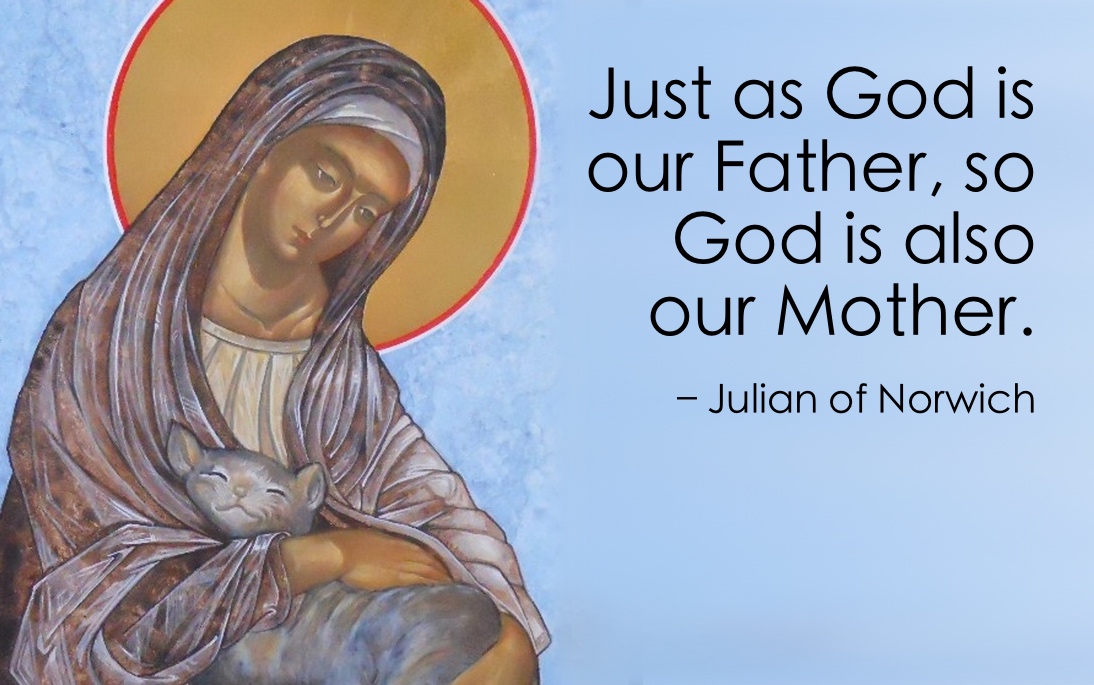
This Sunday we celebrate Mother’s Day in Australia, the day in the year when we pause to acknowledge and honour mothers and other significant women in our lives. These are the people who brought us into the world, who (in most cases) loved and nurtured us and guided us through life. Being a Mum is not a one day in the year role, of course, but more like a 365 days a year role that lasts for a lifetime.
What can mothers and mothering teach us about God, who is nearly always imagined with masculine imagery in the Bible (e.g. Father, Lord, King) and always described with male pronouns? Just occasionally we catch a glimpse of another side of God’s nature, a maternal side if you like – God who brings us to new birth, who nurtures and cares for us like a mother. In the wisdom tradition in the Bible (e.g. book of Proverbs), wisdom is depicted as a woman teaching others about life, justice and mercy, a tradition that appears to have profoundly shaped the ministry and outlook of Jesus and which was probably taught to him by his mother, Mary.
In Genesis we are told that God created humanity in his own image as male and female. So if humanity reflects the image of God, traits or characteristics that we might think of more in feminine terms help us to a fuller appreciation of God’s character – things like compassion, empathy, gentleness. So this Mother’s day let us celebrate those who do and have Mother-ed us (including those who struggle with being a Mum or who were never able to be a Mum or who have a difficult relationship with their mother or children). And let us also reflect how mothers help us imagine what God is like.
Posted: Saturday, May 8, 2021 by Peter Mallen Tags: Genesis 1:27, Isaiah 49:13-18Life after Jesus

The very first thing Jesus did during his ministry was to call several people to be his followers or disciples. They were to spend time with Jesus and watch and learn from him. One of the very last things that Jesus does is instruct these followers how they are to live and what their priorities are to be when he is no longer with them. Each of the Gospel accounts records these guidelines in some form.
In John’s Gospel these guidelines take the form of a long farewell address that occupies chapters 13-17 of this book. There are several themes that emerge including the call to love one another, the promise of another helper or advocate, the Holy Spirit, to guide and encouragement the community, the call to remain connected with Jesus, the true vine, and the warning that the road ahead will not be easy but rather may well include rejection and persecution. If the community of Jesus’ followers will take on board these key messages they will experience the peace and joy of Jesus’ ongoing presence with them, through God’s Spirit. These chapters are written to people like us, who live in the time after Jesus. Clearly some of these guidelines are easier to follow than others, but all are needed to give a realistic picture of what it is like to follow the way of Jesus. I wonder which of these guidelines comes more easily to you and which you find more troublesome. Do we get to pick and choose?
Posted: Friday, April 30, 2021 by Peter Mallen Tags: John 15:18-16:15Remembering ANZAC Day

This Sunday we commemorate ANZAC Day, the day that our Prime Minister Scott Morrison calls ‘the most sacred day of the year’. The government is so keen to promote this day that it has sent a coloured flyer to every household in the country using the above image. In the flyer we are told to remember the courage and sacrifice of those who have served in the Australian Defence Force and how we can commemorate the day at home.
While it is helpful to remember this part of our history – including the large personal cost to individuals, families and communities – the approach taken by the government appears quite hypocritical, parochial and sexist. The photo used, for instance, is supposed to prompt our thinking about the soldiers who have fought and died but features only white males. The flag shown is the Union Jack and is a reminder that the wars Australia has fought in have been instigated by empires on the other side of the world – whether British, American, German or Japanese – and have had little to do with our country (e.g. recent wars in Iraq and Afghanistan). We seem to enter these conflicts at the behest of others and without clear goals of what we are actually trying to achieve.
We are told in the ANZAC Day flyer that these wars have been fought to protect our freedom and democracy. Yet when people flee from conflicts and wars overseas and seek freedom and safety within our democracy, we lock them up like criminals for years and years and deny them the very freedom that we say we value so highly. Likewise we choose to ignore the wars fought on our own soil by indigenous people who died trying to protect their country and way of life from the invading British, our ancestors. So why are some soldiers held up as heroes to be worshipped and others completely overlooked? Perhaps it’s because history is very messy and doesn’t fit easily into the simplistic ANZAC myth.
As Christians our values are shaped by a very different story. While the heart of the gospel story includes the service, suffering and death of Jesus – to which the ANZAC myth is often linked – the wider gospel story condemns violence (as Jesus notes in Matthew 26:52 ‘all who take up the sword will die by the sword’) and calls us instead to be peacemakers (Matt 5:9). The prophetic scriptures of Israel such as Micah 4:1-4 look forward to the nations learning the ways of God – the ways of peace and justice – and turning their spears into pruning hooks and swords into ploughs.
So on ANZAC Day, let us indeed remember the service and courage of those who have fought in the Australian Defence Force, but let us also remember the subversive call of Jesus to be peacemakers rather than to engage in conflict and war. Let us be careful to distinguish between a government supported propagation of a national myth and the reality that our history is far more ambiguous and dark.
Download the message here:
Stay connected - 2021 April 25
Encountering the risen Jesus

Now that Easter has passed and school holidays are coming to an end, many of us are thinking about getting back to life as usual with all its daily challenges. It was similar for the first followers of Jesus – but with one major difference. They were dealing with disappointment and despair, as all their hopes of a new movement centred around Jesus had been dashed.
This is the situation facing two dejected disciples as they head back home after the devastating events of Good Friday. Jesus joins them on the road and they get into conversation but somehow don’t recognise Jesus. They talk about what has happened, explore the Scriptures and later share a meal with their new friend. Suddenly their eyes are opened and they recognise that they have spent the day with Jesus. Their hearts are stirred and they want to share their insight with others.
I wonder if we ever experience something similar? We are going about our business and a stranger joins us and asks how we are doing. We pour out our heart to this person and they then leave and we don’t see them again. Yet in the encounter we have received a precious gift and perhaps encountered the presence of the risen Jesus with us. The heart of this story is that Jesus meets us where we are – on the road, in our homes, in our struggles and in our joys. Jesus meets us in all the messiness of our lives, but also as we open the Scriptures and share a meal with others, especially Communion. Easter is not an event that has occurred once in history but rather it’s an adventure with the risen Jesus that has begun. It’s a path on which we walk, teeming with the promise of surprising new life.
Download the message here:
The continuing story of Jesus - 2021 April 18
A new day

In our Australian culture, Easter is often celebrated by going away for the weekend and by over indulgence in chocolate Easter eggs. For those among us who remember the day by going to church, we expect there to be plenty of Hallelujahs and plenty of joy as we recall that Jesus rose from the grave to new and everlasting life.
But the very first Easter Sunday, at least according to Mark’s quite short account, was a different sort of day altogether. The male disciples are huddled inside and struggling with a range of emotions including shock, grief and probably shame. Their dreams for the future have all come shattering down. The women appear more stoical and three of them set off for the tomb where Jesus’ body was laid, in order to anoint his body with spices.
At the tomb the large stone blocking the entrance has been rolled away and a figure dressed in white (an angel?) tells them that Jesus has been raised and is going ahead of them to Galilee where they will see him. The women’s emotions are intense and mostly negative ranging from great alarm and fear to utter astonishment and confusion. They flee from the tomb and talk to no-one. And that is the end of Mark’s Gospel. No hallelujahs. No joy. No sign of the risen Jesus. No celebration.
The account suggests that Jesus’ resurrection was completely unexpected, despite his having told them several times that he would rise again. The resurrection was mind boggling and amazing and terrifying all at the same time. The disciples would take a little time to adjust to the news, but this unexpected day turned their world upside down. Life had triumphed over death, light over darkness and love over hate.
We tend to be a little blasé about the message of Easter, perhaps because we knew all along how the story would end. So our challenge is to sit with the story and try to recapture some of its raw emotion and power to change our view of life and our place in the world. It’s a whole new day, if we just have eyes of faith to see it.
Posted: Saturday, April 3, 2021 by Peter Mallen Tags: Mark 16:1-8, Ps 118:14-24The passion and death of Jesus

Good Friday is often considered to be the most holy day in the Christian calendar as we gather to hear once more the story of Jesus’ rejection, betrayal, suffering and death. At a human level it is a most distressing story of corruption and callous cruelty. At a spiritual level it is also a disturbing story as Jesus cries out from the cross ‘My God, my God, why have you forsaken me?’.
Three brief thoughts as we contemplate the events of Good Friday:
First is its inevitability. Jesus has been purposefully heading to Jerusalem for this final showdown with the Jewish authorities. During his final week in Jerusalem, Jesus directly confronts the temple authorities for their corruption and unfaithful leadership. Simmering animosity reaches boiling point and their actions are predictable. Jesus has known for a long time what his likely end will be.
Second is Jesus’ innocence. Neither the Jewish Council nor Pilate can find just cause to condemn Jesus. The priests feel threatened and Pilate wants to maintain civil order, but Jesus is clearly portrayed as innocent of any charge deserving death. This line of argument will be important for the emerging Christian community to show that Jesus was far from criminal in his actions.
Third is Jesus’ isolation. He has no friends among the priests and scribes and as soon as the heat comes on, the disciples all flee, leaving Jesus alone. In the garden of Gethsemane, Jesus’ anguished prayer that he might be spared from this hour of suffering receives no response from God. In his humanity and in his relationship with God, Jesus feels completely cut off and alone, hence his cry of abandonment from the cross.
Like the women watching on from a distance, we can only watch the unfolding events and wonder why Jesus’ life and ministry must end this way. Yes it seems inevitable, but couldn’t God intervene? Yes, Jesus is innocent so why does justice not prevail? Yes, Jesus is isolated but must those with power always prevail? There is profound mystery here, as our questions remain unanswered. As Jesus experiences the worst that humanity can inflict, where is God?
The answer to that deep question must wait until Easter Sunday to be answered.
Download the service here:
The passion and death of Jesus - 2 April 2021
Jesus in Jerusalem

Palm Sunday is here, the day we remember and celebrate Jesus’ arrival in Jerusalem and the entry point into Holy Week that culminates on Easter Sunday. Mark tells us that many people spread their cloaks and branches on the ground and welcomed Jesus with great enthusiasm. What Mark doesn’t tell us is the response of the religious authorities, the other opponents of Jesus or the general population of Jerusalem.
The following episodes tell us plenty, though, as Jesus confronts the temple authorities through both word and action, while various groups try to trap him by asking controversial questions. Through it all, Jesus appears to be firmly in control and well aware of what is happening around him.
I wonder what this day means for you. Is it a day to mark what is often labelled Jesus’ triumphant entry to Jerusalem? Is it a day to attend a justice rally, inspired by Jesus’ confrontation of unjust practices at the temple? Or is it a day to ponder who Jesus is and what he might be calling you to do?
Download the message here:
Jesus in Jerusalem - 2021 March 28
On the road with Jesus

I wonder what topics of conversation fill up your time when you go on a road trip with your spouse or with friends. Do you pass the time talking about the latest news on Facebook or delve into deeper topics? In our Gospel reading this week from Mark, Jesus and the disciples are on an eventful road trip that will end up in Jerusalem on Palm Sunday.
We know that Jesus was thinking about the betrayal and rejection and death that awaited him there, because he keeps reminding the disciples of this probable turn of events, although they don’t seem capable of hearing this message. Meanwhile, what are they talking about on the road? Who will be remembered as the greatest among them and who will get the positions of power alongside King Jesus in the coming kingdom of God.
Jesus offers them some hard truths. To be truly great, a person needs to learn about serving others. Jesus then shares that his life and his role as Messiah are all about serving, and even giving his life as a ransom payment to free others. While the world encourages us towards selfishness and looking after ourselves first, Jesus asks us to go in the opposite direction and serve others first. Are you ready to adopt this upside down approach to greatness? Or if you already live in this way, what gentle wisdom do you have to share with others?
Download the message here:
The cost of discipleship - 2021 March 21
Following a suffering messiah

The first half of Mark’s Gospel is built around answering the question of ‘Who is Jesus?’. So we are introduced to Jesus the teacher, Jesus the healer, Jesus the one who has power over unclean spirits and even storms, Jesus who feeds large crowds. These various portraits come to a head when Jesus asks the disciples straight out who they think he is. While popular opinion views Jesus as a prophet, Peter correctly identifies Jesus as the Messiah or King (or Christ in Greek).
The words have barely left Peter’s lips when Jesus begins to speak about the suffering, rejection and death that awaits him. None of this was expected for Israel’s Messiah who was usually seen as a powerful conquering hero. Jesus then makes a bad situation worse by stating that anyone who wishes to follow him must be prepared to walk a similar path of suffering. This call to costly discipleship doesn’t sit well with our generation. The advertising industry makes its money by persuading us that what we really need is greater comfort and more fun, which will be ours if we just buy a particular product or service. So it remains as radical – and uncomfortable – today as it was in Jesus’ day to own the fact that we follow a suffering messiah who calls us to a costly following.
Download the message here:
Following a suffering messiah - 2021 March 14
Who is acceptable to God?

In the Jewish world of Jesus’ day, one of the hot topics was who is and who is not acceptable to God. Various Jewish groups such as the Pharisees and the Essenes (the community that lived near the Dead Sea and who was responsible for the Dead Sea Scrolls) had strong views on this. Each group drew tight boundaries around who is acceptable and what conditions must be met to make one acceptable. We see this thinking at work when the Pharisees accuse Jesus’ disciples of not observing the ‘correct’ method of washing hands before meals.
But it seems that even Jesus had his prejudices. When a Gentile (i.e. non-Jewish) woman approaches him for help, his first impulse is to ignore her request and push her away. Her wit and perseverance win out and change his mind, as Jesus learns an important lesson on who is acceptable to God.
As Christians we hold that every person is acceptable to God, whatever their race, religion, gender or status. But as I look around at many church congregations, including our own, I wonder how well we live out this open welcome in reality. Whether intended or not, we easily erect barriers that make some people feel unwelcome. What might need to change for us to be a community that reflects the amazing and life-giving reality that everyone is acceptable to God?
Download the message here:
Jesus in Gentile territory - 2021 March 7
Ministry along with Jesus
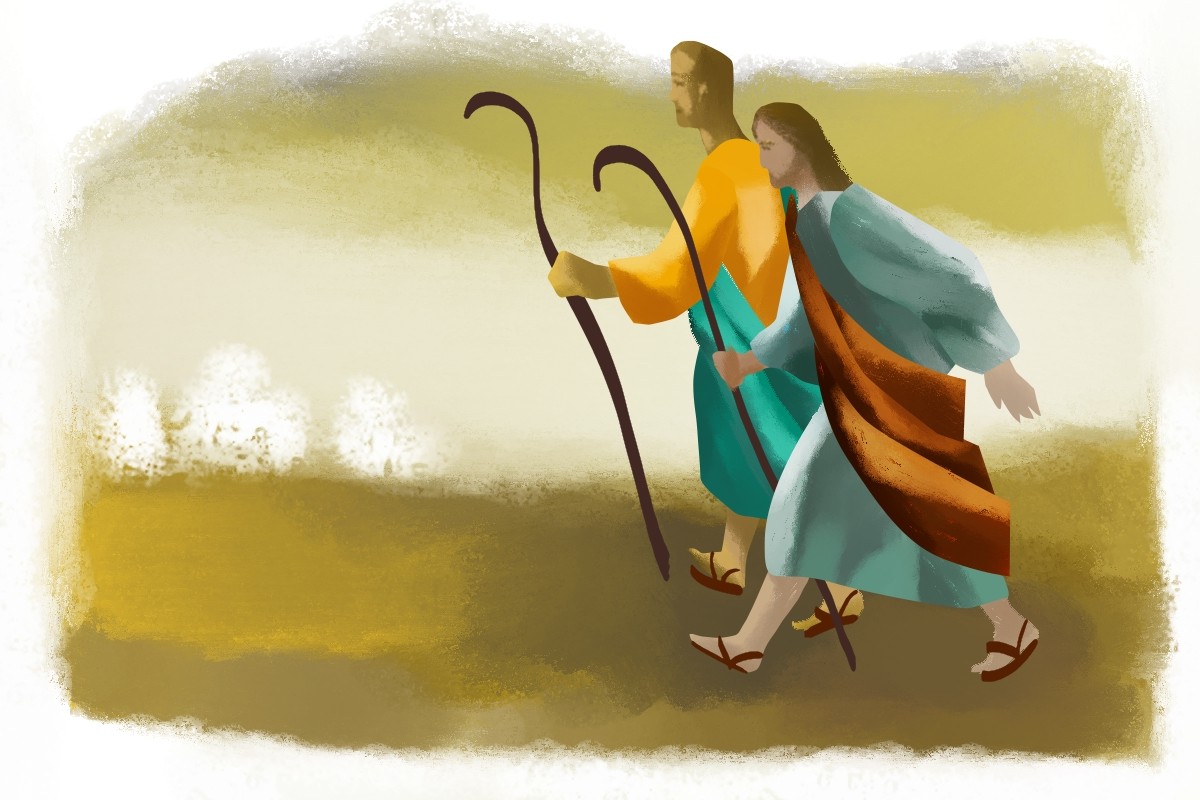
There are many ways that we can train people to take on new tasks or fill a responsibility. We might take the approach of a parent, a classroom teacher, an online educator or a coach. The way that Jesus trained his disciples seems closest to what we might term a traditional apprenticeship model. The disciples first spent a lot of time with Jesus observing both his teaching and his actions, and then Jesus sent them out in pairs to extend his ministry in new places (Mark 6:7-13). They are tasked with proclaiming a message of repentance, healing the sick and casting out unclean spirits – the same ministries that have occupied Jesus.
The key instructions they are given are to go out together in pairs, to travel light and to rely on the hospitality of others. The team ministry approach makes sense to us as we can share the gifts we have and benefit from the encouragement and support of at least one other person. Jesus’ instruction to travel light – no money, no spare clothing, no food – sits less easily with us. Rather than being independent, it means reliance on others and also reliant on God. The third aspect is going out to people where they are and relying on them for hospitality. This is often the opposite to our approach of inviting people to share our space with our rules.
It seems that the disciples were quite successful in extending and replicating Jesus’ ministry. They had learned well from Jesus. How would we fare in following Jesus’ instructions for mission and ministry? Are we prepared to travel light, go to where the needs are and then rely on the hospitality of others? If not, what might have to change or what might we need to let go of?
Download the message here:
Jesus ministry expands - 2021 February 28
Jesus and the kingdom of God

Jesus was known as a teacher and healer. Surprisingly, his favourite teaching topic (based on the evidence of the Gospel accounts we have) was not love and was certainly not the value or purpose of his death. Rather Jesus’ favoured topic was the kingdom of God. This was the ‘good news’ message that Jesus both announced and demonstrated in his actions.
But what did Jesus mean by the ‘kingdom of God’ and why don’t we spend more of our time thinking about what was central for Jesus? The kingdom of God was based on the idea that God is ultimately in charge and God reigns (or carries out the role of a ruler) wherever people acknowledge God’s goodness, power, inclusiveness and love and seek to live by God’s ways. For Jesus this meant freeing people from sickness or other oppressions, restoring them to community and bringing people life in all its fullness.
In our day, as in the time of Jesus, we have a daily choice in how we will live and how we will relate to others, whether to bring life and hope and wholeness or whether to live in a way where fear or selfishness rules our lives. When we focus too narrowly on the needs and activities of our own church community, we run the risk of missing Jesus’ bigger call to build the kingdom of God.
Download the message here:
Jesus and the kingdom of God - 2021 February 21
A day in the life of Jesus

I wonder what fills your typical day. Work? Volunteering? Catching up with friends or family? Minding grandchildren? Housework and preparing meals? I wonder also where God fits into your day. A prayer at the start and end of the day or before meals? An intentional time of reading the Scriptures and meditating on them?
In the first chapter of Mark’s Gospel we are given a glimpse of a typical day for Jesus. It’s fairly breathless activity from morning until evening as Jesus teaches, heals, confronts unclean spirits, heals some more and plans his next move. Somewhere in the busy schedule there must be time for eating and there is definitely a time for prayer and solitude. In other words there is both action and reflection, doing and connecting with God … which is a good model for our lives.
As followers of Jesus, are we called to emulate Jesus’ busy schedule of speaking and healing (and what might this look like in our context)? In this passage from Mark, we are offered both positive and negative examples of what it means to be a disciple. Negatively, we are offered the example of the male disciples who seem to want to organize and bend Jesus to their own program of ministry, which Jesus resists. Positively, we are shown the example of Peter’s mother-in-law who serves and offers hospitality. Our first response may be to dismiss this as first century gender stereotyping. But the same word for serving (diakoneo) is later used by Jesus to summarise his own mission (Mark 10:45). So let us learn to follow Jesus using the gifts and passions we’ve been given, but to do so from a position of loving and serving others.
Download the message here:
A day in the life of Jesus - 2021 January 31
Digging deeper on Australia Day

For many people in Australia, 26th January is a final public holiday to be enjoyed before schools start back and life resumes its hectic activity. But for indigenous Australians it is a day to mourn – for loss of ancestors who died during the invasion by Europeans, for land stolen and culture destroyed.
In John’s Gospel, Jesus states that the truth will set us free. The truth that Jesus has in mind is the truth about the nature of God and how to live the abundant life that is possible through God. The truth about Australia Day is of a different order but still vitally important for our country. The truth that can set us free is to know what happened during and following the settlement/invasion of British colonisers – to recognize the great harm and suffering inflicted on the indigenous inhabitants and also to recognize that our current prosperity is built on the theft of land from indigenous peoples. These injustices from the past continue in the present and must be addressed if we are to truly become one people.
In the words of a Benedictine prayer, may God bless us with a restless discomfort about easy answers, half-truths and superficial relationships, so that we may seek truth boldly and love deep within our hearts. And may God bless us with holy anger at injustice, oppression and exploitation of people, so that we may tirelessly work for justice, freedom, and peace among all people.
Download the message here:
Day of Mourning - 2021 January 24
The shape of Jesus’ ministry

One sometimes hears the comment from a person who professes to be a Christian and follower of Jesus that they want nothing to do with the church. This may be because they think the church is corrupt and only interested in propping up the institution, or that the church is pretty much irrelevant in our day, or that they’ve had a bad experience with someone in the church previously. Whatever the reason, it seems unlikely to me that Jesus would ever encourage a person to be a solo Christian in the world.
Why do I say this? Based on the reading from Mark’s Gospel this week that the first act in Jesus’ public ministry is to call four people to follow him. These four are ordinary folk, fishermen, and have no particular qualifications or experience to make them stand out from others. As we soon discover they are also quite fallible and make mistakes and get confused. So they are quite like us! Jesus will be their mentor and teacher, but pretty soon they will be extending the ministry of Jesus based on what they have seen and heard from him. These four are soon joined by others – both women and men – so that there is a growing community of people who follow Jesus.
So it has always been, right from the beginning. This was clearly Jesus’ intention rather than being a Plan B if things did not go well. Jesus deliberately formed a new community who followed his ways and taught others to do the same. Certainly the church over the years has shown itself to be fallible, to make mistakes and to get confused – just like the people who make it up – but the shape of Jesus’ ministry is clear – follow me and be part of the movement that I am establishing.
Download the message here:
Posted: Thursday, January 14, 2021 by Peter Mallen Tags:Jesus is baptised

We’ve barely finished singing Christmas carols and eating Christmas leftovers and hot cross buns are already on sale in our supermarkets. Consumerism, it seems, waits for no one. It’s a little the same with Mark’s Gospel. Within the opening few verses he’s introduced John the Baptist and his message about repentance. Then Jesus arrives on the scene, unannounced and incognito. He’s one among many people being baptised by John in the muddy waters of the Jordan River.
What marks Jesus out is what happens after he’s baptised … as God’s Spirit descends on him like a dove and a voice from heaven proclaims him to be ‘My Son, the Beloved, with whom I am well pleased’. Jesus is named and affirmed and empowered, ready to begin his ministry (after a period of testing in the wilderness). What is true for Jesus is also true for Jesus’ followers, including ourselves. We too are named and affirmed and empowered for ministry by God’s Spirit. What a blessing and what a challenge! How ready are you to follow in Jesus’ footsteps as we begin the new year?
Download and read the whole message here:
Jesus is baptised - 2021 Jan 10
The great inspiration of Mary
Christmas is nearly here and this week we light the fourth Advent candle, the candle representing love. Not the mushy sentimental love that features in Christmas movies and most nativity scenes but the practical and costly love that is at the heart of the biblical Christmas story.
Mary is both a recipient and a giver of this love. Gabriel greets her as someone who has found favour with God and who is given a unique role as the mother of God’s Son. Nothing in her life to this point would have indicated her readiness or worthiness for such a role. Hence Mary is perplexed but thankful that she has been chosen. Like many others in the gospel story she is a relative nobody just trying to live a faithful life and by God’s grace she becomes a conduit for God’s love to be revealed to the world.
She will of course give birth to Jesus and nurture him in faith as he grows up. She will watch as he begins his ministry of healing and teaching, and she will watch in anguish as he is later crucified. She will be part of the emerging Christian community of faith that gathers after the resurrection. She will love Jesus as only a mother can and will bear the cost of watching her son die.
Like others in the gospel narrative, she is not the central character but one of many characters that point to Jesus and the love of God revealed through him. I wonder how your life and your choices shine the love of God to those around you as you in turn point others towards Jesus.
This week we again have a combined collaborative service prepared by Heathmont, Ringwood, Ringwood North and our two Croydon congregations. You will see and hear from several familiar faces from Croydon and Croydon North. Join together at 10 am in your respective worship spaces or login at the following website https://nruc.online.church/ from 9.45 am.
Posted: Friday, December 18, 2020 by CUC web admin Tags: Luke 1:26-38Blessing – and justice

After the year of 2020 that we’ve all experienced, who would like some good news, divine favour, comfort and joy? These are some of the blessings promised in the reading from Isaiah 61. However bleak the situation is facing God’s people on their return from exile in Babylon, God promises great blessing and hope for the future.
Similar claims are made in Mary’s song the Magnificat (so-called because this is the opening word of the song in its Latin translation) … God has done great things for those who fear him (like Mary), the lowly have been lifted up, the hungry fed. Blessings abound!
There’s just one small problem. Nobody seems to have told the leaders and rulers of the nations about these new arrangements. They still rule through military might and oppression, they still hoard most of the wealth, and they’re not about to give up these privileges, whether we’re speaking of the Romans in the time of Mary, the Persians in the time of Isaiah, or the wealthy elite in many countries of the world today. The vision we are offered in Isaiah and in Mary’s song doesn’t seem to match our world’s lived reality. So are these just idle promises? Or is our call to seek justice to turn the world right side up? When Jesus preached on the Isaiah passage (as recounted in Luke 4), his audience were quite happy to accept God’s blessings but far less keen to share them with others. They were also angry that Jesus didn’t stress God’s judgment on their enemies. It seems that our sense of and commitment to justice may not match that of Jesus. Will we accept both God’s blessing and God’s call to seek justice?
This week we again have face-to-face worship at Croydon North this Sunday. For Croydon North people who want to attend, the service will start at 10 am in the worship space as per the old pattern. For Croydon people, the service will be broadcast via Zoom at 10 am in the worship space. For everyone else, this worship service will be streamed via Zoom in the usual way (fingers crossed that the technology all works as planned). So please come along to either venue or login to Zoom from 9.45 am.
We will be basing our worship on the attached worship@home resource for this week, so it would be handy for those on Zoom to have a copy present.
Click here for worship@home resources
Blessing and justice - 13 Dec 2020
A new beginning

This week still feels like a new beginning – as we will be gathering together for the first face-to-face worship at Croydon in many months. The whole season of Advent is about beginnings – the beginning of the church year, the beginning of the hope and promise of the Messiah, the beginning of the good news of Jesus.
In the reading from Isaiah, God’s people are invited to imagine a new beginning in their relationship with God and in a promised return to their home in Jerusalem. Their past sins will be wiped away and God will prepare the way through the desert for their journey. It will be like a new Exodus for the people.
The opening verse in Mark’s gospel reads ‘The beginning of the good news of Jesus Christ’. It’s not immediately clear whether the beginning stands for the whole Gospel to follow or for the ministry of John who is preparing people for the coming of Jesus. Mark identifies John as the voice crying in the wilderness from Isaiah 40:3, indicating that the good news is beginning in the wilderness, at the margins.
I wonder what new beginnings you have experienced this year? Perhaps learning new ways to keep in touch with others? New ways to shop? New ways to worship God at home? Has it felt like a wilderness experience that caused you to trust more in God’s provision?
More exciting news this week as we begin face-to-face worship at Croydon this Sunday for the first time in over 8 months. For Croydon people who want to attend, the service will start at 10 am in the worship space as per the old pattern. For Croydon North people, the service will be broadcast via Zoom at 10 am in the worship space. For everyone else, this worship service will be streamed via Zoom in the usual way (fingers crossed that the technology all works as planned). So please come along to either venue or login to Zoom from 9.45 am.
We will be basing our worship on the attached worship@home resource for this week, so it would be handy for those on Zoom to have a copy present.
Click here for worship@home resources
A new beginning - 6 Dec 2020
Welcome to Advent

This week feels like a new beginning – with some of us joining together for the first face-to-face worship in 8 months. So it feels like a time to give thanks and voice hope for the future.
But this week many of us will continue to gather virtually by Zoom and others again will be worshipping at home alone. So it also feels like a time to mourn for the lives, the freedoms and the hopes that we have lost this year and acknowledge what has been and continues to be a dreadful year for many people in many places across the world.
This week is also a time to wait on God and pray for God to act to restore what has been lost and to heal what has been broken and what is still hurting in the world.
Welcome to the season of Advent, the season of waiting. It is a season that invites us into a space of lament and suffering and longing – longing for justice, longing for restoration, longing for healing. Perhaps for the first time for many of us, we can resonate with the feelings of lament in the Hebrew prophets for God to act and bring change to a hurting world (as expressed in Isaiah 64:1-9).
Advent is also a season of hope. It invites us to a space of trust that God has not forgotten or abandoned us but rather is still at work in the world in quiet and unexpected places bringing new life and new possibilities for change and for good. In the gospel reading this week we are invited to be alert and to look for such signs emerging around us. I wonder what you are seeing?
The new procedures for mixed live worship and Zoom streaming have worked with only minor teething issues. You can view the service below and join us in person at Croydon church next week.
Some exciting news this week as we begin face-to-face worship at Croydon North this Sunday for the first time in over 8 months. For Croydon North people, the service will start at 10 am in the worship space as per the old pattern. For everyone else, this worship service will be streamed via Zoom in the usual way (fingers crossed that the technology all works as planned). So please login to Zoom from 9.45 am.
We will be basing our worship on the attached worship@home resource for this week, so it would be handy for those on Zoom to have a copy present.
Click here for worship@home resources
Welcome to Advent - 29 Nov 2020
Practical faith

There has been a long theological debate – lasting millennia – about the relative importance of faith and works. As Protestants, we may recall that this was one of the key turning points of the Reformation with Luther and others arguing that we are saved by faith alone.
I think it would have been fun – and informative – to host a debate between the apostle Paul and the writers of the Gospel of Matthew and the letters of James and John. Paul and John insist that we are saved by faith alone yet encourage their communities to act with compassion towards the poor and needy. Matthew and James insist that it is our works of mercy and compassion that demonstrate our faith and that without them our faith is useless. Yet each of these writers assumes we have faith in God.
In this week’s parable about the sheep and the goats it is interesting that faith is never mentioned as a criterion for obtaining eternal life – whether faith in God or faith in Jesus. Instead it is whether people have shown practical love to the hungry, the homeless and the stranger. This is consistent with the teaching and ministry of Jesus presented throughout Matthew’s Gospel. What is at stake is how our faith is lived out in practice.
Our challenge is finding the right balance between our beliefs and how we live, which are like two sides of a coin. One way forward is by taking to heart verses like Micah 6:8:
God has shown you, O human, what is good:
and what does the Lord require of you
but to do justice
and to love kindness
and to walk humbly with your God.
We will be holding a Zoom worship meeting this Sunday morning from 9.45 am. I will host the meeting from my home but it will be an opportunity to hold a larger (virtual) gathering and to see each others’ faces. We will be basing our worship on the attached worship@home resource for this week, so it would be handy to have a copy present. We can send you a link to the meeting or a phone number and meeting details if you sign up by emailing the Croydon UC church office on office@croydon.unitingchurch.org.au or using the form in the sidebar.
Click here for worship@home resources
Practical faith - 22 Nov 2020
Talents and how to use them

It’s not too often that biblical words and phrases take on a whole new life in the English language. But some images and phrases do stick. Think of the images of a Good Samaritan or a Prodigal Son (or Daughter) that have entered common parlance. There is a word from this week’s parable that has enjoyed similar treatment, namely the concept of a talent. English has picked up this word from the Greek talanton, which was a measure of weight used for gold, silver or coins.
In the parable a wealthy Master gives varying numbers of talents (representing large amounts of money) to three of his servants, to each according to their ability. In English it is this latter association that has stuck, so that a talent is seen as a skill or ability that a person possesses to be used to enrich the lives of those around them. So the common interpretation of this parable is that we have all received talents from God that we are to grow and use to benefit others. The warning is to not be like the third servant who buries his talent in the ground (i.e. doesn’t use or develop it). Of course, the talents may not be individual traits but rather a measure of God’s abundant love and grace freely given to all and to be shared widely.
There are some problems with this interpretation. These relate to Jesus’ teaching elsewhere about money and wealth (key aspects of the parable) as well as the character of the Master (seen as greedy, vindictive). An alternative interpretation (also not without its share of difficulty) is that the Master represents the Emperor (or King Herod) who encourages people (or Israel) to make money at the expense of the poor and thus to play along with an oppressive system. The most faithful response is that of the third servant who refuses to play the game but who pays for his lack of engagement when the Master returns.
So we are invited to reflect on this parable and see what its message may be for each of us. Perhaps a call to use what we have at hand to build up God’s kingdom in our midst. Perhaps a reminder of the great value of God’s love that is not to be hoarded but rather shared. Or perhaps a warning not to participate in systems that are geared towards wealth creation over caring for people. May God give us ears to listen.
This Sunday we will not be meeting by Zoom for worship. Instead we encourage people to watch and participate in the collaborative service prepared by Heathmont, Ringwood, Ringwood North and our two Croydon congregations. You will see and hear from several familiar faces from Croydon and Croydon North, including Rev Peter. To log in to the service go to the following website https://nruc.online.church/ before 10 am.
If you are unable to join us to participate online, click here for worship@home resources
Talents and how to use them - 17 Nov 2020
Sensible or stupid? It’s your call

I’m not always very patient when it comes to waiting. I can get irritated by having to wait too long at red traffic lights and sometimes get impatient with what can feel like glacial change in the church. But Jesus’ warning to us in this week’s parable is not to get complacent or impatient but to be prepared to wait for what may come.
The parable tells of a wedding and the seemingly endless wait for the bridegroom to arrive. He is not a polite few minutes late but hours overdue. When the bridegroom is finally sighted in the distance, all the waiting bridesmaids light their lamps. But some forgot to bring extra oil. No bother – surely there’s enough to go round? The sensible bridesmaids hold onto their oil and send away the stupid bridesmaids on a fool’s errand to try and buy more oil in the middle of the night. While they are gone, the wedding feast begins and the doors are locked. The silly bridesmaids are left outside as the bridegroom refuses them entry, claiming not to know them.
Are these bridesmaids foolish because they forgot to bring extra oil (and what might this represent in our lives)? Or are they foolish to go off on a wild goose chase searching for oil (and what might this represent in our lives)? Or is their most foolish choice not to be personally known to the bridegroom who could let them into the feast? If we read the whole of Matthew’s Gospel, it is not enough to hear the words Jesus speaks. The sensible person will take Jesus’ message to heart and live by it, day in and day out. Then there will be no anxiety about gaining entry into the wedding feast (a metaphor for the coming kingdom of God) however long it is delayed in coming.
We will be holding a Zoom worship meeting this Sunday morning from 9.45 am. I will host the meeting from my home but it will be an opportunity to hold a larger (virtual) gathering and to see each others’ faces. We will be basing our worship on the attached worship@home resource for this week, so it would be handy to have a copy present. We can send you a link to the meeting or a phone number and meeting details if you sign up by emailing the Croydon UC church office on office@croydon.unitingchurch.org.au or using the form in the sidebar.
Click here for worship@home resources
Sensible or stupid? It’s your call - 8 Nov 2020
Remembering all the saints

There has been an outpouring of joy and thanksgiving across Melbourne this week as many aspects of our life that have been closed for months reopen, including most shops, cafes and outdoor sports. This is our reward for months of restrictions. Numbers at indoor gatherings will remain cautiously low for a while yet, which limits the possibilities for face-to-face worship, but we are already planning for what we might be able to do at Christmas.
This week in the church calendar is also a time for thanksgiving as we celebrate All Saints Day, a tradition that dates back to at least the sixth century. In the Bible, a saint is anyone whose life is devoted to God, which included all the members of the churches Paul wrote to (e.g. Rom 1:7, 1 Cor 1:2). In the Protestant tradition, we remember saints both living and dead, whether famous or obscure, who have brought us to faith, nurtured us in faith or who continue to inspire and stretch our faith today. As you reflect on the people who have influenced your life, what can you learn from their priorities and approach to life?
We will be holding a Zoom worship meeting this Sunday morning from 9.45 am. I will host the meeting from my home but it will be an opportunity to hold a larger (virtual) gathering and to see each others’ faces. We will be basing our worship on the attached worship@home resource for this week, so it would be handy to have a copy present. We can send you a link to the meeting or a phone number and meeting details if you sign up by emailing the Croydon UC church office on office@croydon.unitingchurch.org.au or using the form in the sidebar.
Click here for worship@home resources
Remembering all the saints 1 Nov 2020
A wise answer to another tricky question

Whether we’ve happily complied with or loathed the Covid19 restrictions of the last several months, most people in Melbourne have been co-operative in following the law. Most of us see the benefit to the wider community of getting the disease under control and the best way to do this is to follow the health laws about wearing masks and so forth.
The Jewish Law contained in the Bible covers a multitude of topics that impinge on community life including disease control, food handling, settling of legal disputes and of course matters of worship. One day Jesus is asked what is the single most important or greatest commandment in this vast array of laws. His answer is succinct and memorable – love God with all your heart, soul and strength and also love your neighbour as yourself.
As Christians we are so familiar with this teaching that it’s difficult to imagine it being anything other than central to our faith. Yet the question asked of Jesus is set as a test or a trap. Perhaps this is because Jesus has had numerous earlier skirmishes with the Pharisees over interpretation of the Jewish Law, especially regarding Sabbath regulations and purity laws. For the Pharisees, Jesus plays fast and loose with the Law. For Jesus, the Pharisees focus on minor matters of the Law and ignore the weightier matters of mercy and justice. So a simple sounding question masks underlying tensions.
While Jesus’ response is memorable, it’s also hard to live out in practice. How do we get the balance right between our call to love God and our call to love our neighbour? And besides, who is my neighbour that I’m called to love? Is it just those of my tribe or those who live nearby? And what might it mean to love them? It’s all very open ended … which is why Jesus’ response is so brilliant. He didn’t provide black and white answers that we could haggle over, but rather asks us to consider in each and every situation how might I best love my neighbour, both during the Covid 19 pandemic and when life has settled back to a more predictable routine?
We will be holding a Zoom worship meeting this Sunday morning from 9.45 am. I will host the meeting from my home but it will be an opportunity to hold a larger (virtual) gathering and to see each others’ faces. We will be basing our worship on the attached worship@home resource for this week, so it would be handy to have a copy present. We can send you a link to the meeting or a phone number and meeting details if you sign up by emailing the Croydon UC church office on office@croydon.unitingchurch.org.au or using the form in the sidebar.
Click here for worship@home resources
A wise answer to another tricky question - 25 Oct 2020
Paying taxes and honouring God
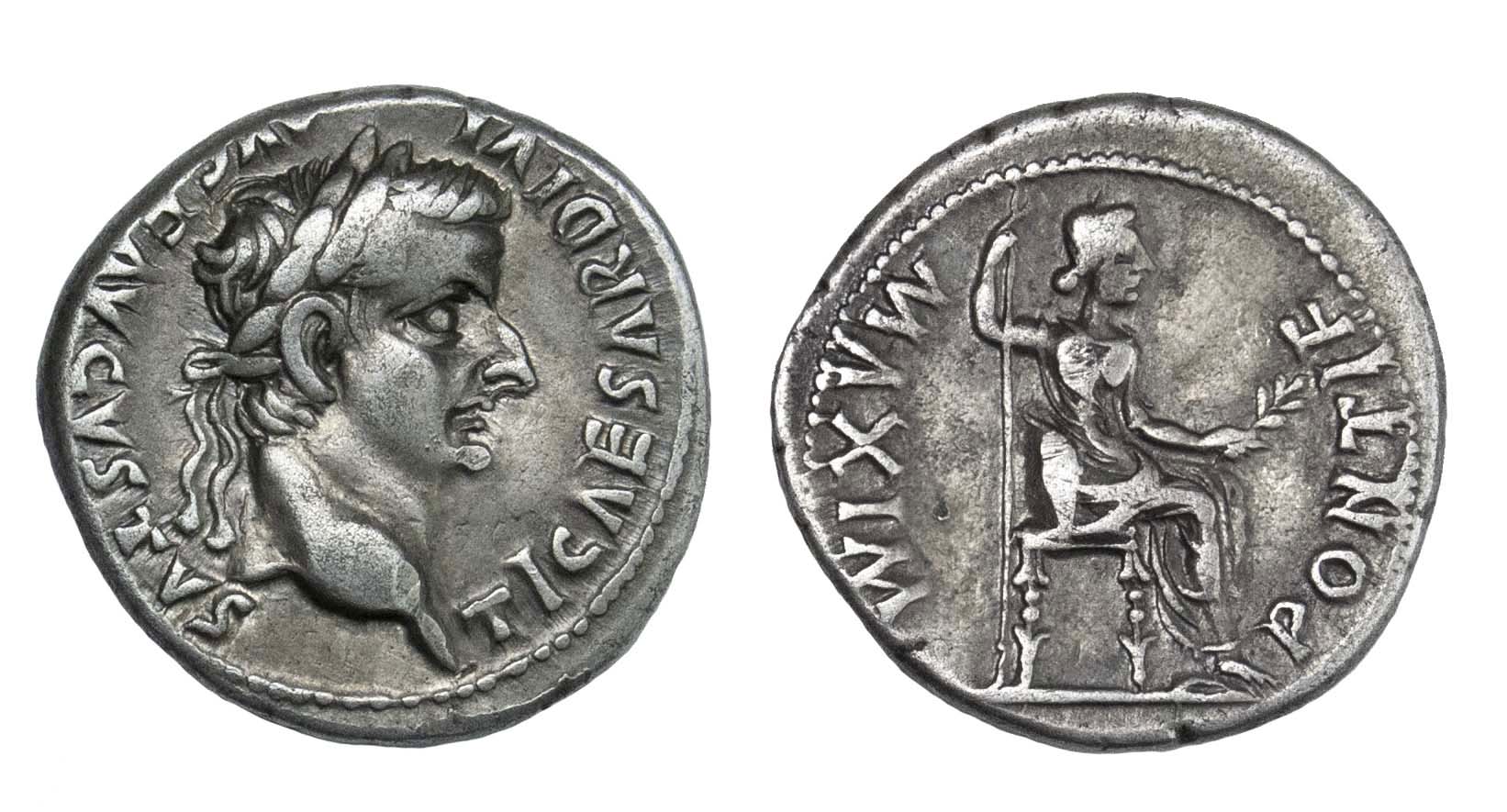
Last week the Federal Government handed down its Budget and there was the usual commentary on ‘winners’ and ‘losers’. While people with higher taxable incomes and business seemed to do well, other groups including university students and staff, overseas workers, the unemployed, refugees and people working in hospitality, the arts, retail or tourism seemed to be largely forgotten.
In this week’s Gospel reading, Jesus is asked whether it’s necessary and okay to pay taxes. Jesus dodges the question as either a ‘yes’ or ‘no’ answer will probably land him in trouble. He requests instead that the coin for paying the Roman tax be brought, which carried the inscription Tiberius Caesar, divine son of Augustus, thus making rival claims to Jesus about his identity. Jesus’ wise and challenging response to the question of paying taxes is to give the Emperor his dues – and so pay the taxes he imposes – but also to give due honour to God’s demands, which are rather more all-encompassing as God is the Creator and Sustainer of every aspect of life.
Coming back to our government’s Budget, the cuts to personal and business taxes are no doubt welcome, but I wonder about neglecting those people struggling the most. As I look at the lists compiled of winners and losers from the Budget, it’s hard not to think that our government’s priorities do not line up with Jesus' priorities for the outcast, the poor and the least. Hence the great challenge of Jesus’ response to give to God what rightly belongs to God – including our worship, our love for neighbour and our commitment to care for the last and the least.
This Sunday we will not be meeting by Zoom for worship. Instead we encourage people to watch and participate in the collaborative service prepared by Heathmont, Ringwood, Ringwood North and our two Croydon congregations. You will see and hear from several familiar faces from Croydon and Croydon North, including Rev Peter. To log in to the service go to the following website https://nruc.online.church/ before 10 am.
If you are unable to join us to participate online, click here for worship@home resources
Paying taxes and honouring God - 18 Oct 2020
Pressing on with Jesus
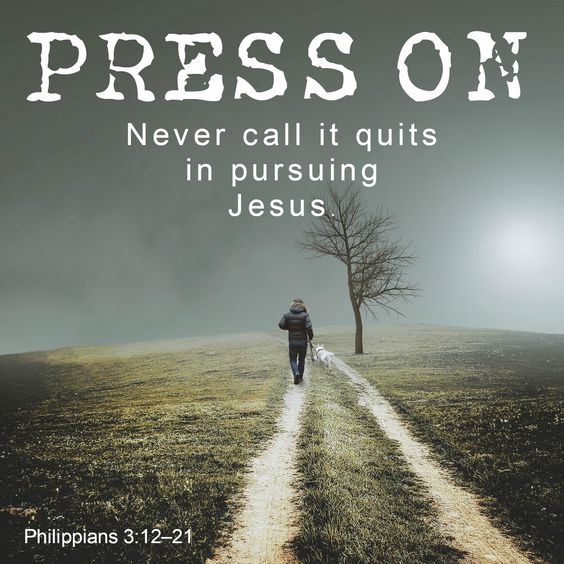
In these days of coronavirus and the extensive changes we are living through, it’s easy to get despondent and impatient with progress. As individuals and as a community we face an uncertain future over the next few weeks and months that is likely to continue into next year. Psychologists tell us that this continuing stress can cause serious harm to our mental health. Someone who knew plenty about stress and some ways of overcoming it was the apostle Paul.
Paul is nothing if not a polarising figure. He seemed to stir up controversy wherever he went and in the book of Acts is accused of turning the world upside down (Acts 17:6). In a rare autobiographical passage in Philippians, Paul describes the stress of seeking perfection as a Jew. This changed when he encountered Christ. Paul no longer had to rely on his own effort to please God, but now enjoyed a close personal relationship with God through Christ. This led to other problems, however, as Paul was seen by some as selling out his Jewish heritage and so was persecuted by Jews, by some rival Christians and also by Greeks who saw their commercial interests being threatened by Paul’s new religion. And we think we have it tough!
In the midst of the storms and controversies that seemed to follow Paul, his solution was to remain focused on Jesus – not being distracted by his past or rocked by present difficulties – but always pressing ahead. Paul was like a runner in a marathon race – never giving up and always striving to keep putting one foot after the other in pursuit of his calling. Despite his reputation for being uncompromising, Paul suggests that we need to accept differences between us while agreeing on what is central, which for Paul is all about following and knowing Jesus. In our days, how might this focus help us overcome the stress and uncertainty that we face?
There will be no Zoom worship meeting this Sunday morning. Instead please take the opportunity to explore other offerings by local churches or on the internet or TV.
Click here for worship@home resources
Pressing on with Jesus - 04 Oct 2020
Rivers that provide life

Water is essential for life. Hence rivers and creeks are important parts of the natural landscape and are our focus in this final week exploring the season of creation. Rivers are like the arteries of the land, carrying life-giving water to where it’s needed. But when there is too much rainfall, rivers can flood causing considerable devastation and when there is too little rainfall, creeks and rivers can dry up.
Living in an arid land, God’s people Israel knew plenty about drought and the famines that followed. Prophets such as Amos drew on this imagery and compared the unjust actions of a people ignoring the word of God to the land lacking water. In both cases there is no life. Amos called instead for justice to roll on like a river. Likewise in Genesis 6-9, God sees the unjust ways of humanity and floods the earth before providing the sign of the rainbow and the promise to never flood the whole earth again.
In this country, rivers have always been important. They provided food and life to indigenous people for millennia. For we second peoples, rivers have provided water for stock, irrigation to grow crops and for hydroelectricity. Yet we have done much damage to our rivers through building dams, through extracting too much water for irrigation and by allowing excess fertiliser to pollute the water. The massive fish deaths in the Darling River system in 2019 illustrated the effects of our greed and shortsightedness. The rivers are groaning and crying out for justice. Will we change our ways and value the life that rivers support or will we continue to see rivers mostly as a resource to be exploited for profit?
We will be holding a Zoom worship meeting this Sunday morning from 9.45 am. I will host the meeting from my home but it will be an opportunity to hold a larger (virtual) gathering and to see each others’ faces. We will be basing our worship on the attached worship@home resource for this week, so it would be handy to have a copy present. We can send you a link to the meeting or a phone number and meeting details if you sign up by emailing the Croydon UC church office on office@croydon.unitingchurch.org.au or using the form in the sidebar.
If you are unable to join us to participate online, click here for worship@home resources
Rivers that provide life - 27 Sep 2020
Learning from a wilderness experience
This week the season of creation encourages us to focus on wilderness. This term may evoke images of Tasmania’s rugged landscapes or the arid landscape of central Australia or even the remote areas of the Kimberley. What these places share is a lack of people and an intrinsic beauty. They can also be deeply spiritual places where we feel close to God.

In the Scriptures, the wilderness or desert was an uninhabited and dangerous place. It was generally a place to be avoided due to its lack of food and water. Some notable characters fled into the wilderness to avoid persecution (e.g. Moses, David, Elijah) while others were driven into the wilderness against their will (e.g. the Israelites escaping from Egypt during the Exodus, Jesus after his baptism). One common element of these stories is that the people encountered God in the wilderness, who provided their basic needs and also shaped their faith. So spending time in the wilderness can be transformative.
Sometimes the wilderness is not a geographical place but rather a psychological or mental space that we find ourselves in. So for many people the extended Covid19 lockdown in Melbourne has felt like a wilderness experience, cut off from other people and with a focus on just getting through each day. What might we learn from such an experience? Perhaps that we can’t rely on our own limited resources. Perhaps that God provides what we really need. Perhaps that we can discern what really matters in life. However difficult these days may feel, may they be a season of growth and transformation for ourselves as individuals and also for our communities.
This Sunday we will not be meeting by Zoom for worship. Instead we encourage people to watch and participate in the collaborative service prepared by Heathmont, Ringwood, Ringwood North and our two Croydon congregations. You will see and hear from several familiar faces from Croydon and Croydon North, including Rev Peter. To log in to the service go to the following website https://nruc.online.church/ before 10 am.
If you are unable to join us to participate online, click here for worship@home resources
Learning from a wilderness experience - 20 Sep 2020
The groaning of the land

This week’s focus in the season of creation is the land. Many of us may be fondly attached to our small suburban block where we live and may have a favourite location to visit on holidays, but our relationship with the land is very different to that of indigenous people. For them the connection to land is visceral and spiritual.
In our reading from Genesis 3 this week, we learn that the land was implicated in the fallout from the earlier incident involving Adam and Eve and the serpent. It will grow weeds and thorns and not readily yield crops. It is not clear why the land is implicated except that the rift between God and humanity involves the whole of creation, including the land. In Paul’s commentary on this Genesis passage in Romans 8:18-25 he notes that creation is groaning and frustrated and longs for freedom. These deep emotions are not something that we white people readily associate with the land, but indigenous people do feel the connection.
Why is the land groaning? Because we have mistreated it through over cropping and over grazing it, through prolonged droughts worsened by climate change and through overuse of chemical fertilisers and pesticides. It is time to repent and change our thinking and our ways. Our greed and appetite for ever more things is slowing killing the planet. Yet the Romans reading suggests there is hope for creation, tied in with the broader Christian hope of redemption. We humans are clearly part of the problem but we are also a key part of the solution.
We will be holding a Zoom worship meeting this Sunday morning from 9.45 am. I will host the meeting from my home but it will be an opportunity to hold a larger (virtual) gathering and to see each others’ faces. We will be basing our worship on the attached worship@home resource for this week, so it would be handy to have a copy present. We can send you a link to the meeting or a phone number and meeting details if you sign up by emailing the Croydon UC church office on office@croydon.unitingchurch.org.au or using the form in the sidebar.
Click here for worship@home resources
The groaning of the land - 13 Sep 2020
The beauty and importance of forests

With spring in the air it seems most appropriate to focus on the season of creation during the next month. This first week the focus is on forests and the creation story from Genesis 2 highlights that the original home of humanity was in a garden surrounded by trees. These trees were beautiful to look at and their fruit and seeds were useful for food. There was an easy interdependence as humanity for its part was called to care for the garden and the trees.
During this season of creation we are also being encouraged to reflect on what it might mean to enact a Jubilee for the earth, a year where crops were not planted or harvested and the earth had a rest. In some ways, the Covid19 pandemic has provided this unexpected rest for the earth as plane travel has all but stopped and car travel is greatly reduced. It’s provided an opportunity for many of us to slow down, to hear the calls of birds singing, to go for more walks and appreciate the natural beauty in our neighbourhood.
But we must also recognise that the greatest threats to our forests are human based – land clearing and climate change – and these carry on apace, unaffected by the pandemic. Unless all of us start to take these threats seriously and choose to make some changes in our own daily habits, then our beautiful and spirit restoring forests will continue to dry out, burn or be bulldozed. To learn more about what we can do, make an effort to watch or rewatch the recent series on ABC TV Fight for Planet A. We can also write an email or letter to our politicians asking them to take meaningful action on climate change.
We will be holding a Zoom worship meeting this Sunday morning from 9.45 am. I will host the meeting from my home but it will be an opportunity to hold a larger (virtual) gathering and to see each others’ faces. We will be basing our worship on the attached worship@home resource for this week, so it would be handy to have a copy present. We can send you a link to the meeting or a phone number and meeting details if you sign up by emailing the Croydon UC church office on office@croydon.unitingchurch.org.au or using the form in the sidebar.
Click here for worship@home resources
The beauty and importance of forests - 6 Sep 2020
Jesus’ inconvenient invitation

Our prayers often involve asking God to bless us and those we love with good health, with strength and with peace. In praying these prayers we take our cue from the Psalms, where people and communities cry out to God for help, reminding ourselves – and God – about God’s character of love and faithfulness.
Sometimes, though, the situation is reversed and God asks things of us. And these requests and invitations are not always easy or comfortable. In two of our readings this week, people are called upon to make momentous decisions that have far-reaching implications for their lives. In one instance, God calls Moses to return to Egypt to rescue God’s people from slavery under Pharaoh. This is more than inconvenient for Moses – it’s extremely dangerous and difficult. God promises to go with Moses, but it’s a big call.
In the Gospel reading, Jesus invites the disciples – and anyone else who wants to follow him – to embrace suffering, just as he will walk a path of suffering all the way to the cross. According to Jesus this is the way to find true life. Again this is most inconvenient, especially in our culture that seeks comfort and pleasure at every opportunity and avoids suffering if at all possible.
The challenge for us, then, is to have the faith to hear and the courage to respond to God’s call, wherever it may take us. As the proverb suggest, a boat in the harbour is safe, but that is not what boats are built for.
What inconvenient but life-giving invitation may God be calling you to and how will you respond?
We will be holding a Zoom worship meeting this Sunday morning from 9.45 am. I will host the meeting from my home but it will be an opportunity to hold a larger (virtual) gathering and to see each others’ faces. We will be basing our worship on the attached worship@home resource for this week, so it would be handy to have a copy present. We can send you a link to the meeting or a phone number and meeting details if you sign up by emailing the Croydon UC church office on office@croydon.unitingchurch.org.au or using the form in the sidebar.
Click here for worship@home resources
Jesus’ inconvenient invitation - 30 Aug 2020
The question that won’t go away

The question ‘Who is Jesus?’ lies at the heart of the whole of the New Testament. It is a question that each of the Gospel stories tries to answer in its own way, while the later books and letters deal with further implications of this question (e.g. why did Jesus have to die? who then is God? how are we to live?).
It’s the question that Jesus poses to his disciples roughly mid way through the story. Based on all that you have seen and heard, friends, who do you think I am? Peter’s response is regarded as the bedrock of Christian faith, namely that Jesus is the Messiah, the Son of the living God. It’s why followers of Jesus are known as Christians, followers of the Christ, which is the Greek translation of the Hebrew Messiah.
In our day, the question is still relevant, although the answers we might get to it cover a spectrum of views – ranging from Jesus was just an ordinary and misunderstood Jewish man to Jesus was a great moral teacher to Jesus was a mighty prophet to Jesus was God in human form. How we answer this question for ourselves will not only illuminate our faith but also influence how we live and what we give priority to.
How will you answer this question?
We will be holding a Zoom worship meeting this Sunday morning from 9.45 am. I will host the meeting from my home but it will be an opportunity to hold a larger (virtual) gathering and to see each others’ faces. We will be basing our worship on the attached worship@home resource for this week, so it would be handy to have a copy present. We can send you a link to the meeting or a phone number and meeting details if you sign up by emailing the Croydon UC church office on office@croydon.unitingchurch.org.au or using the form in the sidebar.
Click here for worship@home resources
The question that won’t go away - 23 Aug 2020
A lesson from the margins

Change rarely comes from the centre of a group or an organization. Usually lasting change comes from the margins. This week’s text illustrates this truth.
Jesus and the disciples have travelled to the region of Tyre and Sidon, coastal cities in modern day Lebanon. They’ve gone there for some rest and peace, but are soon confronted by a loud and insistent woman seeking help for her daughter. Matthew calls her a Canaanite woman, a derogatory term from the days of Moses used to describe the original inhabitants of the land of Israel. Jesus ignores her cries and later insults her, calling her a dog.
Where is Jesus’ famed compassion? Where is his welcome of the outcast? Both have seemingly gone missing on this occasion. The woman persists, however, and reframes the discussion by suggesting that even dogs belong to the wider family and are therefore worthy to receive the crumbs that fall from the master’s table.
The penny finally drops for Jesus as he recognises that his mission – and indeed God’s love and grace – are for everyone. This startling insight overcame centuries of history and prejudice and set the future direction for the emerging Christian community as a place of inclusion. The Black Lives Matter movement in Australia shows how far we still have to change our attitudes in this country.
This Sunday we will not be meeting by Zoom for worship. Instead we encourage people to watch and participate in the collaborative service prepared by Heathmont, Ringwood, Ringwood North and our two Croydon congregations. You will see and hear from several familiar faces from Croydon and Croydon North, including Rev Peter. To log in to the service go to the following website https://nruc.online.church/ before 10 am.
If you are unable to join us to participate online, click here for worship@home resources
A lesson from the margins - 16 Aug 2020
Getting through the storms of life

We’re currently in the middle of a storm – the pandemic caused by Covid19, which is affecting people’s health, their sense of connection with others, their work routines and, for many, their financial security. Where is God during such a storm? What is God up to in the midst of this pandemic?
In the Gospel story this week, Jesus is not with the disciples as they battle wind and waves. Some see this as a metaphor for the church (the boat), battling opposition and alone on the ocean of the world. In these days it may feel that we are indeed struggling alone.
But that is only half the story. Jesus comes to the disciples in the midst of their struggles and even encourages brave/foolish Peter to get out of the boat and come to him on the water. Peter is soon distracted by the storm around him and starts to sink, before Jesus reaches out and grabs him by the hand, hauling him to safety.
The good news in this story is that if we’re able to trust that Jesus really is Emmanuel – God with us – then we can live with courage and with hope, knowing that we will get through this storm together. Further, we can continue to seek the good of others in our community – knowing that God is always there for us in Jesus.
We will be holding a Zoom worship meeting this Sunday morning from 9.45 am. I will host the meeting from my home but it will be an opportunity to hold a larger (virtual) gathering and to see each others’ faces. We will be basing our worship on the attached worship@home resource for this week, so it would be handy to have a copy present. We can send you a link to the meeting or a phone number and meeting details if you sign up by emailing the Croydon UC church office on office@croydon.unitingchurch.org.au or using the form in the sidebar.
Click here for worship@home resources
Getting through the storms of life - 9 Aug 2020
God feeds us with more than just food

During these days of lockdown we have lots of time to ourselves to ponder about life. I fear that there will be plenty of funerals in the days and weeks ahead for aged care residents – and for loved ones that will be very difficult. Jesus also knew about grief and suffering. In this week’s Gospel reading he is mourning the brutal death of his cousin John the Baptist and wanting to get away by himself for some time of rest and reflection. But crowds follow Jesus to the remote place and it eventually comes round to dinner time.
What to do? Jesus challenges the disciples to give them something to eat. All they have to hand are five small loaves and two fish. Jesus takes what they have, prays, blesses the food and everyone eats and is satisfied, 5000 plus people.
But is there more to this story than simply filling hungry stomachs? Jesus demonstrates what the kingdom of God is like and points to the character of God who generously provides what we need. I wonder what we most need this day? What are we most hungry for?
God abundantly provides what will ultimately satisfy our deepest needs … and sometimes asks us to be part of the answer to our prayers, to use what little we have available to help and transform the lives of others and to carry God’s blessing to them.
We will be holding a Zoom worship meeting this Sunday morning from 9.45 am. I will host the meeting from my home but it will be an opportunity to hold a larger (virtual) gathering and to see each others’ faces. We will be basing our worship on the attached worship@home resource for this week, so it would be handy to have a copy present. We can send you a link to the meeting or a phone number and meeting details if you sign up by emailing the Croydon UC church office on office@croydon.unitingchurch.org.au or using the form in the sidebar.
Click here for worship@home resources
God feeds us with more than just food - 2 Aug 2020
God is with us … always

As the number of coronavirus cases across Melbourne continues to escalate day by day, the Premier’s daily briefings have become a regular and disturbing part of our new normal. These are harder days to live through than the previous lockdown, which involved the whole country and where it seemed easier to trace the spread of new infections. The threat feels more serious this time, with the wearing of masks becoming compulsory outside the home.
So in the midst of these challenging times, where is God to be found? How do we hold on to hope and peace? How do we even begin to know how to pray?
There is comfort in this week’s passage from Romans. Paul knows a thing or two about feeling weak and helpless. It’s at these times that we can turn to God’s Spirit to provide the strength and grace we need and to help us to pray. The Spirit – who searches our hearts and also knows the will of God – intercedes for us with sighs and groans too deep for words (Romans 8:26). God knows what we need even when we can’t quite express it in words. Paul also assures us that nothing in the whole of creation – not the threat of coronavirus – not hardship or even death – can keep us apart from the love of God in Christ Jesus (8:39).
We will be holding a Zoom worship meeting this Sunday morning from 9.45 am. I will host the meeting from my home but it will be an opportunity to hold a larger (virtual) gathering and to see each others’ faces. We will be basing our worship on the attached worship@home resource for this week, so it would be handy to have a copy present. We can send you a link to the meeting or a phone number and meeting details if you sign up by emailing the Croydon UC church office on office@croydon.unitingchurch.org.au or using the form in the sidebar.
Click here for worship@home resources
God is with us … always - 26 July 2020
Posted: Friday, July 24, 2020 by Peter Mallen Tags: Romans 8:26-39
The problem of weeds

This week’s parable about weeds is every farmer’s or home gardener’s nightmare. You plant good seed into your carefully prepared soil and what comes up? A surprising mix of the plants you want plus a whole lot of unwanted weeds. Where did the weeds even come from? You certainly didn’t plant them – but there they are anyway! The question is … what to do now?
The wisdom from the parable is to be patient and to let the weeds be and let them grow up along with the plants you want, lest you uproot the good plants. Then when it’s harvest time, it will be obvious which are the weeds and they can be pulled up and tossed out and you can then gather the plants you want.
Who does the parable apply to? Commentators have seen it as applying to both the good and evil in the world at large and also within the church community, where sometimes the weeds simply must be removed (e.g. evidence of child sexual abuse that was not acted upon). But perhaps it also applies to our own hearts, where there are both good desires and blind prejudices. It’s good that God is patient with us and allows the gentle work of the Holy Spirit to keep working at our flaws and failings.
This Sunday we will not be meeting by Zoom for worship. Instead we encourage people to watch and participate in the collaborative service prepared by Heathmont, Ringwood, Ringwood North and our two Croydon congregations. You will see and hear from several familiar faces from Croydon and Croydon North, including Rev Peter. To log in to the service go to the following website https://nruc.online.church/ before 10 am.
If you are unable to join us to participate online, click here for worship@home resources
The problem of weeds - 19 July 2020
Puzzling over parables

Jesus loved using parables to get his message across. These simple stories and images drawn from everyday life conveyed deeper truths for those with ears to hear. For many in the crowds who heard these stories, however, they appeared more like riddles that obscured the message. It’s hard for us to gauge their initial impact of course – because we have heard them so many times and therefore think that we know exactly what they mean.
But now – as then – parables are open to multiple interpretations. So in the well-known parable of the sower, for instance, we think that the meaning depends on how we interpret the types of soil that the seed falls onto, for this is the interpretation offered later in the chapter – whether by Jesus or by Matthew and his community. The parable may also
speak about the generosity and extravagance of God and the call to put our understanding of the gospel into action.
Where do you find hope and encouragement in this parable?
Where do you find challenge?
And how could you express its meaning using contemporary images?
We will be holding a Zoom worship meeting this Sunday morning from 9.45 am. I will host the meeting from my home but it will be an opportunity to hold a larger (virtual) gathering and to see each others’ faces. We will be basing our worship on the attached worship@home resource for this week, so it would be handy to have a copy present. We can send you a link to the meeting or a phone number and meeting details if you sign up by emailing the Croydon UC church office on office@croydon.unitingchurch.org.au or using the form in the sidebar.
Click here for worship@home resources
Puzzling over parables - 12 July 2020
The invitation of Jesus

In these days of coronavirus, many of us are feeling weary and burdened, worried now by the recent spike in new infections in Melbourne just as life seemed to be gradually returning to some sort of normal. It’s a reminder that we are in the midst of a pandemic that is much more of a marathon than a sprint.
Jesus’ invitation to those feeling weary or burdened is to come to him to find rest and to take on his yoke which is easy and to bear his burden which is light (Matt 11:28-30). These are certainly comforting words. But the last time I checked out Jesus’ message about how to live (e.g. in the Sermon on the Mount earlier in this same Gospel), his guidelines seemed to be more demanding than many other ways of living. So in what ways is Jesus’ yoke ‘easy’ and his burden ‘light’?
Rather than providing a long list of rules, Jesus does make it simple and clear – love God wholeheartedly and love your neighbour as you love yourself. Like a wise person building a house, the question is whether we will hear these guidelines and live them out in practice. They provide a ready means of assessing all our actions – do they demonstrate God’s love in a practical way – as shown by Jesus? As we walk with Jesus and learn from him we will find rhythms of life that are light and bring rest to our souls.
We will be holding a Zoom worship meeting this Sunday morning from 9.45 am. I will host the meeting from my home but it will be an opportunity to hold a larger (virtual) gathering and to see each others’ faces. We will be basing our worship on the attached worship@home resource for this week, so it would be handy to have a copy present. We can send you a link to the meeting or a phone number and meeting details if you sign up by emailing the Croydon UC church office on office@croydon.unitingchurch.org.au or using the form in the sidebar.
Watch Peter's message from sunday morning.
Click here for worship@home resources
The invitation of Jesus - 5 July 2020
Grappling with a hard text

Although we probably all prefer to read biblical texts that speak of God’s promises of blessing and abundant life, there is value in grappling with hard texts that we would rather ignore. This week we are faced with such a text in Genesis 22:1-14, which is given various titles such as ‘Abraham tested’ or ‘God commands Abraham to offer Isaac’.
Whichever way you approach this text, there are so many unanswerable
questions:
- What on earth were Abraham and Isaac thinking as they climbed up the mountain?
- How do we reconcile the call to obedience and the exercise of freedom?
- How do we follow the God who seemingly commands death yet who also offers life?
As Christians, our tendency is to read this troubling narrative from the perspective of Isaac, the one who willingly offers up his life, as a model and foretaste of Jesus offering up his life as the Lamb of God (John 1:29). This may be a helpful approach, but doesn’t address the terrible cost and decision faced by Abraham – and by God the Father.
In these days of coronavirus and the Black Lives Matter protests, how do we rightly value each life? If the mysterious and inscrutable God of Genesis 22 is hard to fathom, then perhaps we can place this text alongside the story of the Good Shepherd who leaves the 99 sheep in order to search for and rescue the one at risk sheep (Luke 15:4-6).
This Sunday we will again be meeting for worship by Zoom. Carolyne Chandler will be leading this time, using the Zoom account of Uniting Faith and Families. So if this label appears when you log on to Zoom you are in the right place for worship this week! The meeting will be called Carolyne - Croydon Worship. We will be basing our worship on the attached worship@home resource for this week, so it would be handy to have a copy present. We can send you a link to the meeting or a phone number and meeting details if you sign up by emailing the Croydon UC church office on office@croydon.unitingchurch.org.au or using the form in the sidebar.
Click here for worship@home resources
Grappling with a hard text - 28 June 2020
Reflecting on 43 years of the Uniting Church
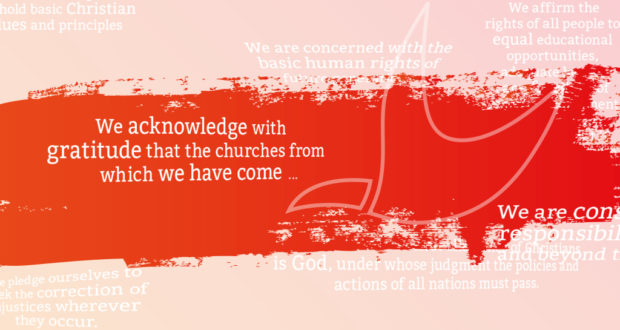
This week we are given the opportunity to reflect on the journey of the Uniting Church since its inauguration in 1977. For some of us this is a time to celebrate the many achievements of the Uniting Church over the last 40+ years. For others it is a chance to reflect on the difficulties and struggles of the church during this period. For those born since 1977 or new to the church since Union, their experience is quite different from those involved in the lead-up and high expectations associated with forming a ‘new’ church from three existing denominations.
As you reflect on your own
experience of the Uniting Church, what are you most thankful for?
And what do you see as the
main challenges facing the Church?
Where might our priorities need to change?
This Sunday we will not be meeting by Zoom for worship. Instead we encourage people to watch and participate in the collaborative service prepared by Heathmont, Ringwood, Ringwood North and our two Croydon congregations. You will see and hear from several familiar faces from Croydon and Croydon North, including a message from Rev Peter. To log in to the service go to the following website https://nruc.online.church/ before 10 am.
If you are unable to join us to participate online, click here for
Reflecting on 43 years of the Uniting Church - 21 June 2020
After the streamed service we will be having a virtual morning tea of Croydon and Croydon North people by Zoom using the same log in details as previously. We can send you a link to the meeting if you sign up by emailing the Croydon UC church office on office@croydon.unitingchurch.org.au.
Posted: Friday, June 19, 2020 by Peter Mallen Tags:Opening our hearts on Refugee Sunday
Due to violence, famine and persecution, there are currently an estimated 70 million displaced people in the world. Some of these have made their way to Australia, where our response during the past 20 years has mostly been to incarcerate them in prisonlike conditions or leave them in limbo living in the community, but without any government assistance or work rights. It was not always this way. Following World War 2, we welcomed many refugees to our country with open arms … and welcomed many Vietnamese refugees in the late 1970s.
It’s interesting to reflect on which biblical characters were refugees or asylum seekers. The list is long and includes Abraham and Sarah, Jacob and his entire extended family, David, Jeremiah, Esther, Ezra, Nehemiah … and of course Mary, Joseph and Jesus. The contemporary causes that make people flee their homes to seek safety and shelter in other places have long been part of history and have been the lived experience of many of God’s people. Unsurprisingly, then, there are multiple calls in Scripture to care for and welcome refugees (e.g. Exod 23:9, Lev 19:34, Deut 10:17-18).
How might we live out God’s call to welcome refugees and asylum seekers in our midst? First, we must recognise that these are people, and not merely statistics, who – like us – have parents, partners and children. They did not choose to become refugees, but were usually forced to flee their homes suddenly due to threats against their lives. They are not ‘queue jumpers’ as usually there was no time or place to write their names on a list. Instead they are vulnerable people who need our welcome and support.

Our welcome may include supporting organisations like the Asylum Seeker Resource Centre (ASRC) who help provide food, medical needs, counselling and legal support. Our welcome may be to visit the Detention Centre in Broadmeadows and provide a little human kindness (although visits are currently suspended due to Covid19). Our welcome may include speaking to local politicians about changing our government’s harsh and cruel policies. And we can always pray for change and for compassion.
How might you offer welcome to
these people?
We will be holding a Zoom worship meeting this Sunday morning from 9.45 am. I will host the meeting from my home but it will be an opportunity to hold a larger (virtual) gathering and to see each others’ faces. We will be basing our worship on the attached worship@home resource for this week, so it would be handy to have a copy present. We can send you a link to the meeting or a phone number and meeting details if you sign up by emailing the Croydon UC church office on office@croydon.unitingchurch.org.au or using the form in the sidebar.
Click here for worship@home resources
Opening our hearts on Refugee Sunday - 14 June 2020
Thinking about the Trinity
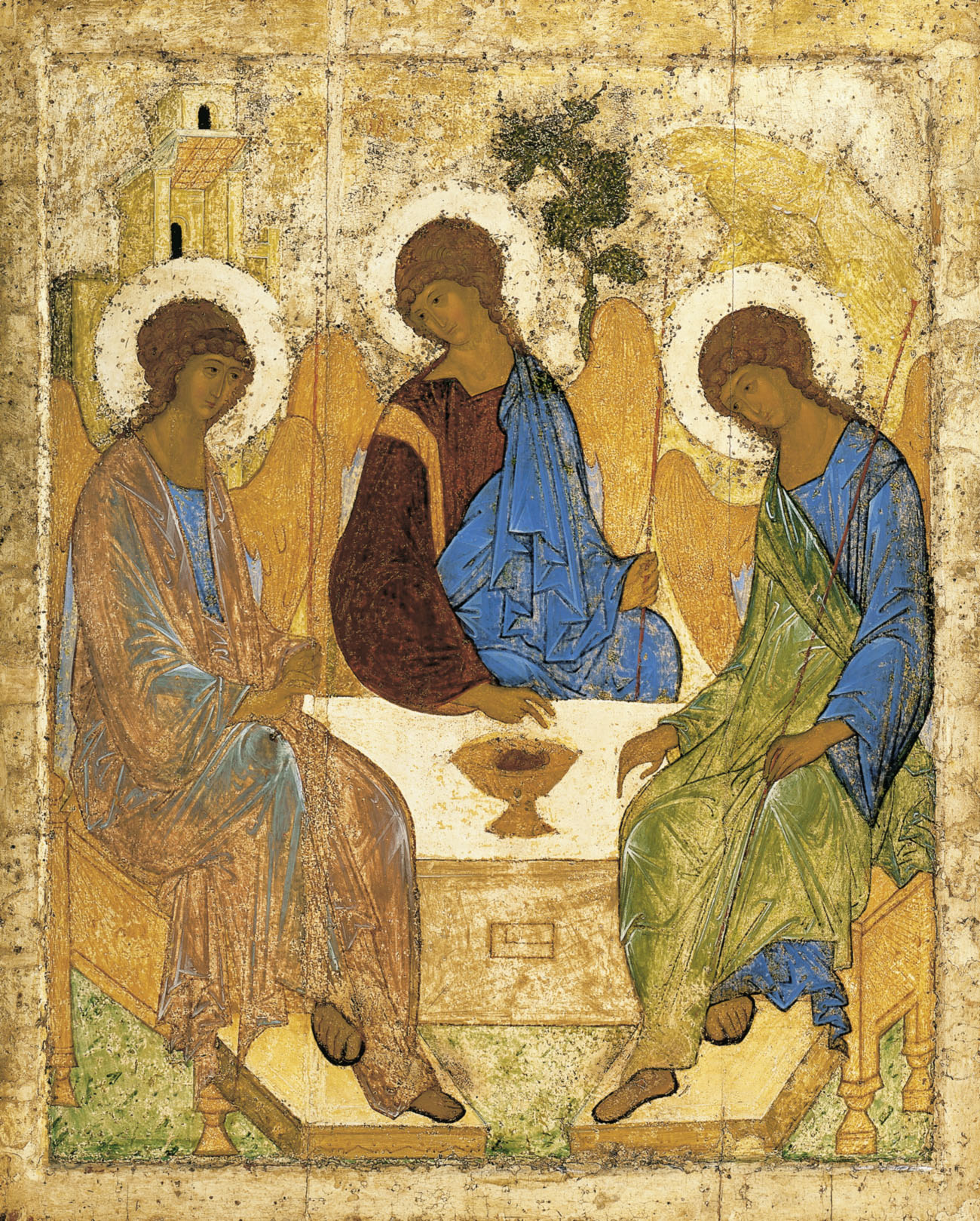
The Trinity is one of those mysteries that is hard to get one’s mind around. We proclaim that there is only one God – and then we name God as Father, Son and Holy Spirit – which implies a threeness – as depicted in the famous Rublev icon of the Trinity opposite. This form of addressing God – which has biblical precedent from passages such as Matthew 28:19 – raises other issues for us as it sounds quite patriarchal to our contemporary culture. And yet here we are on Trinity Sunday, invited to reflect on who God is for us and what it means to be God’s people in the world.

Something that may surprise you is that trinitarian thinking came very early in the life of the church. The apostle Paul was using a trinitarian blessing within 20 years of Jesus’ death – what we know as the Grace from 2 Cor 13:13 – ‘May the grace of our Lord Jesus Christ, the love of God and the communion of the Holy Spirit be with you all’. From a very early date baptism was carried out in the name of the Father, Son and Spirit.
What sort of response might we make to these truths about God?
We will be holding a Zoom worship meeting this Sunday morning from 9.45 am. I will host the meeting from my home but it will be an opportunity to hold a larger (virtual) gathering and to see each others’ faces. We will be basing our worship on the attached worship@home resource for this week, so it would be handy to have a copy present. We can send you a link to the meeting or a phone number and meeting details if you sign up by emailing the Croydon UC church office on office@croydon.unitingchurch.org.au or using the form in the sidebar.
Click here for worship@home resources
Thinking about the Trinity - 7 June 2020
Pentecost - catalyst for change

The Pentecost story has several overlapping strands. It’s about God’s promise and presence and power, it’s about praise and prophecy, and it’s also about people and purpose. This week I am focusing on the people aspect and how Pentecost builds community.
Just as we may be feeling lonely, isolated or anxious about the future, just trying to take things one day at a time, so too for the first disciples of Jesus on the day when their world turned upside down, not for the first time. They’d followed Jesus but it hadn’t worked out the way they’d hoped, so they were just hanging in there and hoping and praying about the future.
At Pentecost, the Spirit gave them new courage, new direction and renewed hope for the future. After Peter’s inspiring message about Jesus, prompted by the Spirit, many people embraced the new faith and a vibrant and growing community was born. Everyone was included and people were generous with their hospitality and time and goods.
Like those first disciples, we too are relearning some of the behaviours that build community. Many families are reconnecting through spending more time together, friends are keeping in touch over the phone, people are slowing down and talking to their neighbours, others are taking the time to listen and some are rediscovering old ways of cooking and growing vegetables. There has been a new kindness movement happening.
But Pentecost also brought creative changes prompted by the Spirit, new possibilities, new ways of being God’s people in the world. And so in these days, we also have found new means of connecting such as by Zoom. How many of us even knew what this involved two months ago?
Pentecost was a catalyst for change, although many challenges remained ahead for the emerging community. So I wonder how our current situation will help us make lasting change towards a new more equitable and compassionate future. How will we better align ourselves with God’s ways after this pandemic is over? How can all of us in this country learn to truly sing together that we are all Australian and that we do share a common dream?
This Sunday we will not be meeting by Zoom for worship. Instead we encourage people to watch and participate in the collaborative service prepared by Heathmont, Ringwood, Ringwood North and our two Croydon congregations. You will see and hear from several familiar faces from Croydon and Croydon North, including a message from Rev Peter. To log in to the service go to the following website https://nruc.online.church/ before 10 am.
If you are unable to join us to participate online, click here for worship@home resources
Pentecost - catalyst for change - 31 May 2020
After the streamed service we will be having a virtual morning tea of Croydon and Croydon North people by Zoom using the same log in details as previously. We can send you a link to the meeting if you sign up by emailing the Croydon UC church office on office@croydon.unitingchurch.org.au.
Rev Dr Peter Mallens message from the service can be seen below. Please note that the quote from African-American Sonia Renee Taylor was chosen, and the video filmed, the day before the #BlackLivesMatter riots.
The video of the combined service is also available courtesy of NRUC.
Posted: Thursday, May 28, 2020 by Peter Mallen Tags: Acts 2:1-39Being witnesses to Jesus

The reading that we are focusing on this week comes from the opening chapter of Acts, the second book in Luke’s two volume story about Jesus. This second book begins with the ascension of Jesus and goes on to tell the story of Jesus’ followers as they proclaim the good news of Jesus in word and in action, starting from Jerusalem and finally reaching Rome.
In the opening passage from Acts, Jesus commissions the disciples for their new role, that of being witnesses. It is as if Jesus is handing on the relay baton to them.
But just what are they to be witnesses of? Based on the many stories recounted in Acts, their witness is focused on the death and resurrection of Jesus, who is to be regarded as both Messiah and Lord, and also on his message of good news about the kingdom of God. After a momentous start in Jerusalem on the day of Pentecost, their witness gradually expands geographically and also racially as more and more Gentiles (i.e. non-Jews) embrace the message.
In order to equip them for their witnessing task, Jesus urges them to wait for the gift of the Holy Spirit, who will provide them power. The Greek word used here is dunamis, from which we derive English words such as dynamo and dynamite, and it may mean might, strength or ability. One demonstration of power comes in the Pentecost story as Peter is given the words and the courage to stand up and proclaim a message about Jesus. On other occasions the apostles demonstrate power for compassion and for healing. And throughout the book of Acts, there is another dimension of power demonstrated, namely power to form community. In each instance, the Holy Spirit supplies what they need at the time.
The question for us as we reflect on this passage is how we are called to be witnesses of Jesus in our context and situation. Obviously our witness will be quite different from the original disciples since we did not physically witness events like the cross and the resurrection of Jesus. So how best to be witnesses is a challenge for every generation of Jesus’ followers.
As we contemplate our call to ‘proclaim by word and example the good news of God in Christ’ – which is part of the baptism liturgy and therefore applicable to every baptised follower of Jesus – we may want to ponder what help we most need from the Holy Spirit. Is it courage to speak? Is it compassion? Is it the perseverance and energy to form community? As we do so, we might also recall Jesus’ promise to be with us always, and to remember that we are Easter people who know and serve a living Lord
Click here for worship@home resources
Being witnesses to Jesus - 24 May 2020
Posted: Wednesday, May 20, 2020 by Peter Mallen Tags: Acts 1:1-11, Psalm 68: 32-35, Psalm 68:4-6
Living the life Jesus promised

How do we live the life Jesus spoke about and experience the peace he promises to give? How do we express our love for Jesus? And what is the role of the Holy Spirit in connecting us with Jesus and with God? These are all questions that arise from our Gospel reading this week from John chapter 14.
There is a small phrase that is easy to miss in this week’s reading: because I live, you also will live. Yes, Jesus is going away and the disciples are anxious and troubled. But Jesus will not leave them alone as orphans in the world, adrift and separated from God’s love. Rather, looking ahead to his rising to new life, Jesus promises that God will send the Holy Spirit in his name to live within and amongst the disciples – for always. This is how they will continue to live in the way of Jesus even when he is no longer physically present with them. The Spirit will remind them of all that Jesus taught and especially the command to love one another.
Rather than seeing this command as a duty or a prerequisite for experiencing God’s loving presence, Jesus turns it all around. Because of God’s love – illustrated through the ministry and ultimately in the death of Jesus for his friends – we respond in a similar way by loving and serving one another. As we do this, we will live the life Jesus spoke of – the abundant and overflowing life – even as God’s Spirit brings us into the heart of relationship with God. That is when we will also experience the deep and abiding peace that Jesus promised.
Our current circumstances with corona virus provide us a way to better understand this message. Living in the way of Jesus – the way of love – will not shield us from suffering or anxious thoughts or uncertainty about how the next few weeks and months may turn out. But it may just give us the peace we need and the assurance that God – and indeed Jesus – is with us every faltering step of the way.
How have you been experiencing this peace in these challenging times?
What new ways are you finding to love and serve others?
And what are you learning about Jesus and yourself in the process?
Click here for worship@home resource
If you love me - 17 May 2020
This week is another collaborative streamed service at 10 am from the Maroondah Uniting Churches, prepared mostly by the Ringwood congregation. Go to https://nruc.online.church/ to watch the service. We will follow this with morning tea by Zoom for Croydon and Croydon North people. Email the Croydon office for details to join us.
Posted: Friday, May 15, 2020 by Peter Mallen Tags: Acts 17:22-31, John 14:18-27Do not be afraid – Jesus promises to be with us

How and where is Jesus present to guide and sustain us in these troubling times? The long discourse in John’s Gospel that runs from chapter 13 through to chapter 17 offers us some encouragement.
The disciples are troubled, probably by Jesus’ repeated statements that he is going where the disciples cannot follow (13:33, 36), so Jesus reassures them about life when he will no longer be physically present with them. This is also highly relevant for the situation of John’s later community – and for us. Like much else in this Gospel, the disciples don’t understand what Jesus is saying.
Some key messages from John chapter 14 that we read this week are …
- Jesus will not abandon the disciples, but will send another helper – the Holy Spirit or paraclete – to be with them – and with us – always
- Jesus is the way, the truth and the life … the doorway to relationship with God
- To know Jesus is to know God … as Jesus reveals the heart and character of God
- Even now, Jesus is preparing to return to God and will prepare a place for the disciples in God’s house (note that in John’s Gospel, Jesus was with God from the very beginning and came from God and is now returning to God)
The disciples ask what God is like. 'Just like me' says Jesus … who embodies the ways and priorities of God … bringing healing and wholeness, lifting religious burdens, breaking down exclusive and exclusionary practices, welcoming and offering hospitality to all including the outcast and those considered unloved or rejected … enjoying an intimate relationship with God through God’s Spirit … so that Jesus can claim he is ‘in’ the Father and the Father is ‘in’ him.
If we want to live in this same close relationship with God that Jesus enjoys, we will keep Jesus’ commandments (John 14:15) and especially the command to love one another (John 13:34-35). As we do so, we will be doing the works of Jesus (14:12). How will we know how to do this? Through the gift of the Spirit of truth, whom God will send in Jesus’ name, who will remind us of everything Jesus said (John 14:26) and who will be ‘in’ us, bringing us into relationship with Jesus and with God.
You may like to spend some time this week reflecting on what you find most encouraging in this passage, and also what you find most challenging.
Click here for worship@home resources
Jesus promises to be with us - 10 May 2020
This Sunday, we will be holding a Zoom worship meeting from 9.45 am. I will host the meeting from my home but it will be an opportunity to hold a larger (virtual) gathering and to see each others’ faces. We will be basing our worship on the attached worship@home resource for this week, so it would be handy to have a copy present. We can send you a link to the meeting or a phone number and meeting details if you sign up by emailing the Croydon UC church office on office@croydon.unitingchurch.org.au or using the form in the sidebar.
Posted: Friday, May 8, 2020 by Peter Mallen Tags: John 14:1-18, Psalm 31Good Shepherd Sunday

This Sunday is known as Good Shepherd Sunday, when we reflect on Jesus as our good shepherd … a widely used metaphor for pastoral care in the church. Today’s Gospel reading also includes Jesus’ statement that he came to guide us towards the abundant life.
How do we envisage the abundant life that Jesus speaks of? Two companion texts for today – Psalm 23 and Acts 2:42-47 – provide some insights, along with other texts from the Gospel of John (1:4, 5:24, 11:25, 14:6, 17:3).
It is a life lived in communion with God and in communion with God’s people. All we need will be provided (pasture, still waters) … yet the way will not always be easy (walking in the valley of the shadow of death). We are promised blessing (provision, joy peace) … and called upon to be a blessing to others in turn (as demonstrated by members of the early church and their attitude towards any in need).
How can we help point others towards this abundant life, which is available here and now?
This Sunday we will not be meeting by Zoom for worship. Instead we encourage people to watch and participate in the collaborative service prepared by Heathmont, Ringwood, Ringwood North and our two Croydon congregations. You will see and hear from several familiar faces from Croydon and Croydon North. To log in to the service go to the following website https://nruc.online.church/ before 10 am.
If you are unable to join us to participate online click here for worship@home resources
Good Shepherd Sunday - 3 May 2020
After the streamed service we will be having a virtual morning tea of Croydon and Croydon North people by Zoom using the same log in details as previously. We can send you a link to the meeting if you sign up by emailing the Croydon UC church office on office@croydon.unitingchurch.org.au.
Posted: Wednesday, April 29, 2020 by Peter Mallen Tags: Acts 2:42-47, John 10:1-10
Journey to Faith
The Easter story is about transformation.
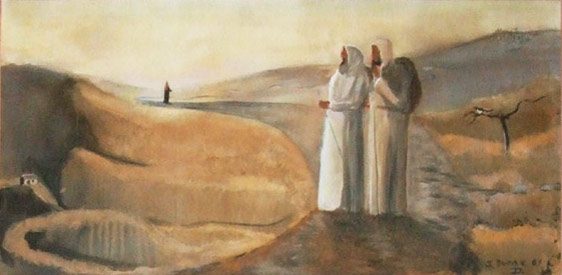
And so in this week's story, two disciples travel from disappointment to fresh insight, from discouragement to enthusiasm, from noting the absence of God to celebrating the presence of God. Their transformation comes about as they welcome a stranger into their midst, allow themselves to be vulnerable and as they experience God’s hospitality.
The shape of this story reminds me about the movement of worship.
First we welcome people into our midst, just as the two disciples welcomed the stranger, not knowing who he was. Later in the story they welcome the stranger into their home in an act of hospitality.
Next, the disciples share honestly with Jesus about how they are struggling. They acknowledge their disappointment, discouragement and confusion. This is a place of confession, a place of vulnerability, a place that we often try to hide from others, from God and even from ourselves. We need to tread carefully here and be gentle with ourselves.
Then Jesus opens the Scriptures with them. That must have been an amazing experience, which they later describe as having their hearts burn within them. Through God’s Spirit, these ancient texts continue to speak a word to us that is relevant and life-changing today.
When they arrive home, hospitality is offered and the guest becomes the host as he breaks the bread, in a scene reminiscent of Communion. Suddenly the disciples recognise Jesus’ presence with them.
Finally, the disciples’ eyes are opened and they discern it has been Jesus all along. They immediately return to Jerusalem to share the good news with others. This is mission, being sent out into the world with a message of hope and transformation.
What are some of the ways you recognise God's presence in your life?
Click here for worship@home resource
Journey to Faith - 26 April 2020
After the success last week of sharing virtual worship with over 40 others from Croydon and Croydon North UC, we will be holding a Zoom worship meeting this Sunday morning from 9.45 am. I will host the meeting from my home but it will be an opportunity to hold a larger (virtual) gathering and to see each others’ faces. We will be basing our worship on the attached worship@home resource for this week, so it would be handy to have a copy present. We can send you a link to the meeting or a phone number and meeting details if you sign up by emailing the Croydon UC church office on office@croydon.unitingchurch.org.au or using the form in the sidebar.
Those that are from a tradition that celebrates communion along with the story of the Emmaus journey may like to participate in the Communion of Empty Hands available below.
Posted: Friday, April 24, 2020 by Peter Mallen Tags: Luke 16:1-9, Luke 24:13-35Participate in Communion
For many people of faith, the inability to safely participate in communal church activities has been very difficult during COVID-19 restrictions. Here is an opportunity to receive the spiritual blessing of Communion without breaking isolation.
The recording was made as part of the collaborative Easter Sunday service for 2020.
Posted: Thursday, April 23, 2020 by CUC web admin Tags:It's OK to doubt
In this week’s reading from John’s Gospel, the disciples are not sitting around eating Easter eggs or having a party. They are afraid and meeting behind locked doors because of the Jewish authorities … and I’m sure they had lots of questions.
Then Jesus suddenly is there, standing among them.
Something dramatic and unexpected has clearly happened – Jesus was alive again and could be seen, touched, spoken to … it really was Jesus … but he was not the same as before – he could seemingly appear and disappear at will … and yet he speaks words of reassurance, three times saying ‘Peace be with you’. What is it about Jesus’ presence and words that gives the disciples – and us – peace and courage to live hopeful and outwardly focused lives?
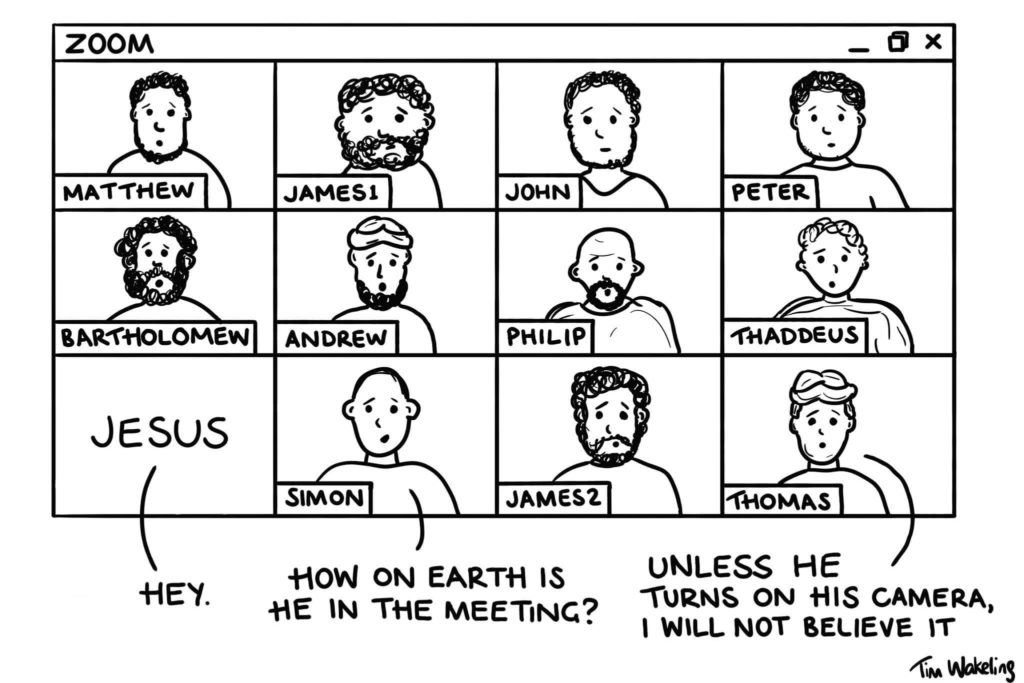
Then there is Thomas, introduced here as the Twin rather than by history’s less endearing tag of ‘Doubting Thomas’. He was nothing if not pragmatic and concrete … unless I see the scars and touch Jesus, I will struggle to believe. At different times, we all have questions and doubts about our faith. The experience of Thomas – and Jesus’ accepting response – shows that it’s okay to have doubts. As always, Jesus meets us where we are. According to John, the special blessing available to his readers – and to us – is to trust Jesus despite not having seen and touched him like Thomas.
This week we will be trying something new. For those with the interest and computer skills, we will be holding a Zoom worship meeting this Sunday morning from 9.45 am. I will host the meeting from my home but it will be an opportunity to hold a larger (virtual) gathering and to see each others’ faces. We will be basing our worship on the attached worship@home resource for this week, so it would be handy to have a copy present. We can send you a link to the meeting if you sign up using the form in the side column or email the church office.
Click here for
It's OK to doubt - 19 April 2020
He is risen!
The greeting of the Orthodox Church at Easter is:
Christos aneste! Christ is risen!
Alaythos aneste! He is risen indeed!
Look – the tomb is empty!
Where can our Lord be found?
He is not here.
He is risen!
Alleluia!

This last summer saw unprecedented bushfires that burned from Queensland down much of the east coast as well as in parts of Tasmania, South Australia and Western Australia. Millions of native animals and birds died, forests were scorched and many people lost their homes.
Lives were lost. Memories were seared with images of huge flames and the sky turning red and even black. Yet out of the destruction, new life is now emerging. Where there was only death, there is now hope.
So it was at the first Easter. Their leader, the one whom they hoped to be the Messiah, the self-confessed Son of Man, had been arrested, tried, mocked, beaten and killed. His body had been laid in a tomb and the entrance sealed with a large stone. Their hopes now lay in tatters, their future now painful and uncertain.
Yet strange news was afoot on Sunday … the stone was rolled away and the tomb was empty. Jesus, it seemed, had mysteriously risen from the dead. In the wilderness, their experience of the empty tomb was transformed into vibrant hope. Joy and laughter replaced tears and sadness. The world would never be the same again.
In our troubling times, may we find our place in this story.
And may hope and the possibility of new life drive away our sadness and gloom.
Christ is risen! He is risen indeed!
Enjoy a joyful recording of the traditional song Christ the Lord is risen today
Or participate in a full worship service recorded by the members of Croydon, Croydon North, Heathmont, Ringwood and North Ringwood Uniting Churches.
Posted: Sunday, April 12, 2020 by Peter Mallen Tags:A Lament for Good Friday
During these days, the threat of Covid-19 seems to always lie before us. Rather than be depressed by the endless statistics, I invite you to join me in praying for our world during this pandemic. The prayer is modelled on the many laments found in the book of Psalms.
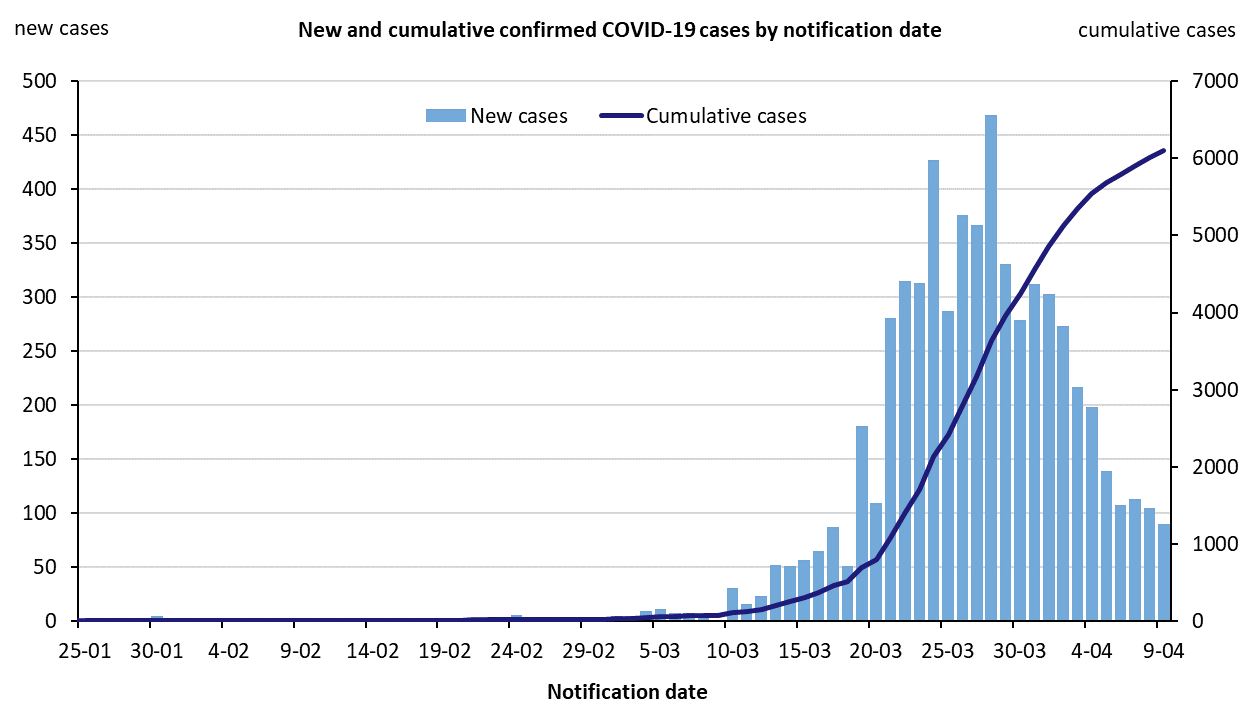
Hear our cry, Almighty God, even as we remember the suffering and death of Jesus. Listen to our prayer and our cries for our world.
How long will we have to hide in our homes from this invisible enemy?
Where will it strike next? And whom? And what if…?
Our screens relay a continuous escalation of suffering and death around the world.
Fear and anxiety abound.
Yet we are the privileged ones with safe homes to withdraw to and plenty of food.
Many in neighbouring countries are not so fortunate.
We plead for them and their safety.
For those who feel forsaken and torn away from loved ones,
Lord hear our cry.
For those who are mourning the ones who have died due to this sickness,
Lord hear our cry.
For the health workers, emergency workers and scientists grappling with this virus,
Lord hear our cry.
For those in government and in hospitals making difficult decisions,
Lord hear our cry.
For the most vulnerable in our society who feel so alone and helpless,
Lord hear our cry.
Creator God, your word promises that one day
you will liberate creation from its bondage to decay and death.
One day you will make all things new again.
We long for that day.
But today, from the depths of our confusion, we cry out to you.
We beseech you not to turn your face away.
Rescue us, God of compassion and grace.
Help us to be still and wait for you. Amen.
You may wish to watch the service from this morning that has been put together by the members of Croydon, Croydon North, Heathmont, Ringwood and North Ringwood Uniting Churches.
Posted: Friday, April 10, 2020 by Peter Mallen Tags:Good Friday 2020
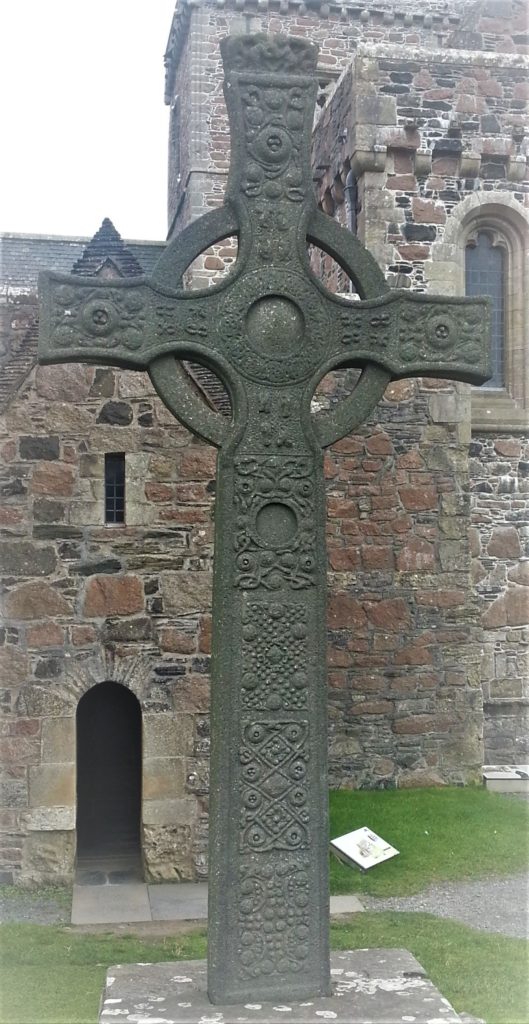
We all approach Good Friday with mixed emotions. Even the name of the day can be confusing and confronting. What is ‘good’ about this day? The answer to that question depends very much on your perspective.
As we are not able to meet together to hear and reflect on the message of Easter that lies at the centre of our Christian faith, perhaps this year we will more easily engage with the solemn message of Good Friday with its focus on suffering and death, given all that is happening across the world. But even here we will remind ourselves of the love and compassion at the heart of the story, qualities that are also being seen across the world in various ways in every community.
If you wish to engage with and participate in an online service on Good Friday and Easter Sunday, a collaborative team from Ringwood North, Ringwood, Heathmont, Croydon and Croydon North Uniting Churches has prepared services for you. These will be broadcast from the North Ringwood Uniting Church website at 10 am on the respective days. Go to the website and under the large LIVE banner, click ‘Watch’. You may write comments during the service which will appear on the right hand column of the screen.
This Easter, I encourage you to sit with the bleakness and sadness of Good Friday and not rush ahead or read on to Easter until Sunday. Then feel free to go wild with your celebrations and to call or Skype each other to pass on your Easter greetings.
Click here for
worship@home for Good Friday 2020
An Easter message from the Moderator, Rev Denise Liersch, can be found here.
An Easter message from the UCA President, Dr Deidre Palmer, can be viewed from Sunday.
Posted: Wednesday, April 8, 2020 by Peter Mallen Tags:An ambiguous Palm Sunday

This week is Palm Sunday. In contemporary Christian worship, this day is often treated as a joyous and victorious day of celebration, where we wave palm branches and sing Hosanna songs. It is also the day for the annual peace march, or in more recent years the march for justice for refugees.
Yet in the Gospel records, Palm Sunday is a more ambiguous day. In these accounts we are told how Jesus stage managed his entry into Jerusalem riding on a donkey, and how a large crowd gathered to cheer him on with shouts of Hosanna. Many onlookers, however, were critical, felt threatened or were unmoved.
According to John’s account, the disciples don’t yet understand the significance of what is happening. While in Matthew’s account the whole city is shaken (Greek seio from which we get English words like seismic). But what is really going on and what message are Jesus (and the Gospel writers) trying to convey?
We need to remember of course that this is the entry point to Holy Week, the first act in a rapidly moving drama that swirled around Jesus. So when we start to get overwhelmed by what is happening in the world around us, let’s remember that we are part of a much bigger story, God’s story, and let’s ponder our place in that bigger story.
Click here for
worship@home resource 05 April 2020
Welcome to a new world

So much has changed in the world we know in the last 10 days. We have gone from a normally functioning society to one where we are told to stay home indoors for the foreseeable future to reduce the spread of corona virus. Our country is slowly being locked down. Tens of thousands of people have lost their jobs. Share markets and investments have crashed.
Streets and stations are eerily quiet. The footy has been cancelled for months. Supermarkets are calm again – although many shelves remain empty. There is a feeling of grimness and heaviness that we all feel. These are serious days.
The church is affected just like every other group. Our Sunday services will no longer be happening. Groups such as Playgroup, weekly Tuesday community lunches, Evening Fellowship, Drop-In, the Pastoral Care service have all been postponed until further notice. Funerals, if required, will be limited to ten people. Weddings to just five people. We are working with Maroondah Council to see if we can keep Helping Hand open with a new set of younger volunteers.
What all this illustrates is how fragile our society really is. So much of what we rely on day to day has been cancelled or taken away. So in times like this, where do we turn to for hope and reassurance? One passage that I’ve been reflecting on this week is Philippians 4:4-7, where Paul is encouraging the church community not to turn inward and not to lose hope. He reminds them that God is always near and that when we feel anxious or worried we are urged to pray and make our requests known to God. This helps lift the burdens we are carrying. Mysteriously, in exchange we will receive God’s deep and enduring peace in our hearts.
Click here for
worship@home resources for 29 March 2020
For the next several weeks or months – however long these restrictions last – a weekly resource for worship at home will be prepared and emailed out/delivered on a Friday. News from the community will also be circulated. If you have a good news story to share, an encouragement or a need for prayer, please contact Peter Mallen or Peter Mitchell in the Croydon office and we will include these as part of our weekly church@home. Hopefully you will also receive a friendly phone call from a member of the congregation. You are of course encouraged to keep in touch with your friends and family by phone or Skype or Facebook Messenger or whatever technology you feel comfortable with.
This week for the Exploring faith group we trialled a video conferencing app called Zoom so we can meet together from the comfort and safety of our own homes. We will also be using this app for future Church Council meetings. We are exploring various options for how we might record the whole or parts of a worship service and upload to the website (https://croydon.unitingchurch.org.au/).
Through these days, remember that we are not alone because Jesus has promised to be with us always (Matt 28:20). We also have the support of each other. So stay strong and remember to be kind and loving towards others.
Rev Dr Peter
Mallen
A few light-hearted insights from Facebook this week
From a UCA church noticeboard:
Dear God, Can we reboot 2020? It has a virus that is shutting everything down.
For the first time in history, we can save the human race by laying down in front of the TV and doing nothing. Let’s not screw this up!
Day 5 of social distancing: Struck up a conversation with a spider today. She seems nice. She’s a web designer …
I just asked a six year old if he understands why there is no school today. Serious as heck answer: because they are out of toilet paper.
Posted: Saturday, March 28, 2020 by Peter Mallen Tags: Philippians 4:4-7A Prayer for a Pandemic

May we who are merely inconvenienced
remember those whose lives are at stake.
May we who have no risk factors
remember those who are most vulnerable.
May we who have the luxury of working from home
remember those who must choose between
preserving their health or making their rent.
May we who have the flexibility
to care for our own children when their schools close
remember those who have no options.
May we who have to cancel our trips
remember those who have no safe place to go.
May we who are losing our margin money
in the tumult of the economic market
remember those who have no margin at all.
May we who settle in for a quarantine at home
remember those who have no home.
As fear grips our country,
let us choose love.
During this time when we cannot physically
wrap our arms around each other,
let us yet find ways to be the loving embrace of God
to our neighbours.
Amen
(Source: Queensland Churches Together)
Below are some resources to help you worship.
A recording of the worship at CUC led by Paul Chandler will be uploaded soon. Please try again later.
Download Peter's worship liturgy for Croydon North here (PDF):
Download and read Peter's message on Jesus, the light of the World here (PDF):
Posted: Thursday, March 19, 2020 by Peter Mallen Tags:Are you listening? Are you following?

This week we bring our series on the Sermon on the Mount to a close as we explore Matthew chapter 7. The most memorable verse in this section is verse 12 – the so-called ‘golden rule’ - that reads ‘Do to others as you would have them do to you’. This simple and positive statement provides a summary of the sermon as a whole and links back to Jesus’ earlier calls to live out what he says.
This ‘rule’ is not actually a rule at all, but rather is about priorities and heart attitudes that lead onto actions. If our heart is concerned with status or wealth-seeking, or having power over others, or anger when our demands and wants are not met, then we will struggle to live in the way Jesus intends. However if we focus on generosity, compassion, justice and mercy then our lives will reflect the way of Jesus.
Download and read
Sermon on the Mount – Jesus’ blueprint for life
(PDF) or listen to Peter Mallen preach from 15 March 2020 (audio only):
What do you treasure?

This week we are continuing to explore the challenging message from the Sermon on the Mount. Matthew lists two particular challenges in chapter 6 that may prevent us from whole-heartedly following the ways of God. They are worrying what other people may think of us (6:1-18) and the lure of material possessions (6:19-34).
We may not often pause to recognise it, but we live in an extremely materialistic culture and have money and possessions beyond the imagination of most of the writers of the NT. Jesus warns us that these material blessings are a direct threat and competitor to our devotion to God. Our hearts are beholden to what we treasure.
One definition of what we treasure is what we could not bear to lose. So I wonder how we might cope with losing everything we own (as many families experienced during the bushfires over summer). Ultimately it’s a matter of trust – do we really trust that God will somehow provide what we need (our ‘daily bread’)? If the answer is yes, then we can hold lightly to our possessions. If the answer is no, then perhaps we do treasure what we own more than our relationship with God.
Posted: Friday, March 6, 2020 by Peter Mallen Tags: Matthew 6:19-34Jesus’ upside down message
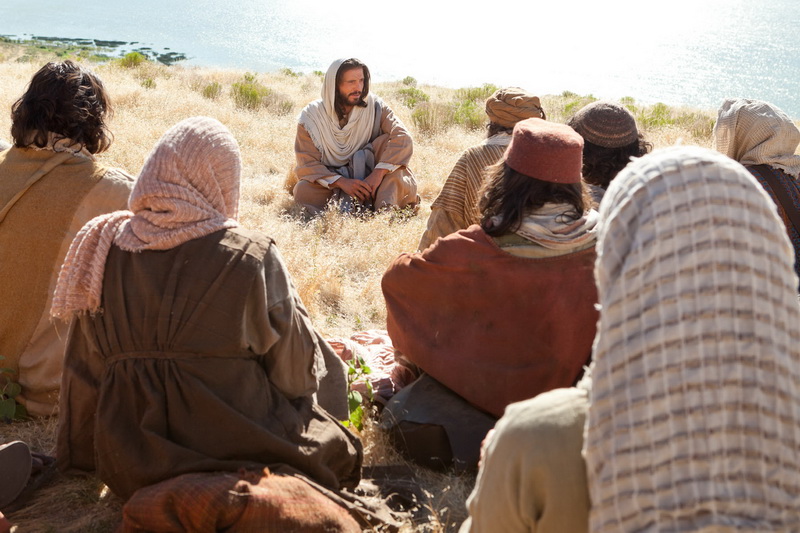
This week we are exploring two very famous passages – the beatitudes that begin the Sermon on the Mount found in Matthew chapters 5 and the companion text from Micah chapter 6, namely the call to do justice, love kindness and walk humbly with God.
How do we ‘hear’ these passages afresh? The instructions in Micah 6, for instance, are easy to mentally l agree with, but very challenging to live out. They require no less than to reflect the character of God in how we live. And if justice lies at the heart of God, then how are we, personally, actively pursuing justice for our indigenous peoples, or asylum seekers, or those living on Newstart allowance? If we are not making a personal response to do justice then have we really heard the call?
The beatitudes are equally challenging. Our tendency is still to think that the ones God blesses are the rich, the powerful, the healthy, etc. Instead Jesus says that God’s blessing is available to all of humanity, even for the types of people we regard as hopeless, those – we think – who are beyond God’s interest or care. If we allow them to, these beatitudes will change how we see other people and direct us to the sorts of people Jesus naturally gravitated towards.
Download and read the whole message here (PDF):
Posted: Thursday, January 30, 2020 by Peter Mallen Tags: Matthew 5:1-12, Micah 6:1-8, Micah 6:8Jesus calls disciples to community

This week’s reading has Jesus walking by the Sea of Galilee and calling two sets of fishermen brothers. According to the presentation in Matthew, they immediately leave their nets, their homes and their livelihoods behind and go with Jesus. The first community of followers of Jesus is thus formed.
One question that quickly springs to mind is how and why these practical folk just dropped everything to follow Jesus. We suspect there is more back story (as hinted at in Luke’s and John’s accounts) but here we’re not told. A second question may be what did Jesus see in these four fishermen (as well as what they saw in Jesus). I think Jesus saw potential, courage and resilience. I wonder what qualities Jesus sees in you (perhaps these and other talents)?
This Sunday is also Australia Day, the increasingly contested day on which we celebrate ‘modern’ Australia. In doing so, we risk continuing the colonial project of suppressing indigenous people and excluding their story and their history. Let us be mindful then of how we, as part of the dominant culture, treat other groups in our society.
Posted: Friday, January 24, 2020 by Peter Mallen Tags: Matthew 4:12-22Learning from our indigenous brothers and sisters
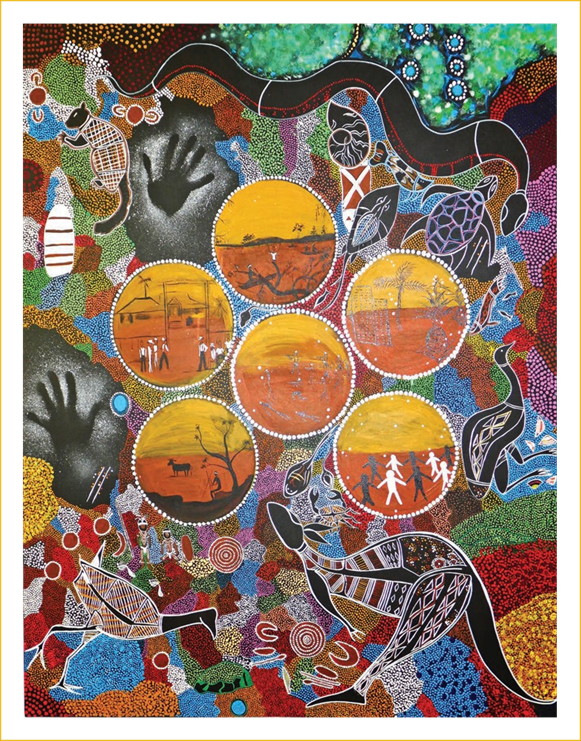
We will again be having a Day of Mourning service in the lead-up to Australia Day, as suggested by the UCA Assembly. President Deidre Palmer writes, ‘the service encourages us to pause to remember the violence and dispossession inflicted on our First Peoples, and to lament that as a Church and as Second Peoples, we were and remain complicit. It is an opportunity for us to listen and learn of the hurt that has been passed down through generations of First Peoples and the ongoing disadvantage and injustice they still experience. Importantly it is an invitation to us to follow in Christ’s way of justice, healing and reconciliation, building relationships of truth and healing in our own communities and in our nation’.
Will you join me in continuing to pray for justice and healing in our nation?
Download and read the whole message here:
Learning from our indigenous brothers and sisters
The heart of baptism

This week we jump from stories of Christmas and the birth of Jesus to the account of his baptism by John. This account is quite brief and doesn’t address the questions we may have about baptism (e.g. why was it necessary for Jesus to be baptised? what is the ongoing significance of our baptism?). When this reading is placed alongside the reading from Isaiah 42:1-9, however, we begin to see some common threads.
First, baptism is about being named and affirmed by God. In Isaiah the people are named as God’s servant in whom God delights. Jesus is named at his baptism as God’s Son with whom God is well pleased. Similarly for us, we are named and affirmed as God’s children at our baptism.
Second, baptism is about being empowered or equipped for ministry and for our vocation in the world. God’s Spirit is placed on the servant in Isaiah and descends on Jesus at his baptism in the form of a dove. Similarly for us, at our baptism we invoke God’s Spirit to bless and equip us for living a godly life (in the baptism liturgy this is marked by the several responses that begin ‘With God’s help…’).
Following these commitments by God towards us, the third thread is our commitment to God, or our purpose in the world. For the servant in Isaiah it is to bring justice and light to the nations. For Jesus it is to announce and establish the kingdom of God. As followers of Jesus, our baptism calls us to join Christ’s ministry in the world. This involves loving our neighbour as ourselves, striving for justice and peace, respecting the dignity of and seeking Christ in every person, and proclaiming the good news of God in Christ by word and example.
These commitments are ongoing and apply to every Christian, irrespective of our age or stage of life. This is a high calling that is only possible with God’s help and direction. So this week, and every week, let us remember our baptism and be thankful.
Download and read the whole message here:
Posted: Thursday, January 9, 2020 by Peter Mallen Tags: Isaiah 42:1-9, Matthew 3:13-17The Christmas road less travelled
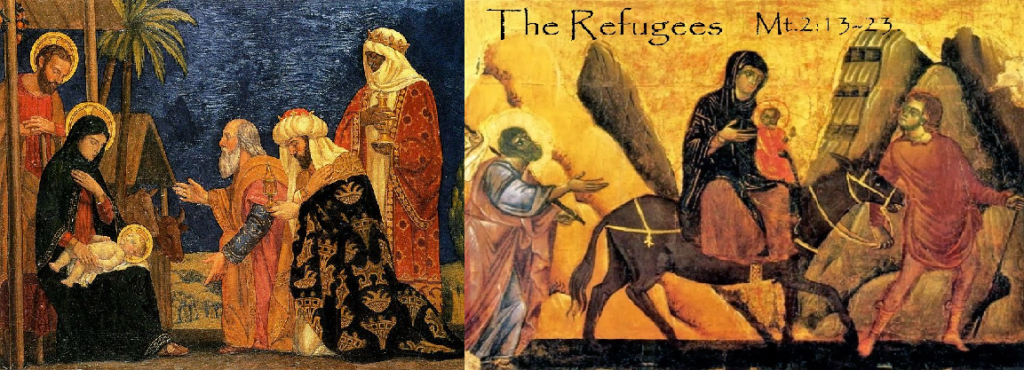
This week is Epiphany when we hear the ‘other’ Christmas story from Matthew’s Gospel. It’s much darker, grittier and more dangerous than the family friendly Christmas story from Luke’s Gospel. Wise men from the east (non Jews) come seeking Jesus to worship him, while the Jewish rulers in Jerusalem either ignore the one born to be king or plot to kill him.
How are we to hear this story? Is it a story of God calling the stranger into the fold of blessing? Is it a story of evil that tries to squash any threat to the status quo? Is it a story of resilience in the midst of adversity as the family flee as refugees? Is it a story of God’s grace, or a story of grief as the innocent children are murdered, apparently forgotten by God?
The Christmas story as told by Matthew contains all these elements and more. It shows that those in power will fight to hang onto their power. It also shows that God’s blessing is not restricted to any one group or culture. Perhaps Matthew is telling us in stark terms that the gospel is always heard in a contested space. The question for us is whether we are helping or hindering the spread of this message of good news.
Download and read the whole message here:
The Christmas road less travelled
What is the significance of the Christmas story for you?
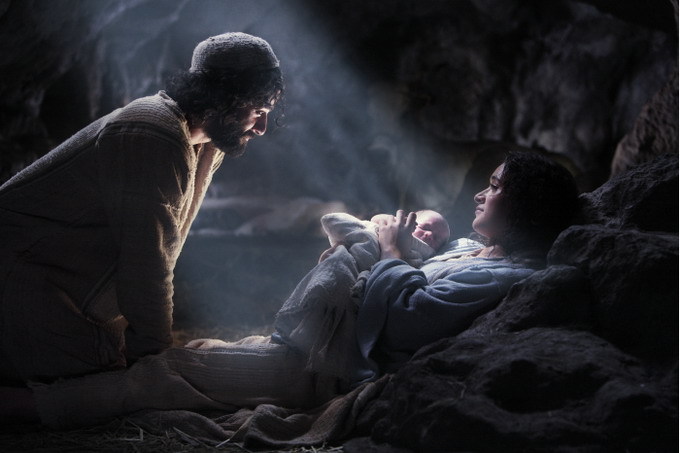
Christmas is here! For many of us this means a time to gather with family and friends and share a sumptuous meal. For others, this day brings sadness as we remember those no longer with us, or loneliness as we have no place to go. For those newly arrived in Australia, from various religious backgrounds, Christmas Day is a confusing experience as a secular country stops for a religious festival.
The four Gospel accounts of the life of Jesus are equally split in how they present the story and significance of Jesus’ birth. The earliest Gospel, Mark, makes no mention of it at all. Matthew and Luke in their own way address this omission. Both these Gospels stress God’s pivotal role in events, with Matthew telling the story from Joseph’s perspective and Luke from Mary’s perspective. The final Gospel of John takes the story way back to creation to stress the divine nature of Jesus.
For those of us who profess to be followers of Jesus, it’s difficult to free the Christmas story from its cultural and materialistic wrappings. At its heart, though, the story speaks of God acting to bring light and love into a darkened world through the person of Jesus. His birth marks a new beginning, offering new possibilities. How has this story shaped your life? What is its significance for you?
Download the Christmas Eve message to read here:
Download the Christmas Day message to read here:
What is the significance of the Christmas story for you?
Joseph’s role in the Christmas story

The main human players in the Christmas story are Mary, Joseph and Jesus. Yet Joseph is often a secondary character, off to the side as it were, as if we are uncertain what to do with him. After the birth stories, Joseph disappears entirely from the narrative, while Mary has several more appearances.
In Matthew’s version of the Christmas story, though, Joseph has a more major role than Mary. He is the one who has to respond to Mary’s unexpected news about her pregnancy, he is the one who organises their escape to Egypt and he is the one who brings the family back to Nazareth. He is also the one who names the child Jesus. How much of this is historically accurate we don’t know, but Joseph is presented as someone who is upright in character, who stays calm and who is practical.
Joseph is a good example of a support person, the quiet behind the scenes person who gets things done and who serves in a no fuss way. So often in history, it is women who fulfil such a role, but here it is Joseph. What might we learn from his example, his trust in God and his practical action?
Download and read the whole message here:
Unpacking the image of Immanuel
An alternative vision

This third Sunday in Advent is often called Joy Sunday, when we remember the song that is sung by Mary (called the Magnificat). Despite her challenging personal circumstances, Mary sings of God’s blessing and God’s alternative vision for the world that will come through her child, Jesus.
One of the interesting aspects of Mary’s song is that it is expressed in the past tense, as though God has already accomplished the overthrow of the rich and powerful and has already raised up the poor and fed the hungry. When we look at the world we realise that this alternative vision has not yet arrived. This may cause us to doubt and question like John the Baptist does in our second reading this week. Or we may rejoice with Mary and commit ourselves to help make this vision a reality.
In the words of an old Benedictine prayer, may God give us enough foolishness to believe that we really can make a difference in this world, so that we are able, with God's grace, to do what others claim cannot be done.
Download and read the whole message here:
Posted: Thursday, December 12, 2019 by Peter Mallen Tags: Isaiah 35:1-10, Luke 1:46-55, Matthew 11:2-11Daring to say ‘yes’ to God

Clearly there were rumours circulating regarding the legitimacy of Jesus that both Matthew and Luke address in their own way. Matthew begins his story about Jesus with a stylised genealogy. Scattered among the more than 40 men are four women – Tamar, Rahab, Ruth and the wife of Uriah (i.e. Bathsheba). Each of these strong women have a somewhat dubious sexual history – forced upon them by men wielding privilege and power. These women help to introduce Mary, the wife of Joseph, of whom Jesus the Messiah was born (Matt 1:16).
The story of Mary’s encounter with the angel Gabriel in Luke 1:26-38 takes on new reverberations in light of the #metoo movement, as women report on unwanted sexual advances made against them. Did God take unfair advantage of Mary by overpowering her (Luke 1:35)? What would have happened if Mary had said ‘no’?
The result of Mary’s co-operation with God’s demand is that she holds the exalted title of Theotokos (God-bearer) and may be regarded as both a prophet (e.g. Luke 1:47-55) and model disciple (e.g. Acts 1:14). Although God may not ask of us something as dramatic as God called Mary to, the question remains whether we dare to follow Mary’s example and say ‘yes’ to God.
For a brief overview of the book of Matthew download
Welcome to the world of Matthew
Or download a Bible study with leaders notes that explores these 5 women.
Advent 1 Study - Adults Only Christmas Story
Download and read the whole message here:
Posted: Friday, December 6, 2019 by Peter Mallen Tags: Luke 1:26-38, Matthew 1:1-17The hope and challenge of Advent

Welcome to the season of Advent, a time of waiting and preparing for the coming of Jesus. This first Sunday is often called Hope Sunday or sometimes Prophets’ Sunday. It is a day to remember the ancient words of the prophets pointing to the hope of transformation and justice, a hope born out of trust in God’s faithfulness to make things right.
Advent begins by acknowledging that there is much in our world that needs transformation, whether we think of violence and wars, poverty and inequality, the gathering climate emergency, or the growing number of displaced people looking for a safe home. Jesus told us not to be alarmed by such situations but rather to stay awake and to keep sharing the good news through our words and actions.
The challenge for us and every generation is that Jesus left no timelines or detailed plans for us to follow. So we have to read our context and respond as we are able. How does the season of Advent fill us with fresh enthusiasm and hope as we contemplate being agents of change in the world?
Download and read the whole message here:
The hope and challenge of Advent
The king in God’s upside down kingdom

This Sunday is called Christ the King Sunday. The image of Christ as a king, seated on a throne, always seems slightly jarring. Yet the later writings of the NT often portray Christ as ruling at God’s right hand and, in the book of Revelation, as a figure of unimaginable power and glory.
What do we learn from this image? First we need to get our heads around the fact that Jesus is a King. That is what the title ‘Christ’ implies in Greek, which is a translation of the Hebrew ‘Messiah’, Anointed One or King. A better question is how did a crucified pretender king come to be known and worshipped as a king, and as a rival to Caesar.
Second, what sort of king is Jesus and what sort of kingdom does he reign in? Our discipleship has most likely taught us to regard Jesus as a servant king who establishes God’s upside down kingdom through his ministry of teaching and serving. Yet early Christian hymns such as the one found in the Colossians reading suggest a far wider role as co-Creator and as the reconciling agent between God and humanity, no less than the human face of the invisible God. Again, a better question is how will we approach this king – both in worship and in our everyday life.
Download and read the whole message here:
The king in God’s upside down kingdom
Living in community

Building strong relationships is hard work. Of the many aspects involved, we might choose the following as important requirements: availability, mutual respect, communication, shared interests and time.
Leaders in the early church had a challenging role to bring communities together and help them come to a common sense of identity and purpose, given the diverse religious and social background of the members. The writer to the Colossians lists some key ingredients that they saw as necessary. One was obviously a shared faith in Jesus as Lord and recognition of the God of Israel as the one true God. Beyond these core faith commitments are listed compassion, kindness, humility, willingness to forgive, love and thankfulness.
This week as we come together with our friends from Croydon Parish Players to celebrate their 63 years of performing theatre together and to bless them for the next chapter in their journey, it is worth noting that what makes this group tick – beyond a shared passion for theatre and performance – is their emphasis on building Christian community. It is this aspect that attracts and grows their members. The question for all of us is how are we making the investments needed to build strong, deep and resilient communities?
Download and read the whole message here:
Living in community
Responding to critics

Life throws up various challenges – at a personal, community, national and even global level. How we respond to these challenges is a mark of our maturity and also our compassion. I remember clearly the response of President George Bush in the aftermath of the 9/11 attacks in the US – it was all about revenge, violence and instigating a war on terror. I also remember clearly the response of NZ Prime Minister Jacinda Ardern following the mass shootings in a mosque in Christchurch – that was focused on compassion and kindness. Only one of these leaders professes to be a Christian and only one of the responses is Christian. Yet words and actions do not always line up.
In this week’s Gospel reading, Jesus is confronted by some of his critics during the week leading up to his passion. The Sadducees were responsible for the running of the temple in Jerusalem and their opposition to Jesus is based on what they perceive as his threat to their power. They wish to entrap and eliminate Jesus, an approach similar to that of President Bush as described above. The response of Jesus is both wise and compassionate, more similar to the response of Prime Minister Ardern.
When we are confronted by critics and challenging situations, how do we respond? Do we follow the violent ways of the world or the ways of God’s upside down kingdom?
Posted: Saturday, November 9, 2019 by Peter Mallen Tags: Luke 20:27-38, Psalm 145What do justice and peace look like?

The cry of the prophet Habakkuk still resonates strongly today. Why must we look at the world and see violence, destruction and injustice? Why does God not act? Why does justice often not seem to prevail? The Gospel story about Zacchaeus starts from a similar position … 'why can tax collectors continue to rip off ordinary people and get away with it', questions the crowd?
But when Jesus spots Zacchaeus looking down at him from a tree, Jesus sees something more than a disreputable tax collector. He sees an opportunity for transformation, for justice and for reconciliation. In the face of hospitality and grace, lives are changed. Jesus names this change as salvation, but he could also have said that peace and wholeness has come to the situation, both for Zacchaeus and for his neighbours.
The world often appears to be in a mess with justice and peace far off. The insight of Jesus is that even the most contentious issues and people can be transformed with a change of heart that leads to changed action. The message from the prophet is not to give up or give in to injustice but to be patient and work towards justice.
Download and read the whole message here:
What do justice and peace look like?
Relationship not rules

Many – if not most – Christians pray. In extremis, many non-religious people also pray. But why do we pray? We may pray out of a sense of desperation, or from a sense of Christian duty, or because we want to change the outcome of a situation. It seems that the desire or need to pray is fairly primal.
In this week’s Gospel reading from Luke, Jesus tells a parable about the contrasting prayers of two people. One of the people is deeply religious and appears to live a good life. His lengthy prayer reminds God of his devotion to following God’s ways. The second person prays a short prayer from the heart, acknowledging his brokenness and need for God’s help to turn his life around.
One prayer is focused on following rules while the other is wanting to restore relationship with God. One prayer comes from a place of self-confidence while the other is a cry for help and mercy. Which of these approaches does Jesus commend? Which approach is more typical of your prayer life?
Download and read the whole message here:
Relationship not rules
Some essentials of faith

I wonder what you regard as being essential to your faith. Is it your personal relationship with God, strengthened through practices such as prayer and reflection on Scripture? Is it being part of a worshipping community who gather each week for encouragement? Is it the call to make a difference in the world through loving others and seeking justice?
This week’s readings offer some insights into what Jesus and Paul regarded as some essentials of our faith. The first is that our faith can often feel small and fragile. Jesus compares it to a mustard seed, while Paul notes that we can feel intimidated by those around us if we speak up about our faith. While our faith might be small, we have faith in a powerful God, who delights to work in and through our life through the Spirit.
The second insight is that our faith – thankfully – is built on God’s grace. There is nothing that we can or must do to earn God’s favour. This is a huge blessing and a truly distinctive part of Christian faith. It also means that we can make no demands on God. As Jesus reminds us, we are to regard ourselves as servants, following in his servant footsteps.
How are these insights informing your everyday faith?
Download and read the whole message here:
Some essential lessons about faith
Making kingdom use of money

This week’s Gospel reading from Luke features a topic that many of us feel uncomfortable talking about in church – namely money. But Jesus clearly thought it was an important topic to talk about as around two thirds of all his parables feature money and our attitudes towards money.
Here Jesus shares a puzzling parable about a rich man (God?) and his less-than-honest manager (Israel?) who is looking after his affairs. The manager is called to account for his stewardship – how he has mistreated the wealth of his master. The manger quickly devises a crafty plan to make new friends for himself – reduce the amount of what the master is owed so that the poor debtors will be grateful and make him welcome.
The intended lesson? Use the resources at your disposal – including money – to make friends with the poor and outcast – because it is the generous and those who welcome the poor who will inherit the blessing of God’s kingdom. The parable asks we rich folk a challenging question – how are we using the resources at our disposal to welcome such people and to share God’s good news with them?
Download and read the whole message here:
Making kingdom use of money
Frontier Services – standing with people in the bush
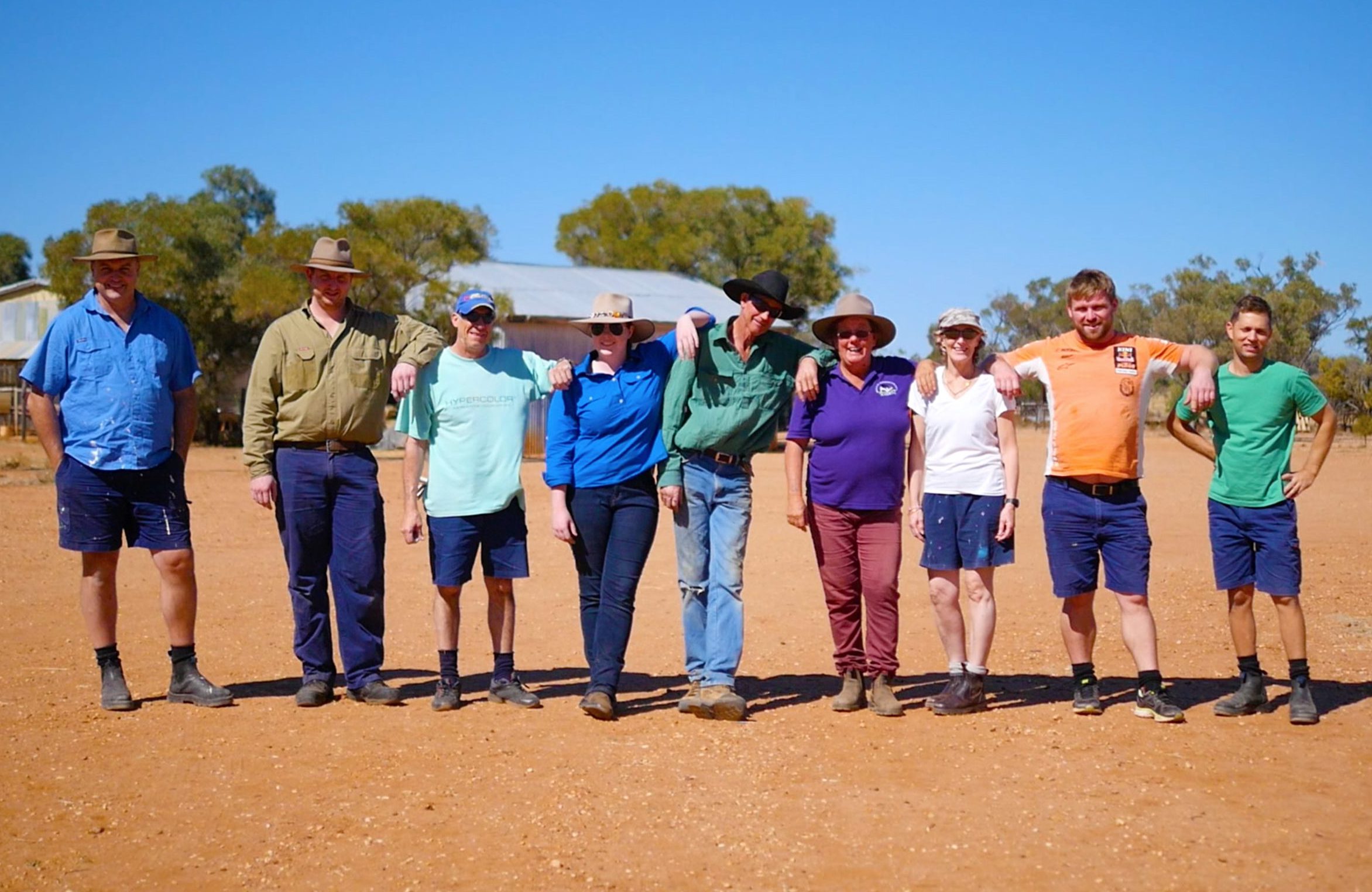
This week we are remembering and celebrating the work of Frontier Services, the part of the Uniting Church that ministers to people in outback and remote parts of Australia. The vision of Frontier Services:
We dream of an Australia where everyone who lives in our regional and remote areas are cared for and supported, and have a mantle of safety and well-being. Australian people who live out bush experience the tyranny of distance and social isolation. These include indigenous communities, isolated properties, mining communities, and other remotely located communities. And for them, we are the people who knock on the door, take the time to listen, offer a helping hand, and be of service.
Living in outback Australia is always challenging – with regular droughts and floods - and just recently bushfires. Regional communities are doing it tough at the moment and don’t have the same access as city folk to health and other support services. Let us take some time this week to remember and pray for these folk.
For those who are available, there is a Great Outback BBQ happening this Sunday at St Margaret’s Church in Mooroolbark from 12.30 pm with all proceeds raised going to support Frontier Services.
Posted: Friday, September 13, 2019 by Peter Mallen Tags: Isaiah 40:28-31, Psalm 46:1-5The high cost of following Jesus

The bad news of this week’s Gospel reading is that there is a high cost to following Jesus. He cautions would be followers to sit down and count this cost before becoming a disciple. The cost includes putting trust in Jesus above even close family relationships, the readiness to suffer if need be, and the call to hold lightly onto material possessions. These are hard calls in our individualistic, pain averse and materialistic culture.
The good news of the passage is that God calls us to persevere in the life of discipleship even when our circumstances seem tough. The cost may be high. We may be misunderstood by our families and mocked by others. We may have to let go of things we hold dear. But this week’s psalm (139) reminds us that wherever we go, and whatever we do, God is with us, always.
When we are prepared to pay the cost – and to live a life of loving, serving and caring for the least, the outcast and the unlovely – that’s when the gospel message shouts most loudly from our lives.
Download and read the whole message here:
The cost of following Jesus
Practicing hospitality

Offering hospitality to a stranger was and remains an important part of many Eastern cultures. So when we read the Gospel accounts of Jesus’ ministry, it’s not surprising that many of his interactions and much of his teaching happens around the meal table. Who you ate with and who you welcomed to your table were key indications of your social status.
The reading this week from Hebrews 13 suggests that when we show hospitality to strangers we may be entertaining angels without being aware of it, a likely reference to the story in Genesis where Abraham cares for the needs of three passing strangers, as captured in this famous icon originally written by Rublev. In the icon, it is the three persons of the Trinity who offer hospitality to Abraham, symbolized in the chalice of Communion.
Jesus suggests that when we have a luncheon or dinner, we have the opportunity to invite people beyond our circle of friends and family – the poor, crippled and blind – who cannot repay us. In this way we reflect the hospitality and welcome of God, which is offered freely to everybody. How open and inclusive is our hospitality – as individuals, as a community and as a nation? How might we enhance this vital ministry?
Download and read the whole message here:
Practicing Hospitality
Getting the Sabbath balance right
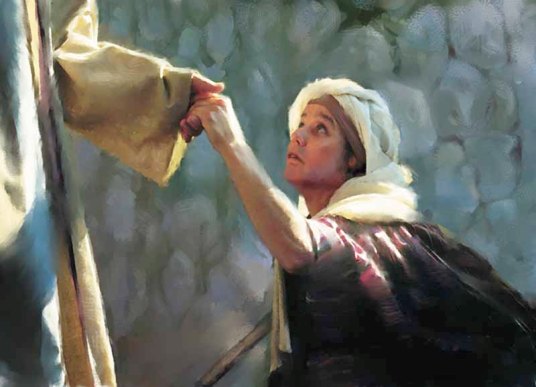
The Sabbath day is a most holy day for Jewish people. It is the day that God rested after finishing creation (Genesis 2:2-3). It is a day of rest instituted in the Ten Commandments when people were to remember the mighty deeds of God (Deut 5:12-15). And it was a day that consistently saw Jesus in trouble with the authorities for having the audacity to engage in ‘work’.
Jesus undoubtedly viewed the Sabbath as a day of worship, because his practice was to attend synagogue (church) on that day. But he also viewed the day as an opportunity to bring healing and wholeness to people, a day to celebrate and enhance life, as recounted in this week’s Gospel story in Luke 13:10-17, where he frees a crippled woman from her affliction.
How do we view and utilise the gift of a Sabbath day? Do we take a day of rest to refresh our bodies, minds and spirits and remind ourselves that the world will keep going without our input? Do we take a day to immerse ourselves in creation or spend the day with those we love? And do we also do what is needed on this day to bring healing, wholeness and justice in our world?
Download and read the whole message here:
Getting the Sabbath balance right
Following Jesus, the beginning and end of our faith

The life of faith is often compared to a journey or walk through life. In this week’s reading from the book of Hebrews, it is compared instead to a race that has been set before us. The metaphor of a race is interesting because when we think of races, we tend to think in terms of speed and winners and losers.
But this race is different. The beginning and end point of this life race is Jesus. He is to be our inspiration and pattern, and also the goal we are aiming for (both in the development of our character and in relationship). The focus of this race is on perseverance and the need to keep going even if we stumble or trip. It’s not a solo race, but rather one engaged in with others, including the cloud of witnesses who have run this race before us and from whom we can learn.
The author then gently reminds us that in his race, Jesus endured the shame of the cross for the sake of the joy set before him. If we are to fix our eyes on Jesus, then, we need to be prepared to run our race with perseverance, with courage and with joy, whatever lies before us.
Download and read the whole message here
Following Jesus, the beginning and end of our faith
Remembering the good work of Uniting

This week is Homelessness Week when we are encouraged to remember people experiencing homelessness, the issues they face and the action needed to achieve enduring solutions (especially secure housing). Homelessness Week came about from various churches and missions running winter vigils to remember people who had died on the streets. These vigils were normally held in August as it is the coldest time of the year and when most people were likely to be overcome by the elements.
This Sunday is also Share Sunday, the day on which we remember and support the many ministries of Uniting, the community services arm of the Uniting Church. In our neighbourhood, Uniting Connections at Croydon work with struggling families while Uniting Wesley in Ringwood help homeless people find temporary accommodation. Closer to home, Uniting Harrison provide long-term affordable independent living units at Gifford Village, the home of Croydon North Uniting Church, while Helping Hand at Croydon provide emergency food relief.
Supporting the work of these agencies is one way that we help build God’s kingdom in our midst and show our compassion for the poor and vulnerable.
Posted: Thursday, August 8, 2019 by Peter Mallen Tags: Isaiah 1:10-20, Luke 12:22-34Which of greed and generosity rules more of your life?
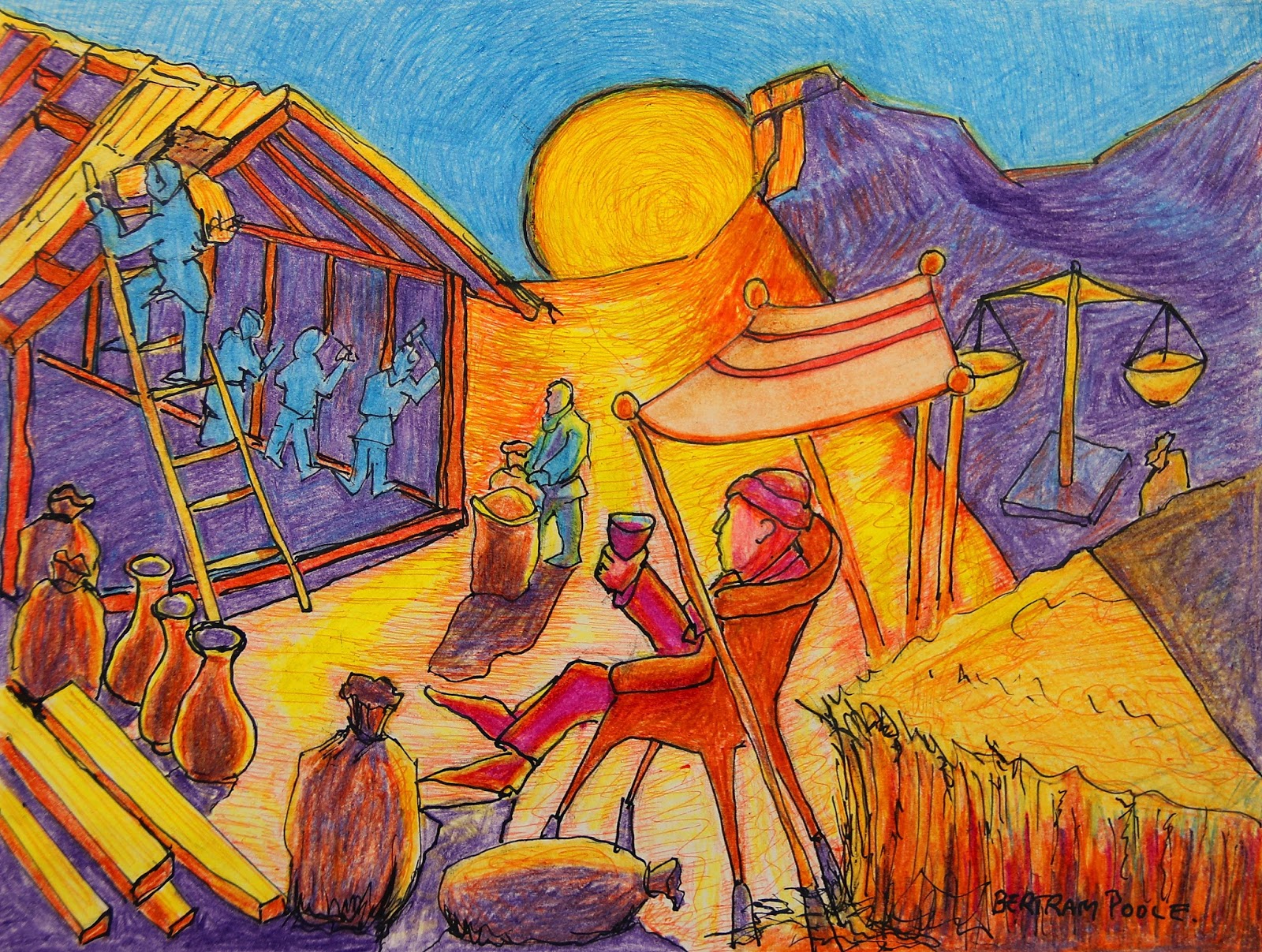
In this week’s Gospel text, a farmer responds to an abundant crop by building extra storage to house his bumper harvest. Isn’t this just what Joseph did in Genesis to avert the ravages of drought? Isn’t it sensible farming practice, given the vagaries of weather and seasons?
As is typical in parables, though, Jesus takes the story in a rather different direction. He highlights the selfishness of the farmer who is thinking only of his own needs and comfortable lifestyle. According to Jesus, such a person is a fool because they are ignoring the ways of God – which include caring for the needs of our neighbours and the poor.
We are immersed in a culture that every day encourages us to hold similar values to the farmer – to chill out, eat, drink and be merry – and ignore the needs of others. We’re tempted to think we are only just getting by – a mindset of scarcity - when in historical and global terms we are living in abundant luxury. The antidote to a greedy lifestyle is to live generously towards others – whether with our money, our time, our hospitality or our compassion. How may God be calling us to bring generous blessing to our neighbours? What will this cost us?
Posted: Thursday, August 1, 2019 by Peter Mallen Tags: Colossians 3:1-5, Colossians 3:12-17, Luke 12:13-21Praying Jesus style

If we go looking in the Gospel accounts of Jesus’ life, we find plenty of references to Jesus praying … for sick people, for enemies, for the people of Jerusalem, when seeking God’s guidance. Jesus prayed a lot!
Yet the way that Jesus prayed was apparently quite distinct from how other Jewish people of his era prayed, which the disciples noticed. So one day they asked Jesus to teach them how to pray in a similar way. Jesus’ response is what we know as the Lord’s Prayer. This short prayer provides a pattern for our praying – starting and ending with a focus on God and God’s character, simple, honest about ourselves, focusing on genuine needs, and learning to see the world and other people through God’s eyes. And doing all this in community (the language is all plural … ‘we’, ‘us’, ‘our’).
Jesus goes on to speak of the need to persevere in prayer and that God gives us good things in response to prayer. But we know that praying is not easy and often prayers seem to go unanswered. At such times, perhaps we are part of the answer, or prayer is designed to change our perspective. However we view prayer, it seems that it was important for Jesus and it was assumed that his followers would follow his example.
Posted: Friday, July 26, 2019 by Peter Mallen Tags: Luke 11:1-13Learning to sit at Jesus’ feet

The story from Luke’s Gospel about Martha and Mary is actually quite radical and revolutionary, although it hasn’t always been interpreted that way. Martha is sometimes viewed as the anxious and fussy host,
complaining that she has too much to do, but restricted to her rightful place in the kitchen. She is in fact fulfilling the important role of welcoming others to her home and providing hospitality. It may be a traditional role for women in her culture, but she is doing it well.
Mary by contrast is sometimes viewed as passively sitting at Jesus’ feet, looking down, and remaining demure and unobtrusive. In reality, Mary had crossed a significant boundary in sitting with the other male disciples. Jesus affirms her right to be there and more, the desirability of her being there, listening and learning about discipleship.
In its early years, Christianity was known as ‘The Way’ with Christians following the way of Jesus. In order to follow this way, all of us need to regard ourselves as disciples and choose to sit and learn the way from Jesus. What practices do you have in your life that facilitate your growth as a disciple?
Posted: Friday, July 19, 2019 by Peter Mallen Tags: Colossians 1:15-20, Luke 10:38-42The way to life

In this week’s Gospel reading, an expert in the Jewish Law tests Jesus with a question regarding how one might live according to God’s ways. His
response to Jesus is very traditional: Love God and love your neighbour. Wishing to draw boundaries around this demand, however, the lawyer asks ‘Who is my neighbour?’ Jesus responds by telling a famous parable …
Let me retell this parable … Suppose you are out walking one Sunday morning and get mugged and left half dead in the gutter. You can’t get up and they’ve stolen your mobile phone. You’re in desperate need of help. Two respectable looking people drive by – Christians perhaps on their way to church? – but neither stops to help. Both seem preoccupied with their own agenda and in way too much of a rush to notice you. Then along comes a tough looking African gang member. He stops and bends down – and in broken English – asks how you are. He then lifts you up and carries you two kilometres to the nearest hospital.
Jesus asks one final question: ‘Who acted like a neighbour?’ It turns out that being a neighbour is what counts – offering extravagant and costly love to a needy person, whoever they might be. Jesus then commands those hearing the parable – including ourselves – to go and do likewise – offering life-giving hospitality that breaks down and overcomes all barriers.
Posted: Friday, July 12, 2019 by Peter Mallen Tags: Luke 10:25-37God is doing a new thing
The theme for this year’s Synod meeting is taken from Isaiah 43:19 that reads:
I am about to do a new thing;
now it springs forth, do you not perceive it?
I will make a way in the wilderness
and rivers in the desert.

The message to the Israelite exiles living in Babylon was not to give up hope, for God still loved them and had not abandoned them. As is so often the case in the prophetic Scriptures, the task of the prophet was to change the conversation and use poetic imagination to paint a different story, one of new hope and new life for the nation.
What are the stories that we tell each other? Do we share our worries about the future of our congregation or even of the Uniting Church? Or do we look through the eyes of faith and imagine a vigorous and flourishing congregation that is a signpost to the world of an alternative way to live? God is the one who brings life, even in the wilderness, like a desert that blooms after rain.
Posted: Thursday, July 4, 2019 by Peter Mallen Tags: Isaiah 43:16-21, Psalm 126The joy and responsibility of freedom
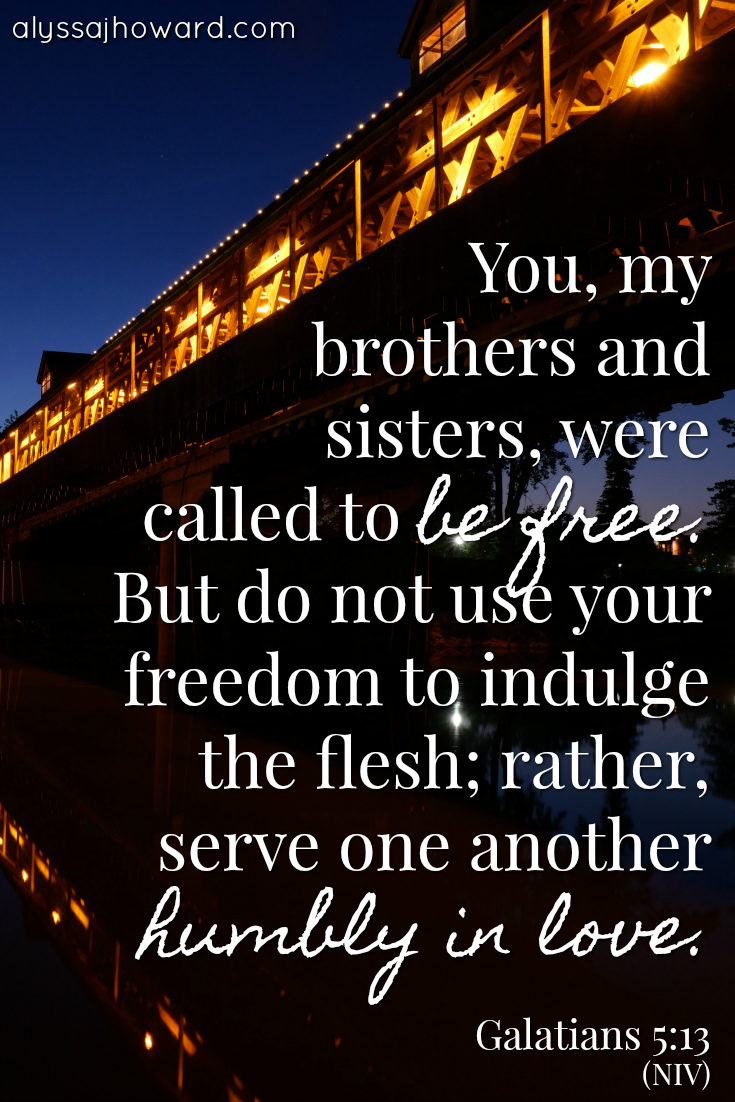
One of the readings set down for this week focuses our attention on freedom. The apostle Paul writes that we have been set free from a yoke of slavery imposed by the Jewish Law that stipulated tight regulations on
many aspects of life. But being set free from these restrictions is not a sign to indulge ourselves. Paradoxically, although the gospel sets us free, we are to live as though we are slaves to other believers, loving them as much as we love ourselves. Similarly in the reading from Luke’s Gospel, our freedom is to follow where Jesus leads us, without making excuses that we have other things that take higher priority.
This freedom to choose how we will spend the hours in our day and how we will interact with others is a blessing that we can easily take for granted. Talking to asylum seekers who are denied this freedom – often for years – makes me much more aware that it is a basic human right that needs to be treasured. Since we enjoy this sort of freedom, the question is how are we using it … to grow God’skingdom in our midst or to indulge our own desires?
Posted: Thursday, June 27, 2019 by Peter Mallen Tags: Galatians 5: 13-25, Galatians 5:1, Luke 9:51-62The Uniting Church in Australia celebrates its birthday

This week marks the 42nd anniversary of the formation of the Uniting Church in Australia. To celebrate the occasion we are meeting with our sisters and brothers from nearby Uniting Churches at Billanook College in Mooroolbark (located off Cardigan Road, download the
UCA 2019 Birthday Service at Billanook flyer and map
).
Leading up to the time of Union, there was optimism and hope that the coming together of three distinct church denominations might be the
start of a larger movement towards union. Hence the name chosen for this newly forming church was the Uniting Church, rather than the United Church as in some other countries. Sadly this vision has not
been realised in practice, although there remain good and close relationships with many denominations and indeed other faiths.
Through the last 42 years, the Uniting Church has attempted to walk faithfully and has been at the forefront of seeking reconciliation with
the First Peoples of Australia, of recognising the important place of women and lay people in ministry, and in the search for justice and welcome of all people including the LGTBQI+ community. There have been challenges, however, in other aspects of our life together. For instance, many Uniting Church congregations are ageing and have struggled to connect with younger people, and we are still grappling with what it means to be a truly cross cultural church.
Our hope for the future does not lie in our own resources or ingenuity, but rather in Jesus Christ who ‘gives life to the dead and brings into being what otherwise could not exist … and, who, in his own strange way constitutes, rules and renews … his Church’ (Basis of Union
paragraph 4). So our real challenge is to discern what God is already doing through Christ in our midst – and in the world – and to have the courage to follow.
What God is like

This Sunday is known as Trinity Sunday and provides us with an opportunity to ponder the nature and mystery of God. It is the only
day in the church calendar that is named for and celebrates a doctrine rather than an event in church history. It also harks back to the first few centuries of the Christian movement when there were fierce debates about the nature of Christ and, therefore, the nature of God.
The doctrine itself is reasonably simple, namely that the one and only God exists as three distinct persons, Father, Son and Holy Spirit. The reality that this doctrine points to is beyond our understanding, however, despite many creative attempts of trying to explain it.
At the risk of going too far, one implication we may draw from the doctrine of the Trinity is that God is community and values self-giving, loving relationships.
So relationship with God, with one another and with our neighbour lie at the heart of our faith.
Posted: Friday, June 14, 2019 by Peter Mallen Tags: John 15:26, John 16:12-15, Psalm 8, Romans 5:1-5How God is with us

Pentecost in many ways marks the end point of the story arc of Jesus that begins each year in Advent. This story includes the birth, baptism, ministry, death, resurrection and ascension of Jesus and culminates in Jesus pouring out the Spirit on the new church (Acts 2:33). But Pentecost also marks a new beginning point, enabling God’s purposes through Jesus to extend way beyond Galilee and Jerusalem out into the whole world - through the emerging Christian community. The Spirit will not only
guide the footsteps of this community but also be how God is present in and among and through them.
So we celebrate Pentecost as the birth of the Church, a movement that has shaped our world for nearly 2000 years, often for good and sometimes for the worse. An ever present question for us, then, is what is the Spirit calling us to today, in our place and time? How do we continue to build a movement that offers praise to God, generous kindness to our people and yet is outward looking and having the good will of our wider community (as in Acts 2:42-47)?
Posted: Friday, June 7, 2019 by Peter Mallen Tags: Acts 2, John 14:25-26, John 14:8-17A new beginning

For the first followers of Jesus, his ascension marked the beginning of a new venture – when they would have to work out their message and their approach to the world – without the direct presence of Jesus to lead them. The future was unknown but was in their hands now.
Likewise for the Israelite exiles living in Babylon in the book of Isaiah. As the years roll on they slowly lose hope that God will act to redeem them so they can return home to Jerusalem. As they wait, the prophet tells them to open their eyes to what God is about to do … something new, something unheard of …
And for the folk at Croydon, a new chapter begins with a refurbished building and new look worship space. What does the future look like from here? Perhaps there is wisdom to learn from the folk at Croydon North … a new space takes time to grow into … but offers all sorts of new possibilities. Let us all be listening to God as we explore new directions.
Posted: Friday, May 31, 2019 by Peter Mallen Tags: Acts 1:1-14, Isaiah 43:1-3a, Isaiah 43:10-11, Isaiah 43:18-21Living the Christian life

It often seems there is much to be fearful about. If we follow the stories presented to us in the media, we will be afraid of using Facebook, or afraid of catching the flu this winter or afraid about irreversible climate change. Perhaps we will even be afraid for the future of the church in our culture.
In this week’s reading from John’s Gospel, Jesus assures the disciples that they need not fear because he will not abandon them in the world but will come to them – through God’s Spirit – and bring them peace and love. This part of the Spirit’s role is like breathing in. The reading from Acts 16 describes another of the Spirit’s roles, directing the mission of the church, guiding our steps and giving us courage to speak about Jesus. This is the breathing out part.
If we want to live a healthy Christian life, then using this analogy, we need to practise both breathing in and breathing out, taking time to spend with God as well as serving and witnessing in the world. Which part do you need more of in your life?
Posted: Thursday, May 23, 2019 by Peter Mallen Tags: Acts 16:9-15, John 14: 25-27, John 14:18-21Reverberations of Easter

As I write this message, we are drawing towards the end of a hard fought and at times bitter Federal election campaign. It has highlighted again the divisions and barriers that we like to erect between different ‘tribes’.
It was not much different in Jesus’ day. While most Jews were united in their hatred of the occupying Romans and distrustful of their distant cousins, the Samaritans, there was considerable animosity between various Jewish political groups. In this contested space, Jesus offers an alternative way. Love one another. No ifs, no buts, no exceptions, no limits. Just love one another. Let that become the symbol to the waiting world of the new Christian community. And before we are tempted to make this too exclusive, God’s view of ‘one another’ is broader than we can imagine and includes those we feel sure are outside the sphere of God’s blessing.
Love one another. So simple to say and yet so difficult to embody and live out. What might it take for our neighbours to remark, how those Christians love one another?
Posted: Friday, May 17, 2019 by Peter Mallen Tags: Acts 11:1-18, John 13: 34-35, John 13:12-17Mothers and shepherds
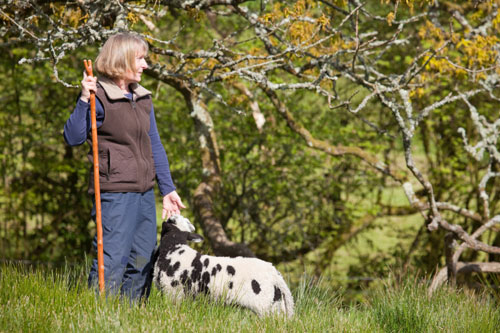
I’ve been thinking about mothers in the lead up to Mother’s Day. My own mother … the sacrifices and struggles of the late mother of Bill Shorten whose story has been in the news this week … asylum seeker mothers locked up in detention … new celebrity mother Meghan, Duchess of Sussex … What these and other significant women in our lives teach us is that love involves gentleness, toughness, fierce protection, sacrifice, much kindness and patience, and the desire to bless those in our care.
These are also characteristics that apply to Jesus the good shepherd, as described in John chapter 10. The shepherd knows his sheep intimately, calls them by name and leads them to what is needed for life, abundant life. The shepherd will do whatever is necessary to keep the sheep safe, even laying down his own life.
What might we learn from the example of mothers (and significant others) and that of the good shepherd in terms of how we bless others and what we are prepared to do to help them reach their full potential?
Posted: Friday, May 10, 2019 by Peter Mallen Tags: Acts 9:36-43, John 10:1-30Life after Jesus: new marching orders

The diverse Gospel stories about the resurrection of Jesus have several common elements. These include the transformed appearance of Jesus, the amazement of the disciples and a call to carry on the mission of Jesus after he has gone (see for instance Luke 24:46-48, Acts 1:8). This call to mission was the impetus that started the church, as Jesus’ disciples – both women and men - shared his message and acted as witnesses to Jesus.
The call to witness has been handed on like a relay baton from generation to generation of Christians and involves both words and actions, both speaking the good news and living it out. In the Uniting Church we are generally much more comfortable with the second approach, namely showing the love of God in how we treat and interact with others. The challenge for us is to overcome our reticence and fears and learn how to share the good news of Jesus respectfully in words. However inconvenient, it is part of our call to be faithful disciples. Will we dare to take up this challenge?
Posted: Friday, May 3, 2019 by Peter Mallen Tags: Acts 9:1-19, Luke 24:36-48, Psalm 30Surprising new life

The traditional Easter greeting is ‘Christ is risen!’ to which the traditional response is ‘He is risen indeed!’. It is also traditional at Easter to sing joyful songs with many alleluias, some of which we will be singing this Sunday. Yet the Gospel accounts of the resurrection paint a very different picture. None of the disciples were singing, none were joyful. Instead they were trying to keep a low profile and had locked the doors.
It was the women who dared to go to the tomb to anoint Jesus’ body with spices, a traditional Jewish custom for the dead. We are told that the stone sealing the tomb had been rolled back and that the women saw a vision of angels. They do not rejoice at the news but rather are terrified and flee. The male disciples struggle to understand their message that Jesus has risen.
Perhaps we are so used to hearing this story that it no longer surprises us or excites us. But the message of Easter is nothing if not astounding. It is God’s ‘yes’ to the world’s ‘no’. May this story of hope and transformation continue to disturb and surprise us.
Posted: Saturday, April 20, 2019 by Peter Mallen Tags: 1 Cor 15:1-20, Luke 24:1-12, Psalm 118:1Good Friday reflection

On Good Friday we hear the Gospel passion narrative as it tells the story of Jesus’ rejection, suffering, death and burial. This is a powerful story that provides us with the enduring symbol of Christian faith, namely the cross. It’s a story that’s told from the perspective of the followers of Jesus as they watch the impossible unfold before their eyes – as the Messiah suffers and dies.
The story never explains why Jesus had to die or exactly what his death accomplished. Initial answers to these questions are supplied by the apostle Paul and later by generations of Christian theologians and hymn writers. These sources provide various explanations.
Western Christianity (as handed down to us through the Catholic Church) places the events of Good Friday at the heart of our faith, with the death of Jesus on the cross seen as the atoning sacrifice for human sin, redeeming us from sin and making possible forgiveness and restored relationship with God. Within this legal framework, the day may well be called ‘Good’ Friday or ‘God’s’ Friday as God deals decisively with the problem of sin. An appropriate response might be thankfulness.
Eastern Christianity (as handed down through the Orthodox Church) has quite a different perspective. The basic human problem is not sin, but rather death that came into the world through Adam and Eve. Through his voluntary submission to the cross – and especially through the resurrection – Jesus overcame the power of death, thus making possible the glorification of humanity, its restoration to the image of God. Good Friday – and Easter Sunday – thus demonstrate the power and victory of God. An appropriate response might be worship.
Progressive Christianity has a different take again. As a prophet, Jesus continually challenged the dominant ruling powers and their injustices (both the religious leadership of Israel and also the occupying power of the Roman Empire). In the way of human society, these powers fought back and did what forces of domination do – silence and eliminate the perceived threat. Jesus’ death was the inevitable result of the clash between power and politics on the one hand and compassion and justice on the other hand. An appropriate response might be to take up the fight for justice.
What are we to make of the story of Good Friday? How do we find our place in the story? Are we among the silent members of the crowd who out of fear say and do nothing when Jesus is condemned? Are we like the women who weep for Jesus as a good and innocent person put to death? Are we among the cynical people who mock Jesus for not delivering what he promised, a new society that reflects God’s ways? Or are we fallible followers of Jesus who want to follow but who deep down prefer comfort, respect and taking care of our own needs? Or perhaps do we sometimes feel like Jesus, abandoned by our friends and even by God?
Good Friday offers us a powerful and multivalent story that is open to multiple layers of meaning. The invitation is to sit with the story a while, recognizing that while we are part of broken humanity that is capable of great evil, we are also part of Christ’s family committed to walking in the compassionate and radical ways of Jesus, wherever that road may take us.
Posted: Thursday, April 18, 2019 by Peter Mallen Tags: Luke 22:66 - Luke 23:56Jesus comes to Jerusalem
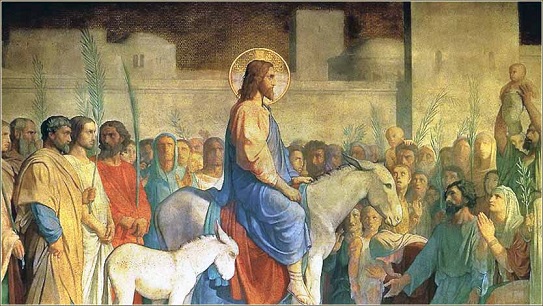
Palm Sunday is the day on which we remember Jesus entering Jerusalem riding on a donkey, while the crowds waved palm branches and sang songs of praise. People were not quite sure what to make of Jesus – was he a radical prophet? A rival king to Caesar? Or simply a compassionate healer and teacher? How could his small band of followers really think that they could make a difference in the cold hard world of power and authority?
What do we see and hear in this story? Do we too place fairly rigid expectations around Jesus or do we let him speak his life transforming words to us? These questions are all valid as we contemplate the place of Jesus and our faith in the world today.
Posted: Thursday, April 11, 2019 by Peter Mallen Tags: Luke 19:28-40, Philippians 2:5-11, Zechariah 9:9Extravagant faith

During this last week, the Federal Treasurer has handed down the annual Budget for Australia. The headline message is that after several years of careful and prudent financial management, the country will soon, hopefully, balance its books. It’s the sort of Budget that might have appealed to Judas, who was apparently in charge of finances for the disciples.
Then along comes Mary, sister of Martha and Lazarus, and pours a large flask of very expensive perfume all over Jesus’ feet. Here is extravagant faith and deep love in action. Judas is outraged at the waste while Jesus praises her action as a preparation for his burial. I wonder whether we more naturally embrace a mindset of scarcity or a mindset of abundance. Do we tend to ration our resources or are we willing to (at least sometimes) give extravagantly? Last week’s story of the prodigal son and this week’s story about Mary both point towards the extravagance of God’s kingdom. It also points ahead to the costly and extravagant gift of Jesus at Easter.
Posted: Wednesday, April 3, 2019 by Peter Mallen Tags: John 12:1-8, Philippians 3:4b-14The compassion and courage of Jesus

As we continue our journey through Lent, we hear this week of Jesus’ determination to continue his ministry and continue on the path towards Jerusalem despite growing threats against him. Jesus likens King Herod to a fox, a cunning and often maliciously cruel animal that kills for sport. Jesus will not be put off course by Herod’s – or anyone else’s – threats, as he is intent on following God’s agenda. Hence he must be on his way and must continue on to Jerusalem where a prophet’s fate – death – likely awaits him.
Jesus also expresses his – and God’s – compassion for Jerusalem. He wants to gather the people of Jerusalem as a mother hen gathers her chicks under her wings – a tender and compassionate image that reflects God’s love for the city and her people. Jesus’ attitude and actions can teach us important lessons about courage and compassion. Will we continue to follow God’s agenda even when there is high personal cost involved? And will we continue to offer God’s grace and compassion to people, even when they threaten or reject us?
Posted: Thursday, March 14, 2019 by Peter Mallen Tags: Luke 13:31-35, Psalm 27Who sets our agenda?

The journey of Lent always starts with the account of Jesus being tempted in the wilderness. This feels slightly odd, as the incident occurs before the start of Jesus’ ministry and not as he turns his face towards Jerusalem and the journey to the cross. Yet in other ways, the temptations or testing described are typical for what Jesus faced throughout his ministry – desires to meet his own physical needs, to seek after power or to be popular.
As Jesus follows the path to the cross he will disappoint many, anger others and be rejected and humiliated. He will also demonstrate clearly that he is following God’s agenda rather than his own. I wonder who sets our agenda? Is it the expectations of others, our fears or our longings, or the quiet voice of God’s Spirit? What will give us the strength and courage to walk in the footsteps of Jesus and follow God’s agenda?
Posted: Thursday, March 7, 2019 by Peter Mallen Tags: Luke 4:1-13, Psalm 91Surprising encounters with God
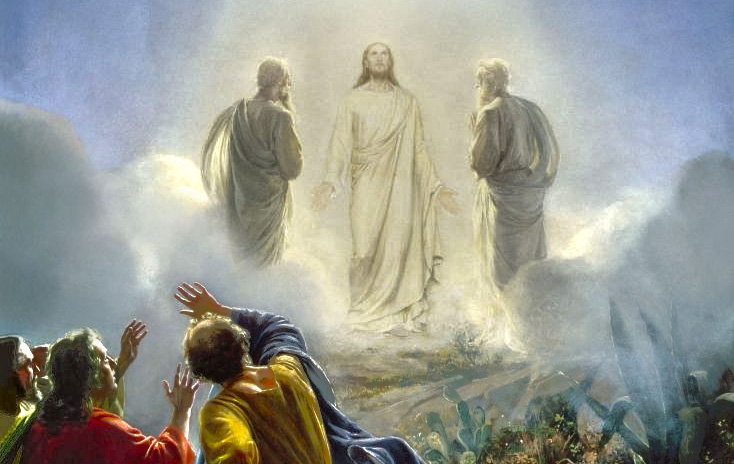
This week’s Gospel passage is mysterious – not that it uses big or strange words – but because it describes an encounter with God that is foreign to most of our common experience. Jesus climbs up a mountain to pray, which is nothing unusual for Jesus. On this particular occasion he takes three of the ‘senior’ disciples with him, which is slightly more unusual. But while he is praying, some very unusual things happen: Jesus’ appearance becomes dazzling, he speaks with two people that the disciples somehow identify as Moses and Elijah, and a voice speaks from a cloud about Jesus.
Welcome to Transfiguration Sunday, the day when we hear this mysterious and profound story about Jesus and are reminded about its significance, yet often go away scratching our heads and wondering what it’s really all about. This is a story that invites us to pull back the veil that usually prevents us from seeing the spiritual dimension of the world, and asks us to journey with Jesus to a thin place where new insights will be revealed. What will we see? What will we hear? And what difference will it make as a result?
Posted: Friday, March 1, 2019 by Peter Mallen Tags: Exodus 34:29-35, Luke 9:28-36Jesus’ third way for communities

While much of our culture (and especially our advertising) focuses on the individual, as a society we can also be quite tribal. This can be positive – as when people band together in times of natural disasters – or can be negative – as when we pick on one group (e.g. African youth). Jesus offers a third way, which is to treat everyone as we would like to be treated. This is a blueprint for a new community, a new humanity where there is no distinction any more between people, or between tribes, or even between friends and enemies.
Jesus’ call to love our enemies, though, seems a step too far… enemies are the people who hate you, say mean things about you, abuse you or take what is rightfully yours. Our natural response to enemies is either to want to fight them or flee from them. But Jesus commands that we do good to our enemies, pray for them and generously share with them. Sound difficult? You bet! It’s only possible with the transforming work of God’s Spirit in our lives to give us the desire and ability to live this way. It’s nothing less than learning to embody and live out the very character of God, day by day.
Posted: Wednesday, February 20, 2019 by Peter Mallen Tags: Luke 6:27-38, Psalm 37:1-11God’s upside down kingdom
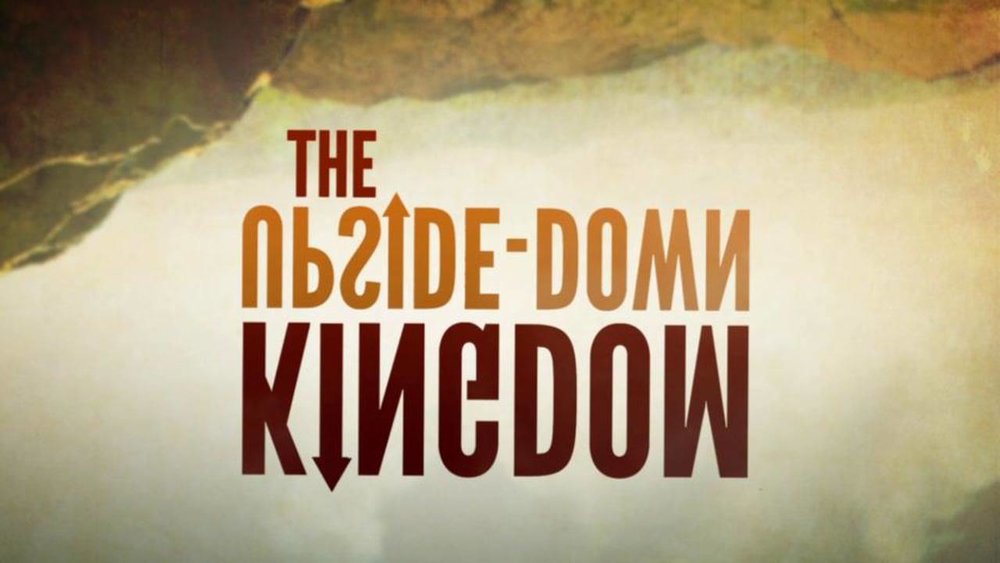
Sometimes it’s good not to take Jesus too seriously, especially when Jesus speaks about matters that impact directly on our lifestyle. Many of us have experience with this approach. For instance, we are adept at ignoring much of Jesus’ teaching about money and power, for otherwise it would require us to do a major rethink about our priorities and practices.
This week’s Gospel reading is a case in point. It’s Luke’s equivalent to the Sermon on the Mount. As in that famous sermon it begins with a series of blessings for unexpected people – the poor, the hungry, those who weep and those who are rejected for associating with Jesus. But Jesus then ups the ante by also pronouncing woe on the rich, the well fed, those who laugh about life and those who are praised. These are startling and provocative words. Is Jesus really advocating the benefits of poverty, hunger and mourning over the alternatives? Yet these recipients of blessing reflect Jesus’ wider ministry and his interactions with both rich and poor. They also reflect the character of the God revealed in the OT prophets, who seems to have a distinct bias towards the needs of the poor. Where do we stand in relation to Jesus’ upside down kingdom? What might need to change if we take Jesus’ words seriously?
Posted: Wednesday, February 13, 2019 by Peter Mallen Tags: Jeremiah 17:5-10, Luke 6:17-26Jesus calls us to discipleship

Sometimes, completely out of the blue, our lives can be transformed in an instant. Something similar happened to Simon Peter one day as he was quietly minding his own business mending his fishing nets. Jesus comes along and wants to use his boat as a portable pulpit. When Jesus has finished teaching, he invites Peter to go fishing, and that’s when the unexpected happens as Peter hauls in an extraordinarily large catch of fish.
This is a turning point moment, a God moment. Peter recognizes the potential of this moment and like Moses and Isaiah and many others through history, suddenly recognizes his own shortcomings. But Jesus sees other qualities in Peter and invites Peter to join his ministry of bringing life to people. Peter overcomes his fears and hesitations and follows Jesus (see Luke 5:1-11).
We too are invited afresh each day whether we will choose to follow Jesus, putting aside our fears and shortcomings, and listening instead to the quiet voice inviting us to join with Jesus in bringing life to others.
Posted: Friday, February 8, 2019 by Peter Mallen Tags: Isaiah 6:1-8, Luke 5:1-11How might we reject Jesus?

At times, the words and approach of Jesus are truly extraordinary. We marvel at his compassion or gentleness or inclusiveness. But at other times, Jesus seems to delight in stirring up controversy or confrontation … as in this week’s reading from Luke’s Gospel, which tells the second part of his visit to his hometown of Nazareth (Luke 4:21-30). In language of today, Jesus deliberately pokes the bear and the bear gets angry!
Initially, the townsfolk are pleasantly surprised by Jesus’ gracious words, but this goodwill soon evaporates as Jesus points out to them that God’s grace extends well beyond their limited perspective and even embraces traditional enemies. While all of us are quick to embrace God’s blessing in our own lives, we may find it harder to accept God blessing people we regard as undeserving or unworthy. God’s grace can sometimes be so offensive to us. But that’s when we need to remember that every blessing we receive is a gift … and be thankful.
Posted: Thursday, January 31, 2019 by Peter Mallen Tags: 1 Corinthians 13:1-13, Luke 4:21-30The Jesus manifesto

This week we are introduced to the public ministry of Jesus in a dramatic scene in Luke’s Gospel as Jesus returns to his hometown of Nazareth. He has been named as Messiah and Saviour and Lord at his birth, but now that Jesus has grown up, what will he say? What will he do?
Jesus reads a favourite passage from the prophet Isaiah that speaks of a Spirit anointed figure who will announce good news, bring freedom to captives, healing to the blind and usher in the time of God’s favour. After a long pregnant pause, Jesus claims to be this figure.
For Luke, this is the Jesus manifesto, setting out who Jesus is and what will be the priorities and shape of his ministry. A key question for us is – is this manifesto just about Jesus and his ministry or does it also apply to us as followers of Jesus? If so, how is it shaping our ministry in 2019?
Posted: Friday, January 25, 2019 by Peter Mallen Tags: 1 Corinthians 12:12-31, Luke 4:14-21Learning from our history

As we prepare to celebrate Australia Day on 26th January, there is the usual discussion in the media about whether this is an appropriate day to honour our nation. Many Australians – including most of our politicians – don’t question the validity of observing this day. Yet even as we celebrate our achievements, including the mostly peaceful multicultural society and freedoms we take for granted, for indigenous Australians this is a day of mourning, a day that marks the invasion of Australia by European colonisers.
At the suggestion as the Uniting Church Assembly, we will mark this Sunday as a day of lament for our church’s complicit involvement and support of the colonisation project that continues even today. We will choose to remember our history – including what is shameful and morally repugnant – even as we commit ourselves to work with our indigenous brothers and sisters in their search for justice and healing.
Posted: Friday, January 18, 2019 by Peter Mallen Tags: James 2:14-26, Micah 6:8The baptism of Jesus – blessing and challenge
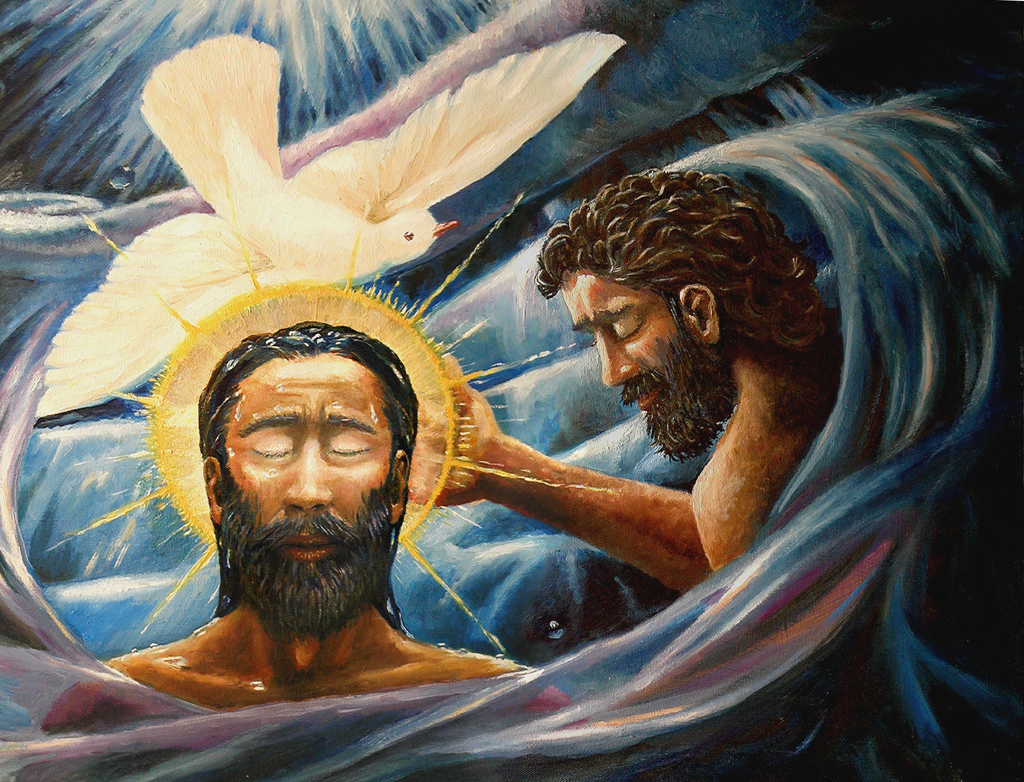
This week’s Gospel story is about beginnings … so it seems appropriate to be reading it at the beginning of a new year. The baptism of Jesus marks the beginning point in Jesus’ ministry, while our baptism marks a new beginning in our relationship with God. For Jesus – and for ourselves – baptism is an important signpost in our journey of faith.
Jesus’ baptism has three significant elements – a voice affirms him as the beloved Son, God’s Spirit equips and empowers him for ministry and the same Spirit leads him directly into ministry in his context. It is similar for us. Baptism reminds us that we too are God’s beloved children, are equipped and empowered for ministry by God’s Spirit who also leads us into ministry in the world. May we remember our baptism and be thankful.
Posted: Friday, January 11, 2019 by Peter Mallen Tags: Isaiah 43:1-7, Luke 3:15-22Looking backwards and looking forwards
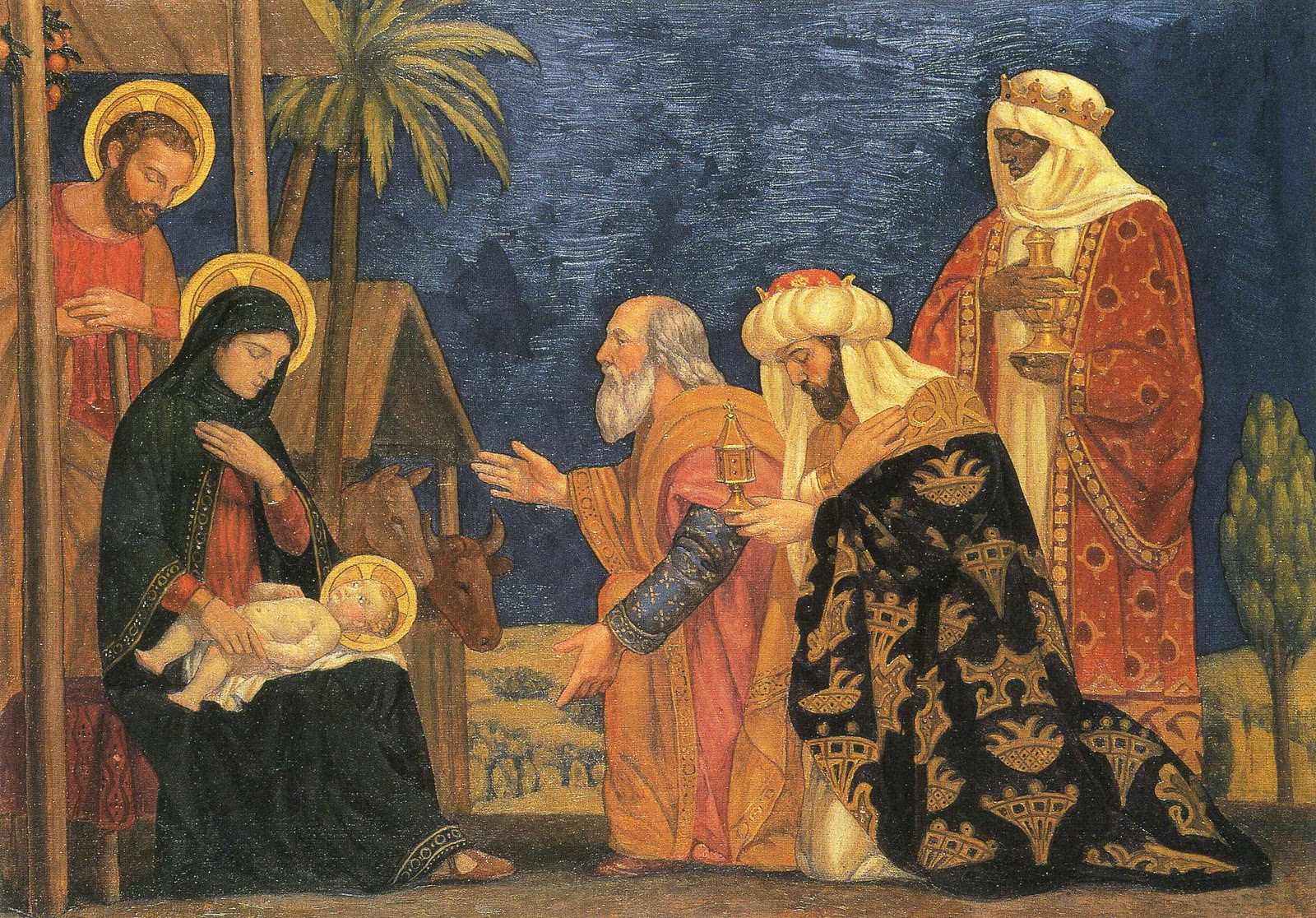
This week we hear the ‘adults only’ version of the Christmas story from the Gospel of Matthew with its layers of fear, deception and violence, mixed with glimpses of great joy and hope. This Sunday (6 January) marks the end of the Christmas season and the beginning of the season we call Epiphany – which means to reveal or make known. So over the next few weeks we will be exploring what is revealed about Jesus and what our response might be.
This Sunday also marks the last service in the current arrangement of the worship space. So we will be taking some time to both look backwards and give thanks for the past, as well as looking forwards to God’s promise of doing new things in our midst in the future. As we reflect on Matthew’s alternative Christmas story, may we be encouraged by God’s grace and faithfulness.
Posted: Thursday, January 3, 2019 by Peter Mallen Tags: Matthew 2:1-23Welcome to 2019

As we take some time to reflect on the past year and ponder what lies ahead for 2019, we look out into an uncertain world that is trying to cope with unstable leaders, apathy regarding millions of refugees and displaced people, the growing threat of climate change and the poor image of Christianity in our secular culture.
There are no easy answers, and yet our faith suggests that God remains faithful and is always doing a new thing. May you find hope and peace and joy in the year ahead that lifts you beyond anxiety and division and other concerns pushed by our political leaders. May Christ continue to inspire you to love and compassion and may God’s Spirit fill you with energy and courage to seek justice and peace.
Posted: Tuesday, January 1, 2019 by Peter Mallen Tags:Christmas Day 2018
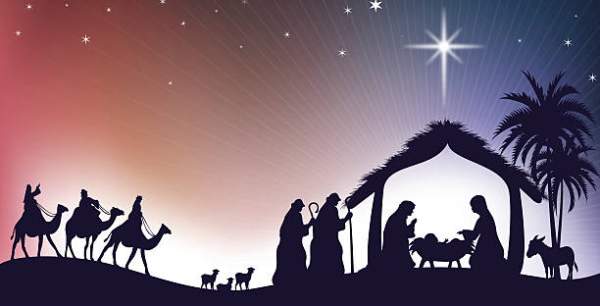
This image of the Christmas nativity is typical – and unrealistic. Palm trees don’t grow near Bethlehem due to its high elevation close to Jerusalem. The wooden shelter shown is remote from any village – yet more likely was a cave cut into a hillside adjacent to a village. And the radiance beaming out from baby Jesus could light up the entire night sky – yet only a few shepherds took any notice.
The challenge of Christmas is that it is been so buried beneath layers of cultural wrapping that it’s hard to get close to the original story. Luke’s version – as captured in this nativity scene – highlights the angels’ message to the shepherds, which is probably a parody on announcements of Caesar’s birth. In Matthew’s version, again there is irony as it is astrologers from the pagan East who recognise the birth of a king rather than the local Jewish leaders. Who is Jesus for you? A misunderstood Palestinian peasant? A Jewish prophet and wise teacher? Or is he the promised Messiah and Saviour of the world? How will you respond to this innocent and vulnerable baby?
Posted: Monday, December 24, 2018 by Peter Mallen Tags: Isaiah 52: 7–10, Luke 2: 8–20How are we to understand Mary?
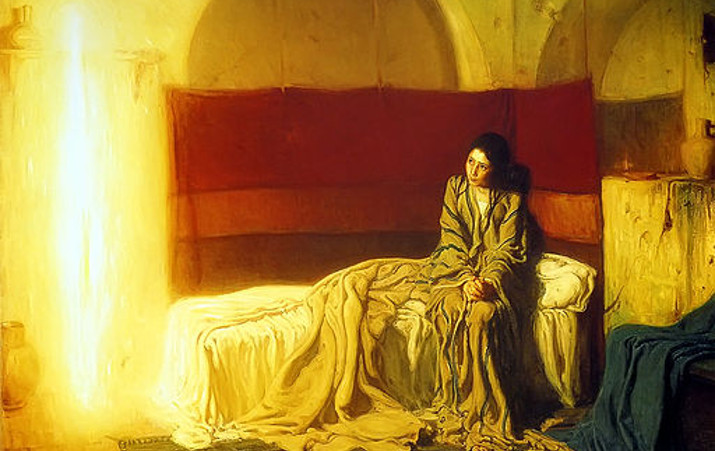
In this fourth week of Advent, the focus falls on Mary, the mother of Jesus, and her extraordinary story. She first appears as the recipient of startling news about a child she will bear. She is then the one who gives birth to Jesus and so is central to the Christmas story. How are we to understand Mary?
In some traditions of the church, Mary is revered as the God-bearer (Theotokos) or as the saint who intercedes with Jesus on behalf of humanity. Yet in the Protestant tradition we are cautious about giving her a special ongoing place in our practice of faith. Instead we tend to quickly move on from Christmas and Mary disappears from our view.
We might pause this week to reflect on Mary’s remarkable and unique journey of faith. She has several roles including as a forthright prophet (as she speaks the Magnificat), as a nurturer and teacher (of Jesus) and later as a disciple (as part of the early church in Acts 1). What might we learn from Mary about our own journey of discipleship?
Posted: Tuesday, December 18, 2018 by Peter Mallen Tags: Luke 1:26-45, Luke 1:47-55Subversive joy

The third Sunday in Advent is called Gaudete or Joy Sunday, when we traditionally light the pink or rose coloured candle. Looking around at the world – or looking around our own neighbourhood – it often seems that joy is in short supply.
The Gospel reading for this week – the preaching of John the Baptist in Luke 3 – seems an odd choice for Joy Sunday. It is a thundering message on the need for repentance with a strong link to justice and just living. Those who fail to share their resources, or who game the system for their own benefit, or who bully others risk missing out on God’s kingdom.
So where is joy to be found? At a community lunch held this week at Croydon North for people that our society regards as nobodies. In the eyes of an asylum seeker who is finally granted a visa ensuring their safety and freedom. In helping the rural poor make a fresh start. God is at work in the world bringing little flashes of joy. Open your eyes and you might be surprised by what you see.
Posted: Wednesday, December 12, 2018 by Peter Mallen Tags:Peace in the world?

On this second Sunday of Advent we focus on the coming of peace – and the Prince of Peace - into the world. The trouble is that when we look around the world we see suspicion between nations and their leaders, fighting within nations, violence in the home … and we are left scratching our heads, wondering where is God?Our Bible readings this week speak of God sending a messenger to prepare the way of the Lord (Malachi 3:1, Luke 3:4). According to Luke, this messenger is John the Baptist, who calls us to walk the path of peace by seeking justice.Our problem is that we don’t much like or listen to prophets like John –because they usually ask us to change (the biblical term is repentance) – and this takes effort, energy and humility. Further, if there is to be peace on earth,then it requires us to be messengers of God’s peace and agents of reconciliation between people. And this is a challenging path to walk
Posted: Wednesday, December 5, 2018 by Peter Mallen Tags: Luke 3:1-6, Malachi 3:1-4Waiting in the midst of struggle

Welcome to the season of Advent, a season of waiting, watching and hoping.
On this first Sunday we light the candle of hope. We remember the many problems in the world that made it necessary for God to send the Messiah among us. We also remember the warnings and promise of Jesus: warnings not to get overly alarmed or worried at the state of the world – and the promise that the kingdom of God is near. We are to look for Jesus in the midst of our struggles.
For the next two Sundays we are also encouraged to bring gifts for others to place under the empty Christmas tree –signs of hope and love.
Posted: Saturday, December 1, 2018 by Peter Mallen Tags: Luke 21:25-36Christ the King Sunday - 2018
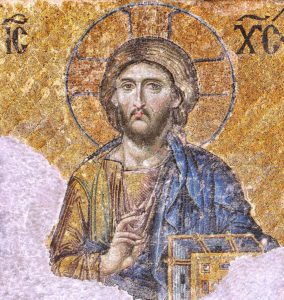
This Sunday is called Christ the King Sunday. It is a relatively recent addition to the lectionary calendar, only added in 1994. Christians believe that Jesus is the long awaited Messiah or Christ in Greek, which translates as Anointed One – or King – in English. In some church traditions, this day marks the dominion of Christ over all creation (as in mosaic pictured). In other traditions the day looks forward to the end of time when the reign of Christ will be fully established.
In our Uniting Church tradition, this day offers the opportunity to reflect on how Jesus overturned the usual concepts of power and leadership. Rather than following the way of violence, Jesus became vulnerable. Rather than exerting strength, Jesus modelled the way of service. Rather than seeking power over others, Jesus followed the way of peace. May we learn afresh what it means to walk in the footsteps of Jesus the King.
Posted: Wednesday, November 21, 2018 by Peter Mallen Tags: John 18:33-37Living in anxious times – but trusting in God
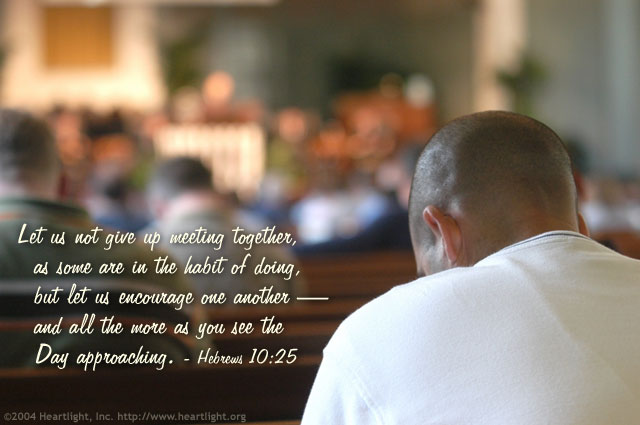
Much in our world can make us anxious or afraid, whether terror attacks in Bourke Street or our changing climate or a medical diagnosis. Our media and our politicians seem to delight to stoke the flame of our anxiety. It is tempting at times, therefore, to withdraw into ourselves or to live in fear.
Jesus recognised this danger and taught his disciples neither to trust in temporal things (be they wealth or property) nor to be worried by events (whether wars, famine or natural disasters). He taught instead
to keep on trusting in God. Likewise the writer of the letter to the Hebrews exhorts us to keep meeting together and to provoke one another to love and good deeds.
May we all hold on to Jesus’ promise to be with us always, to the very end of the age (Matt 28:20).
Remembrance Sunday 2018

Today our worship will be led by Chris Waddell, who is Chaplain at Melba College.
Today is also the day that we remember the ending of hostilities in World War I, plus many other conflicts since. It is right to remember those who gave their lives in these conflicts – on all sides – including the many innocent civilians and those left behind to struggle on with life. But as the people of God, we come together to worship the God of peace and to remember that war and violence are not the only way. Indeed, God’s son, Jesus Christ, has shown us a better alternative, which is the way to true peace.
Finally a reminder that Advent studies begin next week with one group meeting here at Croydon UC at 10 am on Tuesday and another group at Croydon North UC at 10 am on Friday. You are welcome to join either group, even if you haven’t officially signed up.
Posted: Friday, November 9, 2018 by Peter Mallen Tags:4 November 2018

Today we are focusing on a message that lies at the heart of both the Jewish and Christian faiths, namely the central importance of loving
God whole-heartedly and loving our neighbour as ourself. While we are probably all familiar with these words, the great challenge is in living them out in a consistent and committed manner. As today is the closest Sunday to All Saints Day, we will also have the opportunity during the service to remember those people who have inspired us in our faith but who are no longer with us.
28 October
This morning we continue to reflect on the story of Job, as God finally answers Job’s questions – but not in the way that Job expected or
hoped for. God helps Job change his perspective and expand his thinking. The Gospel reading provides an interesting complement as
Jesus describes what true greatness looks like, namely serving others. In the life of the Church – as well as in the life of the nation – there are times to pause and remember and seek forgiveness for past wrongs. Today and tomorrow are such days. So this morning during our prayers – and tomorrow during a national apology from the Prime Minister – we will be praying for survivors of institutionalised child sexual abuse.
[Download not found]
